
13 Ways to Quickly Improve Your Academic Essay Writing Skills
#scribendiinc
Written by Scribendi
Anyone can learn to produce an academic essay if they begin with a few basic essay-writing rules.
An academic essay must be based upon a solid but debatable thesis, supported by relevant and credible evidence, and closed with a succinct and thorough conclusion.
By adhering to the best way to write an essay, you can create valuable, persuasive papers even when you're under a time crunch!
What Makes a Good Essay?
As previously noted, the foundation of any good academic essay is its thesis statement.
Do not confuse your thesis with your opening sentence. There are many good ways to start an essay , but few essays immediately present their main ideas.
After you draft your thesis, you can begin to develop your essay around it. This development will include the main supporting points of your essay, which will scaffold its main body.
Essays also typically include a relevant and compelling introduction and conclusion.
Learn How to Write a Great Thesis Statement .

Understanding How to Write a Good Essay
When writing an academic essay, you must take a number of qualities and characteristics into careful consideration. Focus, development, unity, coherence, and correctness all play critical roles when it comes to distinguishing an exceptional essay from one that is less than perfect.
The following essay-writing tips can help writers organize, format, and support their essays in ways that fit their intended purpose and optimize their overall persuasiveness. Here are 13 essay tips for developing and writing your next academic paper.
1. Know What You Are Going to Write About Before You Start Writing
While untrained writers might just sit down and start typing, educated and experienced writers know that there are many steps to writing an essay.
In short, you should know what you want to say before you type a single word. The easiest way to narrow down a thesis and create a proper argument is to make a basic outline before you begin composing your essay.
Your outline should consist of rough notes that sketch out your introduction (including your thesis), the body of your essay (which should include separate paragraphs that present your main supporting points with plenty of evidence and examples), and your conclusion (which ties everything together and connects the argument back to your thesis).
2. Acquire a Solid Understanding of Basic Grammar, Punctuation, and Style
Before getting into more refined essay-writing techniques, you must have a solid grasp of grammar, punctuation, and style. Without these writing fundamentals, it will be difficult to communicate your ideas effectively and ensure that they are taken seriously.
Grammar basics include subject and verb agreement, correct article and pronoun use, and well-formed sentence structures. Make sure you know the proper uses for the most common forms of punctuation. Be mindful of your comma usage and know when a period is needed.
Finally, voice is tremendously important in academic essay writing. Employ language that is as concise as possible. Avoid transition words that don't add anything to the sentence and unnecessary wordiness that detracts from your argument.
Furthermore, use the active voice instead of the passive whenever possible (e.g., "this study found" instead of "it was found by this study"). This will make your essay's tone clear and direct.
3. Use the Right Vocabulary and Know What the Words You Are Using Actually Mean
How you use language is important, especially in academic essay writing. When writing an academic essay, remember that you are persuading others that you are an expert who argues intelligently about your topic.
Using big words just to sound smart often results in the opposite effect—it is easy to detect when someone is overcompensating in their writing.
If you aren't sure of the exact meaning of a word, you risk using it incorrectly. There's no shame in checking, and it might save you from an embarrassing word misuse later!
Using obscure language can also detract from the clarity of your argument—you should consider this before pulling out a thesaurus to change a perfectly appropriate word to something completely different.
4. Understand the Argument and Critically Analyze the Evidence
While writing a good essay, your main argument should always be at the front of your mind. While it's tempting to go off on a tangent about an interesting side note, doing so makes your writing less concise.
Always question the evidence you include in your essay; ask yourself, "Does this directly support my thesis?" If the answer is "no," then that evidence should probably be excluded.
When you are evaluating evidence, be critical and thorough. You want to use the strongest research to back up your thesis. It is not enough to simply present evidence in support of an argument. A good writer must also explain why the evidence is relevant and supportive.
Everything you include should clearly connect to your topic and argument.

5. Know How to Write a Conclusion That Supports Your Research
One of the most overlooked steps to writing an essay is the conclusion. Your conclusion ties all your research together and proves your thesis. It should not be a restatement of your introduction or a copy-and-paste of your thesis.
A strong conclusion briefly outlines the key evidence discussed in the body of an essay and directly ties it to the thesis to show how the evidence proves or disproves the main argument of your research.
Countless great essays have been written only to be derailed by vague, weakly worded conclusions. Don't let your next essay become one of those.
6. Build a Solid Thesis to Support Your Arguments
A thesis is the main pillar of an essay. By selecting a specific thesis, you'll be able to develop arguments to support your central opinion. Consider writing about a unique experience or your own particular view of a topic .
Your thesis should be clear and logical, but it should also be debatable. Otherwise, it might be difficult to support it with compelling arguments.
7. Develop an Interesting Opening Paragraph to Hook In Readers from the Get-Go
No matter how you begin your essay, you must strive to capture the reader's interest immediately. If your opening paragraph doesn't catch the eye and engage the brain, any attempt at persuasion may end before the essay even starts.
The beginning of your essay is crucial for setting the stage for your thesis.
8. Always Remember to Edit and Proofread Your Essay
Any decent writer will tell you that writing is really rewriting. A good academic essay will inevitably go through multiple drafts as it slowly takes shape. When you arrive at a final draft, you must make sure that it is as close to perfect as possible.
This means subjecting your essay to close and comprehensive editing and proofreading processes. In other words, you must read your paper as many times as necessary to eliminate all grammar/punctuation mistakes and typos.
It is helpful to have a third party review your work. Consider consulting a peer or professional editing service. Keep in mind that professional editors are able to help you identify underdeveloped arguments and unnecessarily wordy language, and provide other feedback.
Get Critical Feedback on Your Writing
Hire an expert academic editor , or get a free sample, 9. when developing your essay's main body, build strong and relevant arguments.
Every sentence in the main body of your paper should explain and support your thesis. When deciding how much evidence to include in an academic essay, a good guideline is to include at least three main supporting arguments.
Those main supporting arguments, in turn, require support in the form of relevant facts, figures, examples, analogies, and observations.
You will need to engage in appropriate research to accomplish this. To organize your research efforts, you may want to develop a list of good research questions .
10. Choose the Format of Your Essay before Writing It
The final shape that your essay takes depends a great deal on what kind of format you use. Popular college essay format types include the Modern Language Association of America ( MLA ), American Psychological Association ( APA ), and Chicago Manual of Style ( Chicago style).
These formats govern everything from capitalization rules to source citation. Often, professors dictate a specific format for your essay. If they do not, you should choose the format that best suits your field.
11. Create Clear Transitions between Your Ideas
Although unnecessary transition words are the enemy of clarity and concision, they can be invaluable tools when it comes to separating and connecting the different sections of your essay.
Not only do they help you express your ideas but they also bring a cohesive structure to your sentences and a pleasant flow to your writing. Just be sure that you are using the right transition words for the right purpose and to the proper effect.
12. Always Include an Organized Reference Page at the End of Your Essay
As a key component of MLA, APA, and Chicago Style formatting, the reference or Works Cited page is an essential part of any academic essay.
Regardless of the format used, the reference page must be well organized and easy to read so that your audience can see exactly where your outside information came from.
To produce a properly formatted reference page, you may have to familiarize yourself with specialized phrases and abbreviations, such as " et al ."

13. Use Inclusive Language
Incorporating inclusive language in your academic writing ensures that your work is respectful and accessible to all readers. Use gender-neutral pronouns like "they/them" and replace gender-specific terms with inclusive alternatives, such as "firefighter" instead of "fireman."
You can also respect cultural diversity by avoiding stereotypes and generalizations, specifying details like "Japanese, Thai, and Indian cuisine" rather than "Asian cuisine." Engaging with diverse audiences for feedback and staying updated on inclusive language practices will help you continuously improve your writing.
How to Write a Good Hook for an Essay
The key to a good hook is to introduce an unexplored or absorbing line of inquiry in your introduction that addresses the main point of your thesis.
By carefully choosing your language and slowly revealing details, you can build reader anticipation for what follows.
Much like an actual worm-baited fishing hook, a successful hook will lure and capture readers, allowing the writer to "reel them in."
How to Get Better at Writing Essays
You can get better at writing essays the same way that you improve at anything else: practice, practice, practice! However, there are a few ways that you can improve your writing quickly so you can turn in a quality academic essay on time.
In addition to following the 13 essay tips and guidelines above, you can familiarize yourself with a few common practices and structures for essay development.
Great writing techniques for essays include brainstorming and tree diagrams, especially when coming up with a topic for your thesis statement. Becoming familiar with different structures for organizing your essay (order of importance, chronological, etc.) is also extremely helpful.
How to Write a Good Introduction for an Essay
To learn how to write a good essay, you must also learn how to write a good introduction.
Most effective essay introductions begin with relatively broad and general subject matter and then gradually narrow in focus and scope until they arrive at something extremely specific: the thesis. This is why writers tend to place their thesis statements at the very end of their introductory paragraph(s).
Because they are generally broad and often relate only tangentially to an essay's main point, there is virtually no limit on what the beginning of a good introduction can look like. However, writers still tend to rely on somewhat cliché opening sentences, such as quotations and rhetorical questions.
How to Write a Good Conclusion for an Essay
Briefly put, a good conclusion does two things. It wraps up any loose ends and drives home the main point of your essay.
To learn how to write a good conclusion, you will want to ensure that no unanswered questions remain in the reader's mind. A good conclusion will restate the thesis and reinforce the essay's main supporting points.
Take Your Essay from Good to Great
About the author.

Scribendi's in-house editors work with writers from all over the globe to perfect their writing. They know that no piece of writing is complete without a professional edit, and they love to see a good piece of writing turn into a great one after the editing process. Scribendi's in-house editors are unrivaled in both experience and education, having collectively edited millions of words and obtained nearly 20 degrees collectively. They love consuming caffeinated beverages, reading books of various genres, and relaxing in quiet, dimly lit spaces.
Have You Read?
"The Complete Beginner's Guide to Academic Writing"
Related Posts

How Academic Writing Differs from Other Forms of Writing

How to Master the 4 Types of Academic Writing

The Complete Beginner's Guide to Academic Writing
Upload your file(s) so we can calculate your word count, or enter your word count manually.
We will also recommend a service based on the file(s) you upload.
| File | Word Count | Include in Price? |
|---|
English is not my first language. I need English editing and proofreading so that I sound like a native speaker.
I need to have my journal article, dissertation, or term paper edited and proofread, or I need help with an admissions essay or proposal.
I have a novel, manuscript, play, or ebook. I need editing, copy editing, proofreading, a critique of my work, or a query package.
I need editing and proofreading for my white papers, reports, manuals, press releases, marketing materials, and other business documents.
I need to have my essay, project, assignment, or term paper edited and proofread.
I want to sound professional and to get hired. I have a resume, letter, email, or personal document that I need to have edited and proofread.
Prices include your personal % discount.
Prices include % sales tax ( ).

- The Open University
- Accessibility hub
- Guest user / Sign out
- Study with The Open University
My OpenLearn Profile
Personalise your OpenLearn profile, save your favourite content and get recognition for your learning
Essay and report writing skills

Course description
Course content, course reviews.
Writing reports and assignments can be a daunting prospect. Learn how to interpret questions and how to plan, structure and write your assignment or report. This free course, Essay and report writing skills, is designed to help you develop the skills you need to write effectively for academic purposes.
Course learning outcomes
After studying this course, you should be able to:
- understand what writing an assignment involves
- identify strengths and weaknesses
- understand the functions of essays and reports
- demonstrate writing skills.
First Published: 10/08/2012
Updated: 26/04/2019
Rate and Review
Rate this course, review this course.
Log into OpenLearn to leave reviews and join in the conversation.
Create an account to get more
Track your progress.
Review and track your learning through your OpenLearn Profile.
Statement of Participation
On completion of a course you will earn a Statement of Participation.
Access all course activities
Take course quizzes and access all learning.
Review the course
When you have finished a course leave a review and tell others what you think.
For further information, take a look at our frequently asked questions which may give you the support you need.
About this free course
Become an ou student, download this course, share this free course.

Essay and dissertation writing skills
Planning your essay
Writing your introduction
Structuring your essay
- Writing essays in science subjects
- Brief video guides to support essay planning and writing
- Writing extended essays and dissertations
- Planning your dissertation writing time
Structuring your dissertation
- Top tips for writing longer pieces of work
Advice on planning and writing essays and dissertations
University essays differ from school essays in that they are less concerned with what you know and more concerned with how you construct an argument to answer the question. This means that the starting point for writing a strong essay is to first unpick the question and to then use this to plan your essay before you start putting pen to paper (or finger to keyboard).
A really good starting point for you are these short, downloadable Tips for Successful Essay Writing and Answering the Question resources. Both resources will help you to plan your essay, as well as giving you guidance on how to distinguish between different sorts of essay questions.
You may find it helpful to watch this seven-minute video on six tips for essay writing which outlines how to interpret essay questions, as well as giving advice on planning and structuring your writing:
Different disciplines will have different expectations for essay structure and you should always refer to your Faculty or Department student handbook or course Canvas site for more specific guidance.
However, broadly speaking, all essays share the following features:
Essays need an introduction to establish and focus the parameters of the discussion that will follow. You may find it helpful to divide the introduction into areas to demonstrate your breadth and engagement with the essay question. You might define specific terms in the introduction to show your engagement with the essay question; for example, ‘This is a large topic which has been variously discussed by many scientists and commentators. The principal tension is between the views of X and Y who define the main issues as…’ Breadth might be demonstrated by showing the range of viewpoints from which the essay question could be considered; for example, ‘A variety of factors including economic, social and political, influence A and B. This essay will focus on the social and economic aspects, with particular emphasis on…..’
Watch this two-minute video to learn more about how to plan and structure an introduction:
The main body of the essay should elaborate on the issues raised in the introduction and develop an argument(s) that answers the question. It should consist of a number of self-contained paragraphs each of which makes a specific point and provides some form of evidence to support the argument being made. Remember that a clear argument requires that each paragraph explicitly relates back to the essay question or the developing argument.
- Conclusion: An essay should end with a conclusion that reiterates the argument in light of the evidence you have provided; you shouldn’t use the conclusion to introduce new information.
- References: You need to include references to the materials you’ve used to write your essay. These might be in the form of footnotes, in-text citations, or a bibliography at the end. Different systems exist for citing references and different disciplines will use various approaches to citation. Ask your tutor which method(s) you should be using for your essay and also consult your Department or Faculty webpages for specific guidance in your discipline.
Essay writing in science subjects
If you are writing an essay for a science subject you may need to consider additional areas, such as how to present data or diagrams. This five-minute video gives you some advice on how to approach your reading list, planning which information to include in your answer and how to write for your scientific audience – the video is available here:
A PDF providing further guidance on writing science essays for tutorials is available to download.
Short videos to support your essay writing skills
There are many other resources at Oxford that can help support your essay writing skills and if you are short on time, the Oxford Study Skills Centre has produced a number of short (2-minute) videos covering different aspects of essay writing, including:
- Approaching different types of essay questions
- Structuring your essay
- Writing an introduction
- Making use of evidence in your essay writing
- Writing your conclusion
Extended essays and dissertations
Longer pieces of writing like extended essays and dissertations may seem like quite a challenge from your regular essay writing. The important point is to start with a plan and to focus on what the question is asking. A PDF providing further guidance on planning Humanities and Social Science dissertations is available to download.
Planning your time effectively
Try not to leave the writing until close to your deadline, instead start as soon as you have some ideas to put down onto paper. Your early drafts may never end up in the final work, but the work of committing your ideas to paper helps to formulate not only your ideas, but the method of structuring your writing to read well and conclude firmly.
Although many students and tutors will say that the introduction is often written last, it is a good idea to begin to think about what will go into it early on. For example, the first draft of your introduction should set out your argument, the information you have, and your methods, and it should give a structure to the chapters and sections you will write. Your introduction will probably change as time goes on but it will stand as a guide to your entire extended essay or dissertation and it will help you to keep focused.
The structure of extended essays or dissertations will vary depending on the question and discipline, but may include some or all of the following:
- The background information to - and context for - your research. This often takes the form of a literature review.
- Explanation of the focus of your work.
- Explanation of the value of this work to scholarship on the topic.
- List of the aims and objectives of the work and also the issues which will not be covered because they are outside its scope.
The main body of your extended essay or dissertation will probably include your methodology, the results of research, and your argument(s) based on your findings.
The conclusion is to summarise the value your research has added to the topic, and any further lines of research you would undertake given more time or resources.
Tips on writing longer pieces of work
Approaching each chapter of a dissertation as a shorter essay can make the task of writing a dissertation seem less overwhelming. Each chapter will have an introduction, a main body where the argument is developed and substantiated with evidence, and a conclusion to tie things together. Unlike in a regular essay, chapter conclusions may also introduce the chapter that will follow, indicating how the chapters are connected to one another and how the argument will develop through your dissertation.
For further guidance, watch this two-minute video on writing longer pieces of work .
Systems & Services
Access Student Self Service
- Student Self Service
- Self Service guide
- Registration guide
- Libraries search
- OXCORT - see TMS
- GSS - see Student Self Service
- The Careers Service
- Oxford University Sport
- Online store
- Gardens, Libraries and Museums
- Researchers Skills Toolkit
- LinkedIn Learning (formerly Lynda.com)
- Access Guide
- Lecture Lists
- Exam Papers (OXAM)
- Oxford Talks
Latest student news
CAN'T FIND WHAT YOU'RE LOOKING FOR?
Try our extensive database of FAQs or submit your own question...
Ask a question
Have a language expert improve your writing
Run a free plagiarism check in 10 minutes, generate accurate citations for free.
- Knowledge Base
- Academic writing
What Is Academic Writing? | Dos and Don’ts for Students
Academic writing is a formal style of writing used in universities and scholarly publications. You’ll encounter it in journal articles and books on academic topics, and you’ll be expected to write your essays , research papers , and dissertation in academic style.
Academic writing follows the same writing process as other types of texts, but it has specific conventions in terms of content, structure and style.
| Academic writing is… | Academic writing is not… |
|---|---|
Instantly correct all language mistakes in your text
Upload your document to correct all your mistakes in minutes

Table of contents
Types of academic writing, academic writing is…, academic writing is not…, useful tools for academic writing, academic writing checklist.
Academics mostly write texts intended for publication, such as journal articles, reports, books, and chapters in edited collections. For students, the most common types of academic writing assignments are listed below.
| Type of academic text | Definition |
|---|---|
| A fairly short, self-contained argument, often using sources from a class in response to a question provided by an instructor. | |
| A more in-depth investigation based on independent research, often in response to a question chosen by the student. | |
| The large final research project undertaken at the end of a degree, usually on a of the student’s choice. | |
| An outline of a potential topic and plan for a future dissertation or research project. | |
| A critical synthesis of existing research on a topic, usually written in order to inform the approach of a new piece of research. | |
| A write-up of the aims, methods, results, and conclusions of a lab experiment. | |
| A list of source references with a short description or evaluation of each source. |
Different fields of study have different priorities in terms of the writing they produce. For example, in scientific writing it’s crucial to clearly and accurately report methods and results; in the humanities, the focus is on constructing convincing arguments through the use of textual evidence. However, most academic writing shares certain key principles intended to help convey information as effectively as possible.
Whether your goal is to pass your degree, apply to graduate school , or build an academic career, effective writing is an essential skill.
Receive feedback on language, structure, and formatting
Professional editors proofread and edit your paper by focusing on:
- Academic style
- Vague sentences
- Style consistency
See an example

Formal and unbiased
Academic writing aims to convey information in an impartial way. The goal is to base arguments on the evidence under consideration, not the author’s preconceptions. All claims should be supported with relevant evidence, not just asserted.
To avoid bias, it’s important to represent the work of other researchers and the results of your own research fairly and accurately. This means clearly outlining your methodology and being honest about the limitations of your research.
The formal style used in academic writing ensures that research is presented consistently across different texts, so that studies can be objectively assessed and compared with other research.
Because of this, it’s important to strike the right tone with your language choices. Avoid informal language , including slang, contractions , clichés, and conversational phrases:
- Also , a lot of the findings are a little unreliable.
- Moreover , many of the findings are somewhat unreliable.
Clear and precise
It’s important to use clear and precise language to ensure that your reader knows exactly what you mean. This means being as specific as possible and avoiding vague language :
- People have been interested in this thing for a long time .
- Researchers have been interested in this phenomenon for at least 10 years .
Avoid hedging your claims with words like “perhaps,” as this can give the impression that you lack confidence in your arguments. Reflect on your word choice to ensure it accurately and directly conveys your meaning:
- This could perhaps suggest that…
- This suggests that…
Specialist language or jargon is common and often necessary in academic writing, which generally targets an audience of other academics in related fields.
However, jargon should be used to make your writing more concise and accurate, not to make it more complicated. A specialist term should be used when:
- It conveys information more precisely than a comparable non-specialist term.
- Your reader is likely to be familiar with the term.
- The term is commonly used by other researchers in your field.
The best way to familiarize yourself with the kind of jargon used in your field is to read papers by other researchers and pay attention to their language.
Focused and well structured
An academic text is not just a collection of ideas about a topic—it needs to have a clear purpose. Start with a relevant research question or thesis statement , and use it to develop a focused argument. Only include information that is relevant to your overall purpose.
A coherent structure is crucial to organize your ideas. Pay attention to structure at three levels: the structure of the whole text, paragraph structure, and sentence structure.
| Overall structure | and a . . |
|---|---|
| Paragraph structure | when you move onto a new idea. at the start of each paragraph to indicate what it’s about, and make clear between paragraphs. |
| Sentence structure | to express the connections between different ideas within and between sentences. to avoid . |
Well sourced
Academic writing uses sources to support its claims. Sources are other texts (or media objects like photographs or films) that the author analyzes or uses as evidence. Many of your sources will be written by other academics; academic writing is collaborative and builds on previous research.
It’s important to consider which sources are credible and appropriate to use in academic writing. For example, citing Wikipedia is typically discouraged. Don’t rely on websites for information; instead, use academic databases and your university library to find credible sources.
You must always cite your sources in academic writing. This means acknowledging whenever you quote or paraphrase someone else’s work by including a citation in the text and a reference list at the end.
| In-text citation | Elsewhere, it has been argued that the method is “the best currently available” (Smith, 2019, p. 25). |
| Reference list | Smith, J. (2019). (2nd ed.). New York, NY: Norton. |
There are many different citation styles with different rules. The most common styles are APA , MLA , and Chicago . Make sure to consistently follow whatever style your institution requires. If you don’t cite correctly, you may get in trouble for plagiarism . A good plagiarism checker can help you catch any issues before it’s too late.
You can easily create accurate citations in APA or MLA style using our Citation Generators.
APA Citation Generator MLA Citation Generator
Correct and consistent
As well as following the rules of grammar, punctuation, and citation, it’s important to consistently apply stylistic conventions regarding:
- How to write numbers
- Introducing abbreviations
- Using verb tenses in different sections
- Capitalization of terms and headings
- Spelling and punctuation differences between UK and US English
In some cases there are several acceptable approaches that you can choose between—the most important thing is to apply the same rules consistently and to carefully proofread your text before you submit. If you don’t feel confident in your own proofreading abilities, you can get help from Scribbr’s professional proofreading services or Grammar Checker .
Academic writing generally tries to avoid being too personal. Information about the author may come in at some points—for example in the acknowledgements or in a personal reflection—but for the most part the text should focus on the research itself.
Always avoid addressing the reader directly with the second-person pronoun “you.” Use the impersonal pronoun “one” or an alternate phrasing instead for generalizations:
- As a teacher, you must treat your students fairly.
- As a teacher, one must treat one’s students fairly.
- Teachers must treat their students fairly.
The use of the first-person pronoun “I” used to be similarly discouraged in academic writing, but it is increasingly accepted in many fields. If you’re unsure whether to use the first person, pay attention to conventions in your field or ask your instructor.
When you refer to yourself, it should be for good reason. You can position yourself and describe what you did during the research, but avoid arbitrarily inserting your personal thoughts and feelings:
- In my opinion…
- I think that…
- I like/dislike…
- I conducted interviews with…
- I argue that…
- I hope to achieve…
Long-winded
Many students think their writing isn’t academic unless it’s over-complicated and long-winded. This isn’t a good approach—instead, aim to be as concise and direct as possible.
If a term can be cut or replaced with a more straightforward one without affecting your meaning, it should be. Avoid redundant phrasings in your text, and try replacing phrasal verbs with their one-word equivalents where possible:
- Interest in this phenomenon carried on in the year 2018 .
- Interest in this phenomenon continued in 2018 .
Repetition is a part of academic writing—for example, summarizing earlier information in the conclusion—but it’s important to avoid unnecessary repetition. Make sure that none of your sentences are repeating a point you’ve already made in different words.
Emotive and grandiose
An academic text is not the same thing as a literary, journalistic, or marketing text. Though you’re still trying to be persuasive, a lot of techniques from these styles are not appropriate in an academic context. Specifically, you should avoid appeals to emotion and inflated claims.
Though you may be writing about a topic that’s sensitive or important to you, the point of academic writing is to clearly communicate ideas, information, and arguments, not to inspire an emotional response. Avoid using emotive or subjective language :
- This horrible tragedy was obviously one of the worst catastrophes in construction history.
- The injury and mortality rates of this accident were among the highest in construction history.
Students are sometimes tempted to make the case for their topic with exaggerated , unsupported claims and flowery language. Stick to specific, grounded arguments that you can support with evidence, and don’t overstate your point:
- Charles Dickens is the greatest writer of the Victorian period, and his influence on all subsequent literature is enormous.
- Charles Dickens is one of the best-known writers of the Victorian period and has had a significant influence on the development of the English novel.
There are a a lot of writing tools that will make your writing process faster and easier. We’ll highlight three of them below.
Paraphrasing tool
AI writing tools like ChatGPT and a paraphrasing tool can help you rewrite text so that your ideas are clearer, you don’t repeat yourself, and your writing has a consistent tone.
They can also help you write more clearly about sources without having to quote them directly. Be warned, though: it’s still crucial to give credit to all sources in the right way to prevent plagiarism .
Grammar checker
Writing tools that scan your text for punctuation, spelling, and grammar mistakes. When it detects a mistake the grammar checke r will give instant feedback and suggest corrections. Helping you write clearly and avoid common mistakes .
You can use a summarizer if you want to condense text into its most important and useful ideas. With a summarizer tool, you can make it easier to understand complicated sources. You can also use the tool to make your research question clearer and summarize your main argument.
Don't submit your assignments before you do this
The academic proofreading tool has been trained on 1000s of academic texts. Making it the most accurate and reliable proofreading tool for students. Free citation check included.

Try for free
Use the checklist below to assess whether you have followed the rules of effective academic writing.
- Checklist: Academic writing
I avoid informal terms and contractions .
I avoid second-person pronouns (“you”).
I avoid emotive or exaggerated language.
I avoid redundant words and phrases.
I avoid unnecessary jargon and define terms where needed.
I present information as precisely and accurately as possible.
I use appropriate transitions to show the connections between my ideas.
My text is logically organized using paragraphs .
Each paragraph is focused on a single idea, expressed in a clear topic sentence .
Every part of the text relates to my central thesis or research question .
I support my claims with evidence.
I use the appropriate verb tenses in each section.
I consistently use either UK or US English .
I format numbers consistently.
I cite my sources using a consistent citation style .
Your text follows the most important rules of academic style. Make sure it's perfect with the help of a Scribbr editor!
Is this article helpful?
Other students also liked.
- Taboo words in academic writing
- How to write more concisely
- Transition Words & Phrases | List & Examples
More interesting articles
- A step-by-step guide to the writing process
- Active vs. Passive Constructions | When to Use the Passive Voice
- Avoid informal writing
- Avoid rhetorical questions
- Be conscious of your adverb placement
- Capitalization in titles and headings
- Exclamation points (!)
- First-Person Pronouns | List, Examples & Explanation
- Forging good titles in academic writing
- Free, Downloadable Educational Templates for Students
- Free, Downloadable Lecture Slides for Educators and Students
- How to avoid repetition and redundancy
- How to write a lab report
- How to write effective headings
- Language mistakes in quotes
- List of 47 Phrasal Verbs and Their One-Word Substitutions
- Myth: It’s incorrect to start a sentence with “because”
- Myth: It’s an error to split infinitives
- Myth: It’s incorrect to start a sentence with a coordinating conjunction (and, but, or, for, nor, yet, so)
- Myth: Paragraph transitions should be placed at the ends of paragraphs
- Tense tendencies in academic texts
- Using abbreviations and acronyms
- What Is Anthropomorphism? | Definition & Examples
- What Is Sentence Case? | Explanation & Examples
- What Is Title Case? | Explanation & Worksheet
- Writing myths: The reasons we get bad advice
- Writing numbers: words and numerals
Get unlimited documents corrected
✔ Free APA citation check included ✔ Unlimited document corrections ✔ Specialized in correcting academic texts
Essay Papers Writing Online
A comprehensive guide to essay writing.

Essay writing is a crucial skill that students need to master in order to succeed academically. Whether you’re a high school student working on a history paper or a college student tackling a critical analysis essay, having a solid understanding of the essay writing process is essential.
In this comprehensive guide, we’ll explore the essential tips and tricks that will help you improve your essay writing skills. From generating ideas and organizing your thoughts to crafting a strong thesis statement and polishing your final draft, we’ve got you covered.
Not only that, but we’ll also provide you with useful templates that you can use as a framework for your essays. These templates will help you structure your writing, stay focused on your main argument, and ensure that your essay flows smoothly from one point to the next.
The Ultimate Essay Writing Guides
Essay writing can be a challenging task for many students, but with the right guidance and tips, you can improve your writing skills and produce high-quality essays. In this ultimate guide, we will provide you with valuable advice, tricks, and templates to help you excel in your essay writing endeavors.
1. Understand the Prompt: Before you start writing your essay, make sure you fully understand the prompt or question. Analyze the requirements and key points that need to be addressed in your essay.
2. Create an Outline: Organize your ideas and thoughts by creating a detailed outline for your essay. This will help you structure your arguments and ensure a logical flow of information.
3. Research Thoroughly: Conduct extensive research on your topic to gather relevant information and evidence to support your arguments. Use credible sources and cite them properly in your essay.
4. Write Clearly and Concisely: Avoid using jargon or complex language in your essay. Write in a clear and concise manner to convey your ideas effectively to the reader.
5. Proofread and Edit: Before submitting your essay, make sure to proofread and edit it carefully. Check for grammatical errors, spelling mistakes, and ensure that your essay flows cohesively.
By following these ultimate essay writing guides, you can enhance your writing skills and produce outstanding essays that will impress your instructors and peers. Practice regularly and seek feedback to continuously improve your writing abilities.
Tips for Crafting an A+ Essay

1. Understand the Assignment: Before you start writing, make sure you fully understand the assignment guidelines and requirements. If you have any doubts, clarify them with your instructor.
2. Conduct Thorough Research: Gather relevant sources and information to support your arguments. Make sure to cite your sources properly and use credible sources.
3. Create a Strong Thesis Statement: Your thesis statement should clearly outline the main point of your essay and guide your readers on what to expect.
4. Organize Your Ideas: Create an outline to organize your thoughts and ensure a logical flow of ideas in your essay.
5. Write Clearly and Concisely: Use clear, concise language and avoid unnecessary jargon or complex sentences. Be direct and to the point.
6. Revise and Edit: Always proofread your essay for grammar and spelling errors. Revise your work to ensure coherence and clarity.
7. Seek Feedback: Ask a peer or instructor to review your essay and provide constructive feedback for improvement.
8. Use Proper Formatting: Follow the formatting guidelines provided by your instructor, such as font size, margins, and citation style.
9. Stay Focused: Keep your essay focused on the main topic and avoid going off on tangents. Stick to your thesis statement.
10. Practice, Practice, Practice: The more you practice writing essays, the better you will get at it. Keep practicing and refining your writing skills.
Tricks to Improve Your Writing Skills

Improving your writing skills can be a challenging but rewarding process. Here are some tricks to help you become a better writer:
1. Read widely: Reading a variety of genres and styles can help you develop your own voice and writing style.
2. Practice regularly: The more you write, the better you will become. Set aside time each day to practice writing.
3. Get feedback: Share your writing with others and ask for constructive criticism. Feedback can help you identify areas for improvement.
4. Study grammar and punctuation: Good writing requires a solid understanding of grammar and punctuation rules. Take the time to study and practice these essential skills.
5. Edit and revise: Writing is a process, and editing is an important part of that process. Take the time to edit and revise your work to improve clarity and coherence.
6. Experiment with different writing techniques: Try experimenting with different writing techniques, such as using metaphors, similes, or descriptive language, to enhance your writing.
7. Stay inspired: Find inspiration in the world around you. Whether it’s nature, art, or literature, draw inspiration from your surroundings to fuel your writing.
By following these tricks and practicing regularly, you can improve your writing skills and become a more confident and effective writer.
Step-by-Step Essay Writing Templates
When it comes to writing an essay, having a clear and structured template can be incredibly helpful. Here are some step-by-step essay writing templates that you can use to guide you through the process:
- Introduction: Start your essay with a hook to grab the reader’s attention. Provide some background information on the topic and end with a thesis statement that outlines the main argument of your essay.
- Body Paragraphs: Each body paragraph should focus on a single point that supports your thesis. Start with a topic sentence that introduces the main idea of the paragraph, provide evidence to support your point, and then analyze the evidence to show how it relates back to your thesis.
- Conclusion: Summarize the main points of your essay and restate your thesis in a new way. Avoid introducing new information in the conclusion and instead focus on tying together all the points you have made throughout the essay.
Expert Advice for Writing Top-Notch Essays
When it comes to writing a top-notch essay, it’s essential to follow expert advice to ensure your work stands out. Here are some key tips to help you elevate your writing:
1. Start with a strong thesis statement that clearly outlines your main argument.
2. Conduct thorough research to support your points with credible sources.
3. Organize your thoughts logically and ensure your essay flows smoothly from one point to the next.
4. Use a variety of sentence structures and vocabulary to keep your writing engaging.
5. Proofread and edit your essay carefully to eliminate errors and refine your arguments.
By following these expert tips, you can take your essay writing skills to the next level and produce work that is both informative and compelling.
Resources to Enhance Your Essay Writing Process
When it comes to improving your essay writing skills, there are a variety of resources available to help you enhance your process. Here are some valuable resources that can aid you in becoming a more effective and efficient writer:
- Writing Guides: There are countless writing guides and books that offer tips, tricks, and strategies for improving your writing skills. Whether you’re looking to enhance your grammar, structure, or argumentation, these guides can provide valuable insights.
- Online Writing Communities: Joining online writing communities can be a great way to connect with other writers, receive feedback on your work, and engage in writing challenges and prompts. Websites like Writing.com and Wattpad are popular platforms for writers to share their work and receive critiques.
- Writing Workshops and Courses: Participating in writing workshops and courses can help you hone your craft and develop your writing skills. Whether you prefer in-person workshops or online courses, there are many options available to suit your needs and schedule.
- Writing Apps and Tools: Utilizing writing apps and tools can streamline your writing process and help you stay organized. Tools like Grammarly can assist with grammar and spelling checks, while apps like Scrivener can help you organize your research and ideas.
- Libraries and Writing Centers: Visiting your local library or university writing center can provide access to valuable resources, such as writing guides, research materials, and writing tutors who can offer personalized feedback and support.
By taking advantage of these resources, you can enhance your essay writing process and become a more skilled and confident writer.
Related Post
How to master the art of writing expository essays and captivate your audience, convenient and reliable source to purchase college essays online, step-by-step guide to crafting a powerful literary analysis essay, unlock success with a comprehensive business research paper example guide, unlock your writing potential with writers college – transform your passion into profession, “unlocking the secrets of academic success – navigating the world of research papers in college”, master the art of sociological expression – elevate your writing skills in sociology.

Choose Your Test
- Search Blogs By Category
- College Admissions
- AP and IB Exams
- GPA and Coursework
Getting College Essay Help: Important Do's and Don’ts
College Essays

If you grow up to be a professional writer, everything you write will first go through an editor before being published. This is because the process of writing is really a process of re-writing —of rethinking and reexamining your work, usually with the help of someone else. So what does this mean for your student writing? And in particular, what does it mean for very important, but nonprofessional writing like your college essay? Should you ask your parents to look at your essay? Pay for an essay service?
If you are wondering what kind of help you can, and should, get with your personal statement, you've come to the right place! In this article, I'll talk about what kind of writing help is useful, ethical, and even expected for your college admission essay . I'll also point out who would make a good editor, what the differences between editing and proofreading are, what to expect from a good editor, and how to spot and stay away from a bad one.
Table of Contents
What Kind of Help for Your Essay Can You Get?
What's Good Editing?
What should an editor do for you, what kind of editing should you avoid, proofreading, what's good proofreading, what kind of proofreading should you avoid.
What Do Colleges Think Of You Getting Help With Your Essay?
Who Can/Should Help You?
Advice for editors.
Should You Pay Money For Essay Editing?
The Bottom Line
What's next, what kind of help with your essay can you get.
Rather than talking in general terms about "help," let's first clarify the two different ways that someone else can improve your writing . There is editing, which is the more intensive kind of assistance that you can use throughout the whole process. And then there's proofreading, which is the last step of really polishing your final product.
Let me go into some more detail about editing and proofreading, and then explain how good editors and proofreaders can help you."
Editing is helping the author (in this case, you) go from a rough draft to a finished work . Editing is the process of asking questions about what you're saying, how you're saying it, and how you're organizing your ideas. But not all editing is good editing . In fact, it's very easy for an editor to cross the line from supportive to overbearing and over-involved.
Ability to clarify assignments. A good editor is usually a good writer, and certainly has to be a good reader. For example, in this case, a good editor should make sure you understand the actual essay prompt you're supposed to be answering.
Open-endedness. Good editing is all about asking questions about your ideas and work, but without providing answers. It's about letting you stick to your story and message, and doesn't alter your point of view.

Think of an editor as a great travel guide. It can show you the many different places your trip could take you. It should explain any parts of the trip that could derail your trip or confuse the traveler. But it never dictates your path, never forces you to go somewhere you don't want to go, and never ignores your interests so that the trip no longer seems like it's your own. So what should good editors do?
Help Brainstorm Topics
Sometimes it's easier to bounce thoughts off of someone else. This doesn't mean that your editor gets to come up with ideas, but they can certainly respond to the various topic options you've come up with. This way, you're less likely to write about the most boring of your ideas, or to write about something that isn't actually important to you.
If you're wondering how to come up with options for your editor to consider, check out our guide to brainstorming topics for your college essay .
Help Revise Your Drafts
Here, your editor can't upset the delicate balance of not intervening too much or too little. It's tricky, but a great way to think about it is to remember: editing is about asking questions, not giving answers .
Revision questions should point out:
- Places where more detail or more description would help the reader connect with your essay
- Places where structure and logic don't flow, losing the reader's attention
- Places where there aren't transitions between paragraphs, confusing the reader
- Moments where your narrative or the arguments you're making are unclear
But pointing to potential problems is not the same as actually rewriting—editors let authors fix the problems themselves.

Bad editing is usually very heavy-handed editing. Instead of helping you find your best voice and ideas, a bad editor changes your writing into their own vision.
You may be dealing with a bad editor if they:
- Add material (examples, descriptions) that doesn't come from you
- Use a thesaurus to make your college essay sound "more mature"
- Add meaning or insight to the essay that doesn't come from you
- Tell you what to say and how to say it
- Write sentences, phrases, and paragraphs for you
- Change your voice in the essay so it no longer sounds like it was written by a teenager
Colleges can tell the difference between a 17-year-old's writing and a 50-year-old's writing. Not only that, they have access to your SAT or ACT Writing section, so they can compare your essay to something else you wrote. Writing that's a little more polished is great and expected. But a totally different voice and style will raise questions.
Where's the Line Between Helpful Editing and Unethical Over-Editing?
Sometimes it's hard to tell whether your college essay editor is doing the right thing. Here are some guidelines for staying on the ethical side of the line.
- An editor should say that the opening paragraph is kind of boring, and explain what exactly is making it drag. But it's overstepping for an editor to tell you exactly how to change it.
- An editor should point out where your prose is unclear or vague. But it's completely inappropriate for the editor to rewrite that section of your essay.
- An editor should let you know that a section is light on detail or description. But giving you similes and metaphors to beef up that description is a no-go.

Proofreading (also called copy-editing) is checking for errors in the last draft of a written work. It happens at the end of the process and is meant as the final polishing touch. Proofreading is meticulous and detail-oriented, focusing on small corrections. It sands off all the surface rough spots that could alienate the reader.
Because proofreading is usually concerned with making fixes on the word or sentence level, this is the only process where someone else can actually add to or take away things from your essay . This is because what they are adding or taking away tends to be one or two misplaced letters.
Laser focus. Proofreading is all about the tiny details, so the ability to really concentrate on finding small slip-ups is a must.
Excellent grammar and spelling skills. Proofreaders need to dot every "i" and cross every "t." Good proofreaders should correct spelling, punctuation, capitalization, and grammar. They should put foreign words in italics and surround quotations with quotation marks. They should check that you used the correct college's name, and that you adhered to any formatting requirements (name and date at the top of the page, uniform font and size, uniform spacing).
Limited interference. A proofreader needs to make sure that you followed any word limits. But if cuts need to be made to shorten the essay, that's your job and not the proofreader's.

A bad proofreader either tries to turn into an editor, or just lacks the skills and knowledge necessary to do the job.
Some signs that you're working with a bad proofreader are:
- If they suggest making major changes to the final draft of your essay. Proofreading happens when editing is already finished.
- If they aren't particularly good at spelling, or don't know grammar, or aren't detail-oriented enough to find someone else's small mistakes.
- If they start swapping out your words for fancier-sounding synonyms, or changing the voice and sound of your essay in other ways. A proofreader is there to check for errors, not to take the 17-year-old out of your writing.

What Do Colleges Think of Your Getting Help With Your Essay?
Admissions officers agree: light editing and proofreading are good—even required ! But they also want to make sure you're the one doing the work on your essay. They want essays with stories, voice, and themes that come from you. They want to see work that reflects your actual writing ability, and that focuses on what you find important.
On the Importance of Editing
Get feedback. Have a fresh pair of eyes give you some feedback. Don't allow someone else to rewrite your essay, but do take advantage of others' edits and opinions when they seem helpful. ( Bates College )
Read your essay aloud to someone. Reading the essay out loud offers a chance to hear how your essay sounds outside your head. This exercise reveals flaws in the essay's flow, highlights grammatical errors and helps you ensure that you are communicating the exact message you intended. ( Dickinson College )
On the Value of Proofreading
Share your essays with at least one or two people who know you well—such as a parent, teacher, counselor, or friend—and ask for feedback. Remember that you ultimately have control over your essays, and your essays should retain your own voice, but others may be able to catch mistakes that you missed and help suggest areas to cut if you are over the word limit. ( Yale University )
Proofread and then ask someone else to proofread for you. Although we want substance, we also want to be able to see that you can write a paper for our professors and avoid careless mistakes that would drive them crazy. ( Oberlin College )
On Watching Out for Too Much Outside Influence
Limit the number of people who review your essay. Too much input usually means your voice is lost in the writing style. ( Carleton College )
Ask for input (but not too much). Your parents, friends, guidance counselors, coaches, and teachers are great people to bounce ideas off of for your essay. They know how unique and spectacular you are, and they can help you decide how to articulate it. Keep in mind, however, that a 45-year-old lawyer writes quite differently from an 18-year-old student, so if your dad ends up writing the bulk of your essay, we're probably going to notice. ( Vanderbilt University )

Now let's talk about some potential people to approach for your college essay editing and proofreading needs. It's best to start close to home and slowly expand outward. Not only are your family and friends more invested in your success than strangers, but they also have a better handle on your interests and personality. This knowledge is key for judging whether your essay is expressing your true self.
Parents or Close Relatives
Your family may be full of potentially excellent editors! Parents are deeply committed to your well-being, and family members know you and your life well enough to offer details or incidents that can be included in your essay. On the other hand, the rewriting process necessarily involves criticism, which is sometimes hard to hear from someone very close to you.
A parent or close family member is a great choice for an editor if you can answer "yes" to the following questions. Is your parent or close relative a good writer or reader? Do you have a relationship where editing your essay won't create conflict? Are you able to constructively listen to criticism and suggestion from the parent?
One suggestion for defusing face-to-face discussions is to try working on the essay over email. Send your parent a draft, have them write you back some comments, and then you can pick which of their suggestions you want to use and which to discard.
Teachers or Tutors
A humanities teacher that you have a good relationship with is a great choice. I am purposefully saying humanities, and not just English, because teachers of Philosophy, History, Anthropology, and any other classes where you do a lot of writing, are all used to reviewing student work.
Moreover, any teacher or tutor that has been working with you for some time, knows you very well and can vet the essay to make sure it "sounds like you."
If your teacher or tutor has some experience with what college essays are supposed to be like, ask them to be your editor. If not, then ask whether they have time to proofread your final draft.
Guidance or College Counselor at Your School
The best thing about asking your counselor to edit your work is that this is their job. This means that they have a very good sense of what colleges are looking for in an application essay.
At the same time, school counselors tend to have relationships with admissions officers in many colleges, which again gives them insight into what works and which college is focused on what aspect of the application.
Unfortunately, in many schools the guidance counselor tends to be way overextended. If your ratio is 300 students to 1 college counselor, you're unlikely to get that person's undivided attention and focus. It is still useful to ask them for general advice about your potential topics, but don't expect them to be able to stay with your essay from first draft to final version.
Friends, Siblings, or Classmates
Although they most likely don't have much experience with what colleges are hoping to see, your peers are excellent sources for checking that your essay is you .
Friends and siblings are perfect for the read-aloud edit. Read your essay to them so they can listen for words and phrases that are stilted, pompous, or phrases that just don't sound like you.
You can even trade essays and give helpful advice on each other's work.

If your editor hasn't worked with college admissions essays very much, no worries! Any astute and attentive reader can still greatly help with your process. But, as in all things, beginners do better with some preparation.
First, your editor should read our advice about how to write a college essay introduction , how to spot and fix a bad college essay , and get a sense of what other students have written by going through some admissions essays that worked .
Then, as they read your essay, they can work through the following series of questions that will help them to guide you.
Introduction Questions
- Is the first sentence a killer opening line? Why or why not?
- Does the introduction hook the reader? Does it have a colorful, detailed, and interesting narrative? Or does it propose a compelling or surprising idea?
- Can you feel the author's voice in the introduction, or is the tone dry, dull, or overly formal? Show the places where the voice comes through.
Essay Body Questions
- Does the essay have a through-line? Is it built around a central argument, thought, idea, or focus? Can you put this idea into your own words?
- How is the essay organized? By logical progression? Chronologically? Do you feel order when you read it, or are there moments where you are confused or lose the thread of the essay?
- Does the essay have both narratives about the author's life and explanations and insight into what these stories reveal about the author's character, personality, goals, or dreams? If not, which is missing?
- Does the essay flow? Are there smooth transitions/clever links between paragraphs? Between the narrative and moments of insight?
Reader Response Questions
- Does the writer's personality come through? Do we know what the speaker cares about? Do we get a sense of "who he or she is"?
- Where did you feel most connected to the essay? Which parts of the essay gave you a "you are there" sensation by invoking your senses? What moments could you picture in your head well?
- Where are the details and examples vague and not specific enough?
- Did you get an "a-ha!" feeling anywhere in the essay? Is there a moment of insight that connected all the dots for you? Is there a good reveal or "twist" anywhere in the essay?
- What are the strengths of this essay? What needs the most improvement?

Should You Pay Money for Essay Editing?
One alternative to asking someone you know to help you with your college essay is the paid editor route. There are two different ways to pay for essay help: a private essay coach or a less personal editing service , like the many proliferating on the internet.
My advice is to think of these options as a last resort rather than your go-to first choice. I'll first go through the reasons why. Then, if you do decide to go with a paid editor, I'll help you decide between a coach and a service.
When to Consider a Paid Editor
In general, I think hiring someone to work on your essay makes a lot of sense if none of the people I discussed above are a possibility for you.
If you can't ask your parents. For example, if your parents aren't good writers, or if English isn't their first language. Or if you think getting your parents to help is going create unnecessary extra conflict in your relationship with them (applying to college is stressful as it is!)
If you can't ask your teacher or tutor. Maybe you don't have a trusted teacher or tutor that has time to look over your essay with focus. Or, for instance, your favorite humanities teacher has very limited experience with college essays and so won't know what admissions officers want to see.
If you can't ask your guidance counselor. This could be because your guidance counselor is way overwhelmed with other students.
If you can't share your essay with those who know you. It might be that your essay is on a very personal topic that you're unwilling to share with parents, teachers, or peers. Just make sure it doesn't fall into one of the bad-idea topics in our article on bad college essays .
If the cost isn't a consideration. Many of these services are quite expensive, and private coaches even more so. If you have finite resources, I'd say that hiring an SAT or ACT tutor (whether it's PrepScholar or someone else) is better way to spend your money . This is because there's no guarantee that a slightly better essay will sufficiently elevate the rest of your application, but a significantly higher SAT score will definitely raise your applicant profile much more.
Should You Hire an Essay Coach?
On the plus side, essay coaches have read dozens or even hundreds of college essays, so they have experience with the format. Also, because you'll be working closely with a specific person, it's more personal than sending your essay to a service, which will know even less about you.
But, on the minus side, you'll still be bouncing ideas off of someone who doesn't know that much about you . In general, if you can adequately get the help from someone you know, there is no advantage to paying someone to help you.
If you do decide to hire a coach, ask your school counselor, or older students that have used the service for recommendations. If you can't afford the coach's fees, ask whether they can work on a sliding scale —many do. And finally, beware those who guarantee admission to your school of choice—essay coaches don't have any special magic that can back up those promises.
Should You Send Your Essay to a Service?
On the plus side, essay editing services provide a similar product to essay coaches, and they cost significantly less . If you have some assurance that you'll be working with a good editor, the lack of face-to-face interaction won't prevent great results.
On the minus side, however, it can be difficult to gauge the quality of the service before working with them . If they are churning through many application essays without getting to know the students they are helping, you could end up with an over-edited essay that sounds just like everyone else's. In the worst case scenario, an unscrupulous service could send you back a plagiarized essay.
Getting recommendations from friends or a school counselor for reputable services is key to avoiding heavy-handed editing that writes essays for you or does too much to change your essay. Including a badly-edited essay like this in your application could cause problems if there are inconsistencies. For example, in interviews it might be clear you didn't write the essay, or the skill of the essay might not be reflected in your schoolwork and test scores.
Should You Buy an Essay Written by Someone Else?
Let me elaborate. There are super sketchy places on the internet where you can simply buy a pre-written essay. Don't do this!
For one thing, you'll be lying on an official, signed document. All college applications make you sign a statement saying something like this:
I certify that all information submitted in the admission process—including the application, the personal essay, any supplements, and any other supporting materials—is my own work, factually true, and honestly presented... I understand that I may be subject to a range of possible disciplinary actions, including admission revocation, expulsion, or revocation of course credit, grades, and degree, should the information I have certified be false. (From the Common Application )
For another thing, if your academic record doesn't match the essay's quality, the admissions officer will start thinking your whole application is riddled with lies.
Admission officers have full access to your writing portion of the SAT or ACT so that they can compare work that was done in proctored conditions with that done at home. They can tell if these were written by different people. Not only that, but there are now a number of search engines that faculty and admission officers can use to see if an essay contains strings of words that have appeared in other essays—you have no guarantee that the essay you bought wasn't also bought by 50 other students.

- You should get college essay help with both editing and proofreading
- A good editor will ask questions about your idea, logic, and structure, and will point out places where clarity is needed
- A good editor will absolutely not answer these questions, give you their own ideas, or write the essay or parts of the essay for you
- A good proofreader will find typos and check your formatting
- All of them agree that getting light editing and proofreading is necessary
- Parents, teachers, guidance or college counselor, and peers or siblings
- If you can't ask any of those, you can pay for college essay help, but watch out for services or coaches who over-edit you work
- Don't buy a pre-written essay! Colleges can tell, and it'll make your whole application sound false.
Ready to start working on your essay? Check out our explanation of the point of the personal essay and the role it plays on your applications and then explore our step-by-step guide to writing a great college essay .
Using the Common Application for your college applications? We have an excellent guide to the Common App essay prompts and useful advice on how to pick the Common App prompt that's right for you . Wondering how other people tackled these prompts? Then work through our roundup of over 130 real college essay examples published by colleges .
Stressed about whether to take the SAT again before submitting your application? Let us help you decide how many times to take this test . If you choose to go for it, we have the ultimate guide to studying for the SAT to give you the ins and outs of the best ways to study.

Trending Now
How to Get Into Harvard and the Ivy League
How to Get a Perfect 4.0 GPA
How to Write an Amazing College Essay
What Exactly Are Colleges Looking For?
ACT vs. SAT: Which Test Should You Take?
When should you take the SAT or ACT?
Get Your Free

Find Your Target SAT Score
Free Complete Official SAT Practice Tests
How to Get a Perfect SAT Score, by an Expert Full Scorer
Score 800 on SAT Math
Score 800 on SAT Reading and Writing
How to Improve Your Low SAT Score
Score 600 on SAT Math
Score 600 on SAT Reading and Writing
Find Your Target ACT Score
Complete Official Free ACT Practice Tests
How to Get a Perfect ACT Score, by a 36 Full Scorer
Get a 36 on ACT English
Get a 36 on ACT Math
Get a 36 on ACT Reading
Get a 36 on ACT Science
How to Improve Your Low ACT Score
Get a 24 on ACT English
Get a 24 on ACT Math
Get a 24 on ACT Reading
Get a 24 on ACT Science
Stay Informed
Get the latest articles and test prep tips!

Anna scored in the 99th percentile on her SATs in high school, and went on to major in English at Princeton and to get her doctorate in English Literature at Columbia. She is passionate about improving student access to higher education.
Ask a Question Below
Have any questions about this article or other topics? Ask below and we'll reply!
106 Academic Skills Examples

Chris Drew (PhD)
Dr. Chris Drew is the founder of the Helpful Professor. He holds a PhD in education and has published over 20 articles in scholarly journals. He is the former editor of the Journal of Learning Development in Higher Education. [Image Descriptor: Photo of Chris]
Learn about our Editorial Process
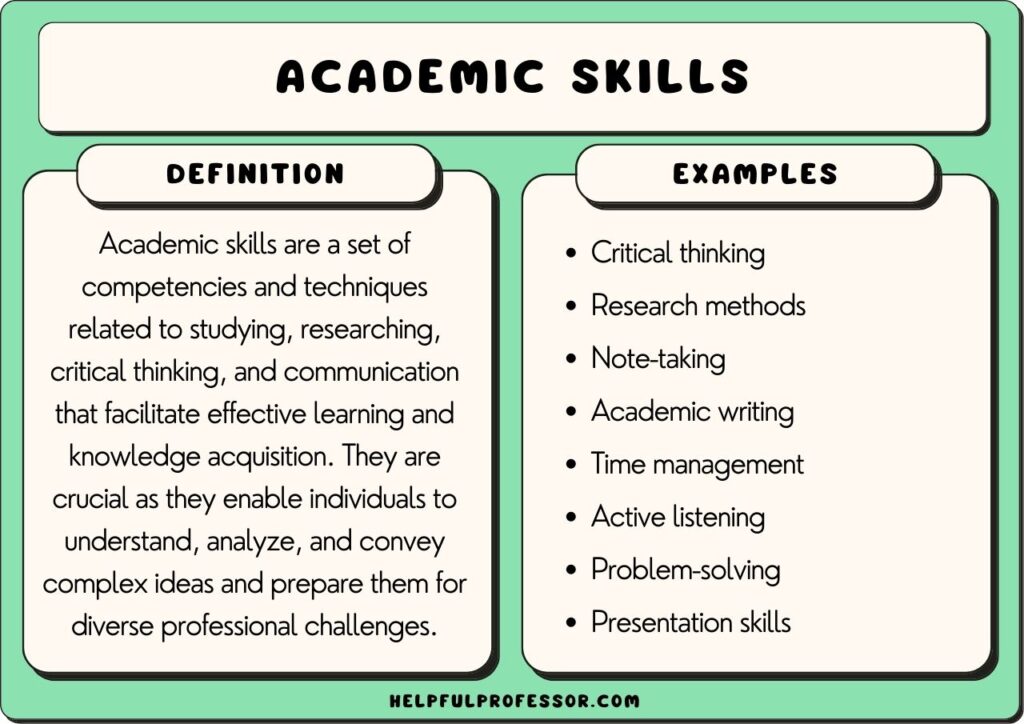
Academic skills are the skills people need in order to succeed in an educational setting. People attending college or university are expected to have well-developed academic skills in order to succeed in their degrees.
Academic skills are not merely cognitive (the ability to think at a higher level). A good student also needs a wide range of soft skills such as organizational and communication skills.
When you develop academic skills , they will not only help you to succeed in your studies. They will also be easily transferrable into a workplace environment. For example, the ability to conduct thorough research may become a daily task throughout your career. As a result, strong academic skills will help you to position yourself well for a good career once you graduate.
Academic Skills Examples
1. Communication Skills : You will be required to communicate in writing as well as orally (and possibly many other ways) in nearly every course you take. Your skill in succinctly communicating what you have learned will be a central way your knowledge will be assessed throughout your studies.
2. Research Skills: This includes being able to find and use relevant sources of information, as well as being able to critically evaluate those sources. Whereas in our daily lives a quick internet search is sufficient, for academic research, you will be required to conduct rigorous research from high-quality and reliable sources.
3. Organizational Skills : Being able to organize your time will be central to your success at university. You will need to be able to keep track of deadlines, study regularly, take multiple courses each semester, and fit all of this around your personal life. To be successful at juggling all of this, you need to be highly organized.
4. Study Skills: If you develop good study habits at the start of your degree, you will find it much easier to succeed. Good study skills include the ability to focus, summarize, take notes, and commit information to memory.
5. Critical Thinking Skills: This includes being able to analyze and critique information rather than simply believing it. To be a good critical thinker, you need to always be reflecting on what you’re observing or reading and considering whether it is logical, reliable, and valid. A critical thinker may also be able to find out of the box solutions to difficult problems (see: problem-solving skills ).
6. Basic Writing Skills : Being able to write clearly and effectively is a necessity at university. When you can communicate thoughts and ideas in a clear and concise manner, you can demonstrate to your teacher that you have strong knowledge of the information.
7. Academic Writing Skills: Over and above basic writing skills, you also need academic writing skills. These are skills that are specific to writing for academic purposes, such as the ability to write logical and clear arguments based on extensive scholarly research.
8. Problem-Solving Skills: At university, you’ll be constantly presented with problems that you will be asked to solve. To do this successfully, you need to be able to brainstorm , troubleshoot, and find creative solutions to challenges.
9. Self-Discipline : You will need to have the self-discipline to stay focused and motivated. Unlike high school, your teacher won’t be watching and guiding you through everything. So, you need to create and stick to a schedule, meet deadlines, and resist distractions.
10. Social Skills: In the 21st Century, social interaction is vitally important as most people work in teams these days. At university, there is a high likelihood you’ll be assessed on your ability to work well in a group, communicate effectively, and resolve conflict.
11. Teamwork Skills: the ability to work effectively as part of a team is an important academic skill. This includes things like being able to collaborate , compromise , and support others.
12. Time Management Skills: With so many tasks to juggle at university, you can’t waste your time at all. Being able to prioritize tasks, set milestones, and focus while studying are essential. Otherwise, you will find yourself forever asking for extensions!
13. Stress Management Skills: There will be times when you have many exams coming up at once. To manage this, you need to remember to follow good stress management practices like getting sufficient exercise and breaking tasks down into chunks.
14. Flexible Thinking Skills: At university, you will be faced with a range of new challenges and problems that will force you to think differently. This includes being able to adapt to change, think creatively, and consider different perspectives.
15. Cultural Competence : The ability to understand and respect different cultures is an important skill in modern multicultural educational settings . This includes things like being aware of one’s own cultural biases, being open to new experiences, and valuing diversity .
16. Global Citizenship: Global citizenship is a buzzword at unviersities. It refers to the ability to think and act in ways that reflect a commitment to global prosperity. This includes things like being environmentally conscious and promoting international social justice.
17. Digital Literacy : In a digital first world, the ability to use technology in a responsible and efficient way is essential. You need to be able to select the best apps for purpose and navigate them efficiently to help you achieve your goals. But at the same time, you need to constantly be aware of online safety and respecting intellectual property rights.
18. Public Speaking Skills: Most university degrees have public speaking components, such as giving speeches to your classmates or participating in debates in seminars. Being able to confidently present your point of view within group settings without bluster is essential.
19. Persistence : Despite this being right down the end toward ‘soft skills’ , persistence is still one of the most essential of skills for students. There will be times when you just want to quit, but getting through those tough times will help you show to yourself that you are a strong person.
20. Paraphrasing : Paraphrasing involves interpreting information and re-presenting it in a unique way. To paraphrase shows genuine understanding rather than simply parroting someone else’s information. It’s essential in all written and oral pieces you submit at university.
21. Leadership: You will sometimes need to show leadership at university, especially when placed in groupwork roles. For example, you might have to take the lead on a project by delegating tasks among the group.
22. Collaboration: Collaboration refers to the ability to come together to share ideas and come up with ideas that were not possible alone. In groupwork, you will need to learn how to discuss, listen, compromise, and share in order to come to collaborative solutions.
23. Attention to Detail: When writing and reading, you need to get even the smallest details correct. if you don’t, you won’t demonstrate a complex and nuanced understanding of topics, and you’ll likely get lower grades.
24. Information Literacy: In the digital age, there is an overwhelming amount of information available at our fingertips. Information literacy refers to the able to select the most relevant, reliable, valid, and useful information for your needs.
25. Goal Setting: Having goals is one thing, but planning how to achieve them is an entirely different skill. At university, you need to be able to set long-term goals and short-term goals and develop action plans to achieve them. This includes things like creating milestones, time management, and even budgeting. Consider the SMART Goals framework for ideas.
26. Prioritization: Along with goal setting comes the ability to prioritize. In order to achieve your goals, you need to be able to figure out what tasks are the most important and tackle those first. This can be a difficult skill to master, but it is essential for students.
27. Note Taking: You will be taking notes in every class – so you need to get good at it! One solution is to use the cornell method of note taking which is designed specifically for college students.
28. Self-Directed Learning : In university, your learning is usually self-directed, meaning you have to do a lot of learning yourself without your teacher around you. They will set reading tasks and give you the basic information, but it’s your job to branch out and go deep on topics to get the top grades.
29. Work Ethic: A person with good work ethic is someone who works hard and commits to their work. They don’t slack off or cut corners. These sorts of people are often very successful students.
30. Multi-Tasking: Multi-tasking is the ability to do two or more tasks at the same time. At university, you will be constantly multi-tasking because you will be juggling multiple classes along with your work life and personal life every week. You need to be able to juggle your competing needs, meet deadlines, and still have a social life.
31. Punctuality: I remember turning up to class 5 minutes late and getting told I’m too late – I missed the seminar! In other words, chances are, if you’re not punctual, you’ll miss important information and you won’t get much sympathy from your professor!
32. Self-Reflection : There will be times when you let yourself down or don’t get the grades you want. In these situations, you need to be able to pause and reflect on what you did to find ways to constantly improve.
33. Logic: Being logical is important in university because you need to form clear and coherent arguments in your submissions. Furthermore, when you’re reading, you need to be able to see the connections between things and even identify logical fallacies or heuristics in the authors’ arguments.
34. Professionalism: One time when you will have to use professionalism is when you send emails to your professor. Don’t send emails as if they’re text messages. Remember to include salutations and write politely and professionally.
35. Adaptability : You’ll need to adapt at university. For example, you might need to adapt your laerning style for different classes. Some classes will require you to listen and take down verbatim notes, while other teachers will be very hands-on. You’ll need to be able to adapt to both teaching styles.
36. Diligence: Diligence means working hard and paying attention to detail. You can’t just do the bare minimum to get by – you need to put in the extra effort if you want to excel at university.
37. Self-Editing: There will be many times when you don’t have a peer or teacher to edit your work. Instead, you’ll have to rely on your own self-editing skills. Fortunately, self-editing can help increase your grades by 13%!
38. Social Networking: A huge part of attending university is developing social capital. You’ll get opportunities to meet industry leaders and potential employers. Make sure you make the most of this as the social contacts you make at university will help you to get a job at the end of it all.
39. Academic Cultural Capital: This refers to the skill of knowing how to navigate the politics of university. You need to understand how to do things that are exclusively part of academic culture, like referencing properly and academic note-taking.
40. Determination: There are not many other times in your life when you’ll need to dig deep and stay determined. When times get tough, rely on your determination to get that degree at the end, and use that determination to keep on going through thick and thin.
41. Self-Assessment : Self-assessment refers to your ability to analyze how you’re going, check-in with yourself, and evaluate your progress. If you can’t self-assess, then you won’t be able to identify your weaknesses and work on them.
42. Self-Belief: You need to believe in yourself in order to put in the effort. If you don’t believe in yourself, you will give up and never make it through the tough parts. To have self-belief, you might need to focus on developing an internal locus of control.
43. Self-Control : When studying, you need to be able to sit down, focus, and ignore all of the distractions around you. One good technique to help with your self-control is to use a pomodoro timer, designed to help you focus as you study.
44. Growth Mindset : A growth mindset is a belief in your ability to grow, improve, and learn. Without a growth mindset, you’ll find yourself giving up. The opposite of a growth mindset is a fixed mindset .
45. Realism: While you should aim for the best, make sure you still have one foot on the ground. Realism is a skill because it enables you to know what you can reasonably achieve and what’s a bridge too far.
46. Technical Writing Skills: If you’re doing a practical or science degree, you’ll need some technical writing abilities. This includes the ability to write reports, standard operating procedures, and manuals.
47. Analytical Thinking : This refers to the ability to think critically about data and information. To be analytical, you need to be able to understand complex systems and see the relationships between different variables.
48. Mathematical Thinking: This refers to the ability to solve complex numerical problems. If you’re studying a science or business degree, you’ll need to be good at math.
49. Summarizing: Nearly every day you’ll be summarizing things. You need to summarize information when you take notes, explain concepts in class, and write essays. The key to summarizing is to synthesize the most important data and present it clearly and succinctly.
50. Proofreading: Once you’ve finished writing a piece for class, it’s important to proofread your work. This means reading through it again to check for any spelling, grammar, or factual errors. As you do this, work on making the information clearer.
51. Active Listening : In class, you will need to use active listening skills to truly absorb the information provided as well as to engage in conversation. This involves hearing, understanding, and responding to what the other person is saying. Good active listeners don’t just wait for their turn to speak, they also make eye contact, use body language, and ask questions.
52. Humility: Learning to be humble is an important skill for students. This means being able to accept you’re not perfect. You’ll get tough feedback and you need to be open and willing to learn from your professor to improve slowly over time.
53. Deconstructing Texts: To deconstruct a text, you need to be able to read it closely and analyze the different parts. This process can help you understand the main ideas, identify logical inconsistencies, and commit information to memory effectively.
54. Reading for Meaning: When studying, you often need to be able to read for meaning rather than reading every single word. This is particularly true in reference texts where you can scan sections and set your focus only on sections that are relevant to what you’re looking for.
55. Empirical Thinking: This is the ability to think critically about empirical evidence. Empirical evidence is data that has been collected through observation or experiment. When looking at empirical evidence, you need to be able to understand the data and see what it means.
56. Discourse Analysis : This academic skill involves analyzing the meaning within texts to understand the discourses (in other words: the narratives and ideologies) that the text relies upon to get across its message. This is particularly important in social studies subjects.
57. Focus: Focus is extremely important to a student. You’ll need to focus when studying, in lectures, and in class. Sometimes, academic information is very bland and boring, but sustaining your focus is necessary if you’re hoping to get a good grade.
58. Deductive Thinking : This is the ability to arrive at a conclusion based on evidence and reasoning. In other words, you start with a few facts (or premises) and then use them to logically deduce a conclusion. This is a valuable skill in mathematics and the sciences.
59. Inductive Thinking: This is the ability to come up with a generalization based on specific data or evidence. In other words, you start with data or evidence and then use it to come up with a general idea. It can be seen as the opposite of deductive thinking.
60. Identifying Fallacies: A fallacy is an error in reasoning. There are many different types of fallacies , but they all involve coming to a conclusion that isn’t supported by the evidence. As a student, you need to be able to identify fallacies so that you can avoid them in your own work and call them out when others make them.
61. Hypothesizing: A hypothesis is a proposed explanation for a phenomenon. In other words, it’s an educated guess. When you do research in an academic setting, you often need to come up with hypotheses that you will then test using rigorous research methods.
62. Experimental Design: This is the process of planning an experiment. It involves coming up with a hypothesis, choosing a method of testing, and designing an experiment that will provide evidence to support or refute the hypothesis.
63. Data Analysis : This is the process of looking at data and making sense of it. This can involve anything from simple statistical analysis to more complex methods of qualitative data analysis .
64. Debate Skills: You may be asked by your teacher to argue your point convincingly and respond to the points made by others. This skill is particularly important in law and politics, but is also used in just about any subject to help students learn the various arguments and approaches to a topic.
65. Objectivity (Bias Minimization): Academics try their hardest to avoid bias. This is hard because many of our biases are unconscious biases. To aim for objectivity, we often follow tried and tested research methods and ensure our research is peer-reviewed.
66. Compare and Contrast: This academic skill involves looking at two or more things and identifying the similarities and differences between them. This is a core thought experiment used regularly in academic settings to help students understand the relationships between different texts or events.
See Also: How to Write a Compare and Contrast Essay
67. Critical Reading: This involves reading a text closely and critically in order to understand its meaning and to identify any flaws in its argument. This is an important skill for students because it allows them to engage with the material on a deeper level.
68. Differentiation : Like compare and contrast above, differentiation involves looking at two or more things and identifying the similarities and differences between them. However, differentiation goes one step further and asks students to not only identify the similarities and differences, but to also evaluate them.
69. Referencing : This is the process of acknowledging the sources that you have used in your work. This is important because it ensures that you give credit where it’s due and avoid plagiarism. There are different conventions for referencing (e.g. APA, MLA, and Chicago styles), so you need to make sure you know which one to use.
70. Academic Writing Style: Generally, academic writing involves writing in third person language, referencing whenever you make a claim that needs to be supported, and formulating a clear and coherent argument throughout your paper. There are different types of academic writing, including expository , argumentative, and report writing.
71. Integrity : You will exercise integrity every time you choose not to cheat, dedicate time and effort to learning the information, and be open and honest about how you conducted your research. When you have integrity, you avoid plagiarism, fabricating data, and other forms of academic dishonesty.
72. Intellectual Curiosity: Many academics are driven by a desire to understand the world and how it works. This curiosity leads them to ask questions, read voraciously, and conduct research. Being intellectually curious means that you are constantly learning and growing as a person.
73. Cooperation : In many academic disciplines, students are expected to work together in order to complete assignments and projects. This cooperative spirit is also important in the workplace, where team projects are the norm.
74. Initiative : At university, you don’t have anyone leaning over your shoulder and telling you how to do things. You are expected to be proactive and take initiative in your learning. This means that you need to be organized, set your own deadlines, and keep on top of your workload.
74. Creativity : Many people think that creativity is only important for arts and humanities students. However, creativity is also important in disciplines such as science, where it can be used to come up with new hypotheses and solve problems in innovative ways.
75. Specialization: At university, you’re expected to start specializing in the subjects that will be relevant to your career goals. For example, if you want to be a doctor, you will need to take courses in biology, chemistry, and physics.
76. Conscientiousness : This means reliable, hardworking, and organized. People who are conscientious tend to do well in academic settings because they are able to keep on top of their work and meet deadlines.
77. Interpersonal Skills : These are the skills that you use to interact with other people. They include communication, empathy, and teamwork. Interpersonal skills are important in academic settings because they help you to work effectively in group presentations and tasks.
78. Ethical Thinking: This is the ability to think about the moral implications of your actions. It is important in academic settings because it helps you to make sure that your research is conducted in an ethical manner. Hence, we have the concept in academia of ‘research ethics’.
79. Divergent Thinking : Divergent thinking is the ability to come up with new ideas and solutions. It is useful in academic settings because it allows you to be creative in your thinking and come up with innovative solutions that can help you get top grades.
80. Convergent Thinking : Convergent thinking is the ability to focus on one particular solution. It too can be useful in academic settings because it allows you to focus your thoughts and come up with a clear and concise argument (this is especially important when writing a thesis!).
81. Perseverance: This is the ability to keep going even when things are tough. You’re going to need this as a student! It will help you to continue with your studies even when things get difficult.
82. Persuasiveness: This is the ability to convince other people of your point of view. It can come in handy when you’re trying to get a good grade on an essay or presentation.
83. Project Management: This is the ability to plan, organize, and execute a project such as a thesis or group project. It is useful in academic settings because it allows you to efficiently manage your time and resources. Furthermore, it will be very useful as a workplace skill after you graduate.
84. Reliability: At university, you need to be a reliable partner in your group tasks. Furthermore, you’ll need to reliably hand in your essays and assignments on time or you won’t be able to pass your courses.
85. Insightfulness : This is the ability to understand and see things in a deep and meaningful way. In academic settings, this can help you to critically analyze arguments and come up with your own insightful interpretations of texts. Consider it a great compliment if your teacher gives you feedback: “very insightful!”.
86. Ambition: Ideally, you would be ambitious in your studies. For example, you should aim to be the best you can and get A+ Grades in your classes. If you lack ambition, then you’re more likely to give up when things get tough.
87. Proactiveness: You need to be proactive in order to survive at university. No one will tell you to start studying – you have to dig deep and find the strength from within to get started on your work in order to ensure you get everything completed in time.
88. Dedication: This is similar to ambition and perseverance. You need to be dedicated to your studies in order to be successful. This means putting in the extra time even when your life is already busy and full.
89. Efficiency : Efficiency is all about getting things done in the most effective way possible. This means finding ways to save time to spend on your studies while also having time for family, friends, and work.
90. Patience : Learning takes time. You often get frustrated that you haven’t mastered the information immediately. By studying regularly and chipping away at your work, you can succeed. Without patience, you may give up too soon.
91. Strategic Thinking : Strategic thinking is the ability to see the big picture and plan accordingly. This is useful in academic settings because you’ll often be asked to complete long-term and complex projects that require a strategic plan in order to succeed.
92. Resourcefulness: Resourcefulness is the ability to find and use the best resources available to you. This can be useful in academic settings because you are not given all of the information you need by your teacher. You will be expected to use the library and your home computer to find more information to complete your studies.
93. Presentation Skills: Presentation skills are important academic strengths because you will often have to present your work to the class. This means being able to effectively communicate your ideas in a way that is clear and concise.
94. Dependability : When doing group work, it is important to be a dependable partner. This means completing your tasks on time and being willing to help out other members of your group when needed. You’ll also need to be dependable for your teacher by submitting your work on time.
95. Intellectual Curiosity: Intellectual curiosity refers to the desire to learn and explore new ideas. It is an expectation at university that you are curious about the topics and study them deeply both in class and while completing your assignments.
96. Tenacity: Tenacity is the ability to keep going even when things are tough. When you’re studying, there will be times when you feel like giving up. If you have tenacity, you’ll be able to push through these tough times and come out successful on the other side.
97. Responsiveness: Academic settings are professional. If you’re contacted by your teacher, there’s an expectation that you respond in a reasonable timeframe. Similarly, when working in groups, you will need to be responsive to your team members.
98. Triangulation: This refers to the ability to use multiple sources of information to support your ideas. When writing essays, you’ll need to use evidence from your readings as well as multiple other sources in order to support your thesis.
99. Media Literacy : Media literacy is the ability to critically consume and analyze media. In an era where there is low media literacy in the general population, this is even more important than ever. You will need to know when media is biased, invalid, or unreliable.
100. Conflict Resolution : When working in groups, there will be times when conflict arises. We assign students these groupwork tasks in order to help them learn to cooperate, resolve conflict, and work effectively together. After all, this is also a skill you will need in the workforce.
101. Library Skills: The library is a crucial resource for university students. In order to succeed, you will need to know how to use the library effectively. This means being able to find the resources you need, using the library catalogue, and citing your sources correctly.
102. Online Etiquette: I often get frustrated with my students who email me with colloquial language. Instead, aim to be professional online as if you were talking to a boss or client.
103. Open-Mindedness: At university, you will be exposed to new and different ideas. It’s important to keep an open mind in order to learn and grow from these experiences. Many students leave university with completely different worldviews than when they started because they were open-minded to new information.
104. Commitment: Undertaking a university degree is a huge commitment. It takes a lot of time, energy, and effort. You need to be sure that you are committed to the process in order to succeed. When you graduate, that certificate shows a future employer that you can commit to something and see it through.
105. Independent Thought: One of the main reasons why university is so valuable is because it teaches you to think independently. This means forming your own opinions, evaluating evidence, and thinking critically about the world around you. It’s a skill that will be useful in every aspect of your life.
106. Personal Responsibility: At university, you are in charge of your own learning. This means that you need to take responsibility for your own success. If you don’t hand in an assignment, it’s not the professor’s fault – it’s yours. If you don’t study for an exam, that’s on you.
These are just a few examples of the types of academic skills that students need in order to be successful. Of course, the specific skills that are most important will vary depending on the individual and the particular field of study. However, all of these skills are valuable for success in an academic setting.
One of the best ways to develop and improve academic skills is to work closely with your teacher. You can also approach your university library which may offer regular academic skills seminars. By participating in these types of seminars, students have the opportunity to practice and hone their skills.

- Chris Drew (PhD) https://helpfulprofessor.com/author/chris-drew-phd-2/ 25 Number Games for Kids (Free and Easy)
- Chris Drew (PhD) https://helpfulprofessor.com/author/chris-drew-phd-2/ 25 Word Games for Kids (Free and Easy)
- Chris Drew (PhD) https://helpfulprofessor.com/author/chris-drew-phd-2/ 25 Outdoor Games for Kids
- Chris Drew (PhD) https://helpfulprofessor.com/author/chris-drew-phd-2/ 50 Incentives to Give to Students
Leave a Comment Cancel Reply
Your email address will not be published. Required fields are marked *
Academic Skills
Develop the academic and professional skills you need for your studies and beyond.
Academic Skills provides one-on-one advice, workshops and resources to help you develop the communication and study skills that will set you up to succeed in your next assignment, upcoming semester, further study, and career outside of university.
Our services, which are available to every enrolled student and graduate researcher at the University of Melbourne, can support you to continually improve your academic skills, including writing, critical evaluation, time management, collaboration and more.
Featured content
Services for staff, students as partners, news and events, connect with the academic skills team.
- Email [email protected]
- Youtube Subscribe on Youtube
Get personalised advice, tips and feedback to help you develop your academic skills. Book an Individual appointment or contact our Writing advice service.
Writing advice service
Fill out the online form and attach a short piece of your written work. Writing Mentors can provide feedback on your work, and advice on how to further develop your writing skills.
Individual appointments
Book a time to meet on Zoom. Academic Skills Advisers can go through a section of your writing with you, discuss strategies for key study areas, or help you access relevant resources.
Compare our services
Writing Mentors: fellow students, recent graduates, tutors – all trained by Academic Skills Advisers
Academic Skills Advisers: qualified language and learning professionals
- 15 minutes for the Writing Mentor to review your paper*
- One submission per assessment
- Unlimited number of submissions per semester
- The service is offered online. Contact the service (see below), fill out a short form with details and attach your paper/task. We email you with feedback usually within 1-2 days. **
* Due to time constraints, we can only look at a short section of work–if you would like longer papers looked at, choose the Individual Appointment service.
** Closed on weekend and University holidays; waiting time may be longer in peak periods e.g. SWOTVAC.
- 30-minute* 1-1 appointment with an Adviser
- 4 sessions per semester
- No more than 1 appointment per week
- No more than 2 appointments on the same piece of writing
- The service is offered via Zoom**
- Book the service (see below). After choosing your date / time, we will email you a Zoom link.
* Graduate researchers are able to book 1-hour appointments.
** Appointments can be offered in-person, if needed, contact Academic Skills at the email below to arrange this.
- A quick focus on short, specific parts of your writing, e.g. selected paragraphs of your draft work, to provide advice and developmental feedback
- Answers to specific questions you have about a particular piece of writing, e.g. referencing, a particular grammar point, development of an argument in your introduction etc.
- In-depth focus on study and communication skills
- Answers to questions you might have about academic work, e.g. incorporating sources, academic voice, critical analysis
- Advice on broader academic skills such as time management, managing reading, strategies for revision and taking exams.
- Advice on improving your English
This service does not offer:
- A review of complete papers unless they are very short. 15 minutes allows Writing Mentors to review short sections of work only.
- Proofreading or editing
- Reviews of anything outside of written work for the University of Melbourne.
- Management of one particular piece of academic writing from draft to finished product over several sessions. We can see students about the same piece of writing no more than twice*
- Proofreading or editing: we want to help you become a better self-editor, so will work with you to develop the skills to do this
- Course planning (See Stop 1 )
- IELTS tests or time-limit exam answers
- IT questions
- Applications to other universities
- Resume, Cover letters (See Careers )
* Graduate researchers are able to see Advisers on a longer term, ongoing basis more than twice for the same piece of work due to the nature of Doctoral / research writing.
Undergraduate and graduate coursework students only
Any enrolled University of Melbourne student *
*If you and a small number (3-4) of classmates or group members have similar questions, you are welcome to join together. Please raise this with Academic Skills before the appointment using the email address below.
- Starts Monday, week 4 of the semester
- Finishes on the Friday of Exam Week 2
- Available during office hours – 9am-5pm
- Not available on days when the University is closed
- Available all year (except for days when the University is closed)
- Note that availability may be limited between semester periods
- No booking required
- Access via Contact button below
- Booking required
- Access via Book button below*
- Book up to 2 weeks in advance
* You can cancel the booking at the same website
Writing advice service*
Please note that any written submissions to Academic Skills must conform to University of Melbourne regulations and guidelines on Academic Integrity .
Further questions about these services? Email [email protected]
Join a workshop to explore practical strategies and academic skills that are crucial for university success.
On this page
Academic reading, writing and referencing, speaking, presenting and engaging in class, study skills, english language, melbourne orientation.
For all workshops running 15–19 July, register on the Melbourne Orientation Week booking page.
Build your Melbourne Orientation itinerary
Learn a range of practical skills for managing your reading, producing written work and using academic literature in your assignments.
Register for upcoming workshops in this series below the table.
| Workshop | Description | Dates |
|---|---|---|
| Academic writing for graduate coursework students | As a new graduate coursework student, you might be encountering some of the increased expectations of writing at this level of study. This workshop explores the expectations of academic writing at UniMelb as well as introducing practical techniques for advanced-level writing that satisfies demanding readers. | 6 Aug Repeated on: 27 Aug |
| Critical thinking | The skill of critical thinking is central to academic success. All of us think critically every day, but university academic expectations may be different from those you may be used to. We will explore how to apply critical thinking skills to your studies, especially when reading and writing. | 25 Jul Repeated on: 12 Aug 23 Aug |
| Demystifying the passive voice | The use of active voice and passive voice can be confusing for many academic writers. You may wonder, ‘What is active voice? What is passive voice? Is passive voice incorrect? Which should I use in my writing?’ In this interactive workshop, we will answer these questions and give you the tools you need to use active and passive voice with confidence. | 5 Aug |
| Essay writing 101 | The essay is perhaps the most common form of academic writing at the university. Learn about essay structure, paragraphing and features of essays with sample texts for analysis to help you better understand this task type. | 13 Aug Repeated on: 22 Aug |
| Mastering punctuation | - ’ : ; ” . ? ( ! : Knowing how to use these punctuation marks can not only make your writing more accurate, but also enhance the impact and clarity of your writing. Attend this interactive workshop to learn how you can use punctuation to take your academic writing to the next level. You will have opportunities to ask questions and practise a range of punctuation rules. | 6 Aug |
| Take charge of your reading and note-taking | Managing your reading at university is one of the most important things to get on top of early. This session examines making strategic reading choices, organising your reading, optimising reading times, taking notes and strategies for dealing with difficult reading. | 25 Jul Repeated on: 30 Jul |
| Understanding referencing | This session explores referencing at university. It looks at how to take information from different sources and incorporate it into your work and how to best use Library resources. | 15 Aug Repeated on: 3 Sept |
| Writing your first assignment | You may be asked to complete a variety of written assessment tasks at university. You will consider strategies to approaching written tasks with a process, finding resources and responding to tasks. | 26 Jul Repeated on: 2 Aug |
| Writing your final assignment | This session examines what is expected for your final first-year assignment – probably the longest and most important writing task of the semester. We will explore strategies and resources for approaching this task efficiently. | 2 Oct Repeated on: 8 Oct |
| Writing your first literature review | Reviewing literature is a key academic skill used in many disciplines. This workshop introduces you to the basics of writing a lit review, focusing on the elements of a lit review, the language needed and the key aspects of criticality and interpretation. | 6 Aug Repeated on: 14 Aug |
Upcoming events in academic reading, writing and referencing
Learn a range of practical ways to participate more effectively and confidently in classes, assessments and social situations.
| Workshop | Description | Dates |
|---|---|---|
| Getting the most out of lectures | The main delivery mode of learning at university is through lectures. This session focuses on preparing for lectures in both face-to-face and online contexts, effective note-taking, plus organising and reviewing your notes. | 23 Jul |
| Intercultural learning through Story Circles | Join this Story Circles session to develop your communication skills and build connections by sharing and reflecting on lived experiences in a safe and nurturing environment. | 15 Aug Repeated on: 29 Aug |
| Participating in class discussions | Learn how to participate effectively in a range of speaking contexts at university by practising strategies for asking questions, engaging in discussions and supporting your views. Featuring authentic academic discussion activities, this class will help you develop confidence and skills for getting involved actively at university. | 26 Jul Repeated on: 2 Aug |
| Presenting Effectively | This interactive session looks at the skills of effective presenters focusing on voice, body language and visuals. | 8 Aug |
Upcoming events in speaking, presenting and engaging in class
Learn a range of practical strategies and tools to engage with the University and your studies most effectively.
| Workshop | Description | Dates |
|---|---|---|
| Exam preparation and active revision | This workshop will provide you with techniques and resources for effective exam taking. Through interactive activities, you will reflect on your study approaches and discover a range of study strategies. | 1 Aug Repeated on: 18 Sept 16 Oct |
| Translating study skills into employability skills | Skills such as research, critical thinking, teamwork, time and project management, communication and writing do equip you for job seeking and are highly valued by employers. This session examines the critical skills you develop through tertiary study and explores how to rethink these skills for job seeking. | 8 Aug |

Upcoming events in study skills
Learn a range of strategies and practise techniques to build your confidence communicating in English at university and beyond. These workshops are for students who speak English as an additional language.
| Workshop | Description | Dates |
|---|---|---|
| Grammar & expressions for giving opinions in class | University classes often require students to share their opinions. In this interactive workshop, you will learn and practise expressions and grammar that can help you effectively and confidently share your opinion. | 29 Jul |
| Grammar and expressions for concise and cohesive writing | Strong academic writing is concise (short and sharp) and cohesive (connected). To help us write in this way, we often use a grammatical structure called ‘nominalisation’. In this interactive workshop, we will practise using nominalisation to improve our academic writing. | 5 Aug |
| Grammar and expressions for talking to your teachers | All students need to speak to their teachers to ask questions and seek advice. In this interactive workshop, you will learn and practise grammar and expressions that you can use when communicating with your teachers. | 22 Jul |
| Improve your English in 10 Minutes a day – Listening & Speaking | In this session you will practise listening and speaking activities that you can complete in around 10 minutes per day to improve your English over an extended period. | 30 Jul |
| Improve your English in 10 minutes a day – Reading & Writing | In this workshop you will practise reading and writing activities that you can complete in around 10 minutes per day to improve your English over an extended period. | 23 Jul |
| Listening Club 1: 5 quick steps for listening success | Learn and practise useful pre-listening strategies that can help you listen to, and understand, your classes more effectively. | 24 Jul |
| Listening Club 2: Listening for main ideas and details | In this interactive workshop, you will learn and practise listening strategies that can help you identify main ideas and details. | 31 Jul |
| Listening Club 3: Taking effective notes while listening | In this interactive workshop, you will practise using a range of listening and note taking strategies that you can apply. | 7 Aug |
| Messaging and emailing in English | A lot of university communication occurs over email and messenger, but the two ways of communicating require very different writing skills. Attend this practical workshop to learn and practise ways of emailing your teachers and other students, as well as strategies and expressions that you can use when messaging your peers in group chat. | 22 Jul |
| Navigating new and complex vocabulary | Learn strategies for recognising, understanding and remembering useful words and expressions so you can apply them to your academic speaking and writing. | 29 Jul |
| Reading Club 1: 3 steps to success before you read a new text | Set yourself up for success by using our three steps for approaching a new reading text. In this interactive workshop, you will use one of your reading texts to practise useful pre-reading strategies. | 23 Jul |
| Reading Club 2: How to read quickly and find information | University study often requires a lot of reading. Attend this interactive workshop to practise reading strategies that can help you read more quickly and find the details you are looking for. | 30 Jul |
| Reading Club 3: Note taking skills that can take you further | Taking notes while reading is a key skill at university. But how should we actually do it? And what should we write? In this workshop, you will practise using a range of note taking strategies and techniques that can help you make more effective notes while reading. | 6 Aug |
| Speaking Clearly 1: Stress patterns in speech | Learn how to recognise and produce correct stress patterns in words and sentences in spoken English, then practise your skills with other learners. | 24 Jul |
| Speaking Clearly 2: Rhythm and intonation | Discover how the rhythm and melody of your sentences conveys what is important and what you want to emphasise, and practise with other learners. | 31 Jul |
| Speaking Clearly 3: Word endings and pronunciation | Listeners can misunderstand if the sounds at the ends of words are unclear. Learn how to hear and say word endings correctly and practise with other learners. | 7 Aug |
| Speaking Clearly 4: Difficult consonants | Different languages have different consonant sounds. Come along to practise the consonant sounds in English that are difficult for you and practise with other learners. | 14 Aug |
| Speaking Clearly 5: Vowels | Learn how to hear vowel sounds, discover rules for vowel spelling, and practise producing accurate vowels in speaking activities with other learners. | 21 Aug |
Upcoming events in English language
Explore other student services workshops
Getting started
Reading, writing and referencing, communicating in class, english language development, academic integrity.

Graduate researchers must be able to evaluate and synthesise literature and data, analyse critically within and across changing disciplinary environments, and communicate their research orally and in writing to a variety of audiences.
No matter which stage of your research you’re in, Academic Skills offers a variety of free services to help you develop these skills.
What we offer
Services and programs.
Academic Skills offers a range of workshops to help you develop your academic writing, communication and language skills. All of our workshops are listed on the RDU events portal – check out what’s on and enrol.
Enrol in a workshop
Get personalised advice on developing your writing, language and communication skills during an individual appointment with an Academic Skills Adviser. Book online through the Stop1 booking system.
Book an appointment
Melbourne Talks
A free program for international students new to the University of Melbourne delivered by the Student Peer Leader Network in partnership with Academic Skills. For information, check out the information page.
Explore the program
Online resources
Setting up for success: managing your graduate research project.
Develop techniques in working with a supervisor, setting goals and in project management.
Developing writing skills for graduate research
Learn how to write complex information clearly, develop an authorial voice and demonstrate originality.
Writing thesis sections - Part 1
Learn about thesis structures and how to write introductions, literature reviews and conclusions.
Writing thesis sections - Part 2
Develop your skills in writing about methods, results and findings.
Writing a paper for publication
Learn how to write a journal article and get published.
Incorporating publications in your thesis
Learn how to plan for and include publications in your thesis.
Developing your networking and presentation skills
Other ways you can develop your skills.
The starting point for all University of Melbourne graduate researchers at any stage of their candidature to find professional development offerings and resources tailored to their needs.
Get started by exploring the RDU
Where graduate researchers can expand their information and digital literacy skills throughout their postgraduate degree.
Build your research skills with Researcher@Library
Where graduate researchers can access a range of information, resources and support offered at the University of Melbourne to assist with achieving their academic goals.
Explore the Graduate Research Hub
An independent student association representing all enrolled graduate students at the University of Melbourne, providing representation, events, training and support.
Connect with GSA
Explore all Academic Skills resources
English language skills
Vocabulary and grammar, reading and writing, listening and speaking, develop your english language and communication skills for success at university and beyond..
Use the menu on the left to find out about the free workshops, programs and resources for the skills you are most interested in developing.
Watch Chenglong as he asks his peers about the range of English language programs and support available on his study journey.

Diagnostic assessment feedback and recommendations
Not sure where to start? Take the Diagnostic English Language Assessment (DELA) to assess your strengths in academic reading, writing and listening and receive personalised recommendations to support you in your skills development journey. It’s not an exam and you can’t fail.
Learn more about the DELA
Academic Skills offers free English language workshops for all study levels.
Topics include:
- Vocabulary building strategies
- Grammar and expressions
- Using and understanding language tools and apps
Improve your English in 10 minutes a day
Explore workshops
Academic English Tutorials (graduate coursework)
Join our free tutorial program available to graduate coursework students in your first or second semester of study. The tutorials require no additional assessments and can help you further develop your academic and English language skills within the context of your discipline. You’ll need to apply to participate, and spaces are limited. Learn more
Web resources
Explore our resources to develop your language skills.
- Using tenses
- Punctuation
- Using articles ('a/an', 'the' and no article)
- Forming subject-verb agreement
- Passive and active voice
- Nominalisation
- Developing your vocabulary
- 10-minute English
- Improving your English
- Academic and professional communication
Attend our range of workshops on academic reading and writing for all study levels.
- Reading club
- Messaging and emailing in English
- Critical thinking
- Essay writing
- Understanding referencing
Join our free tutorial program available to graduate coursework students in your first or second semester of study. The tutorials require no additional assessments and can help you further develop your academic and English language skills within the context of your discipline. You’ll need to apply to participate, and spaces are limited.
Join our online program to receive daily prompts and bite-sized activities to improve your reading skills.
Explore our resources to develop your academic reading and writing skills.
- Reading critically
- Academic style
- Clarity and focus
- Writing a great essay
- Research reports
- Connecting ideas
- Emailing your lecturer
Online modules
Join the English for Success community for tips, videos, examples of good writing and interactive exercises to test your understanding and get feedback on your academic English.
- How to write effective paragraphs
- How you can transform your writing to be more academic
- How to communicate complex ideas clearly and simply
- Golden rules for writing
- Four ways to make your writing more sophisticated
Enrol in modules
Other ways to improve your reading and writing skills
Individual appointments and writing advice service.
Get feedback on your writing and personalised advice on developing your English language and communication skills during an individual appointment with an Academic Skills Adviser. Or you can submit a piece of work to a Writing Advice Service Mentor for quick feedback on a part of your writing.
Find out more
Academic English 1 (ESLA10003) credit subject for undergraduate students
Through the study of multiculturalism in Australian society, this subject develops students’ ability to use academic English language.
Presenting Academic Discourse (LING90002) credit subject for graduate students
This subject focuses on the advanced language required for successful graduate study in English.
Attend our range of workshops on academic listening and speaking for all study levels.
- Aussie English
- Conversation group
- Listening Club
- Speaking Clearly
- Getting the most out of lectures
- Academic listening strategies
- Participating in class discussions
- Presenting effectively
Join our online program to receive daily prompts and bite-sized activities to improve your listening skills.
Explore our resources to develop your listening and speaking skills.
- Intercultural communication
- Talking to your teacher (coming soon)
- Talking in groups
- Listening techniques (coming soon)
Join the English for Success community for tips, videos and examples to practice and test your pronunciation and presentation skills at your own pace.
- Pronunciation
- Oral presentations
Other ways to improve your listening and speaking skills
Melbourne Talks is a free, peer-to-peer program hosted by the Student Peer Leader Network in partnership with Academic Skills. It is open to all University of Melbourne students wanting to become familiar with Australian culture and University life while gaining confidence communicating in English and making friends with other students.

Academic Essay
Essay generator.
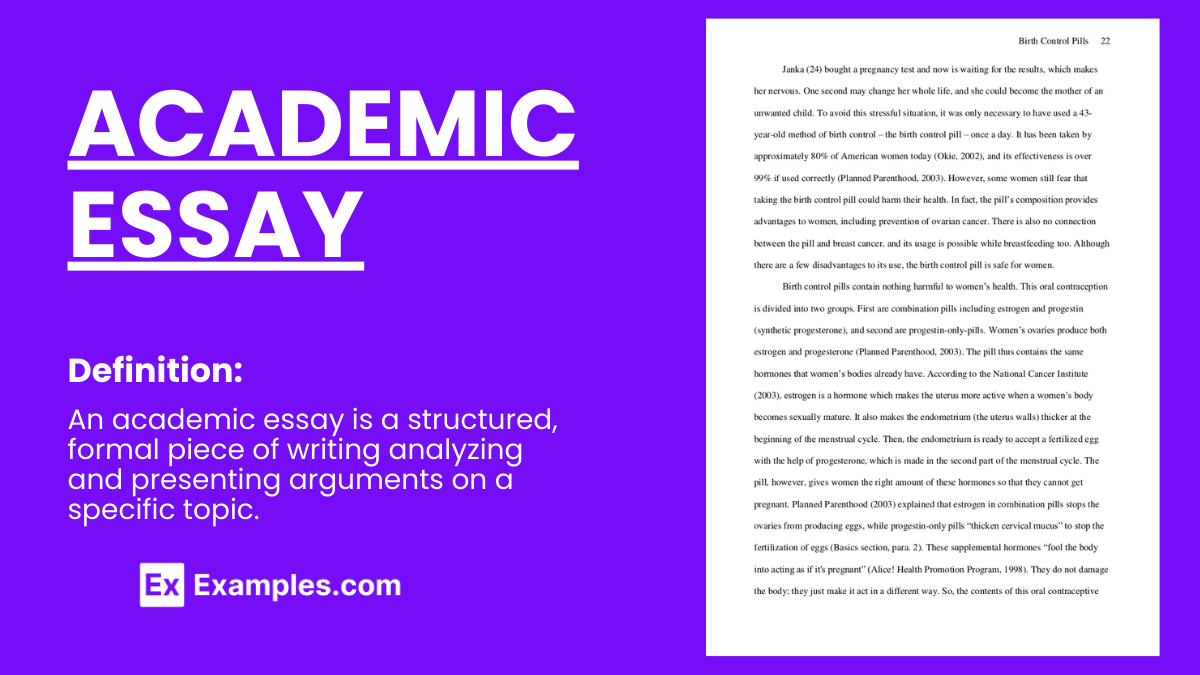
When creating an academic essay , it is very important for you to relay a sensible and clear argument to your target readers. Since academic essays are widely used in the field of education and research, you need to ensure that you do both logical, interesting and informative writing . The items that are commonly seen in an academic essay contain insights, actual occurrences, ideas, and facts.
What is Academic Essay?
An academic essay is a structured form of writing that serves the purpose of presenting and supporting a thesis or argument on a specific topic. It is commonly used in educational settings to assess students’ understanding, analytical skills, and ability to research and convey their findings. An academic essay typically follows a clear format, including an introduction with a thesis statement, body paragraphs that provide evidence and analysis to support the thesis, and a conclusion that summarizes the main points and reinforces the essay’s central argument. This type of essay requires critical thinking and a formal tone, with evidence cited from reputable sources to back up claims made within the text.
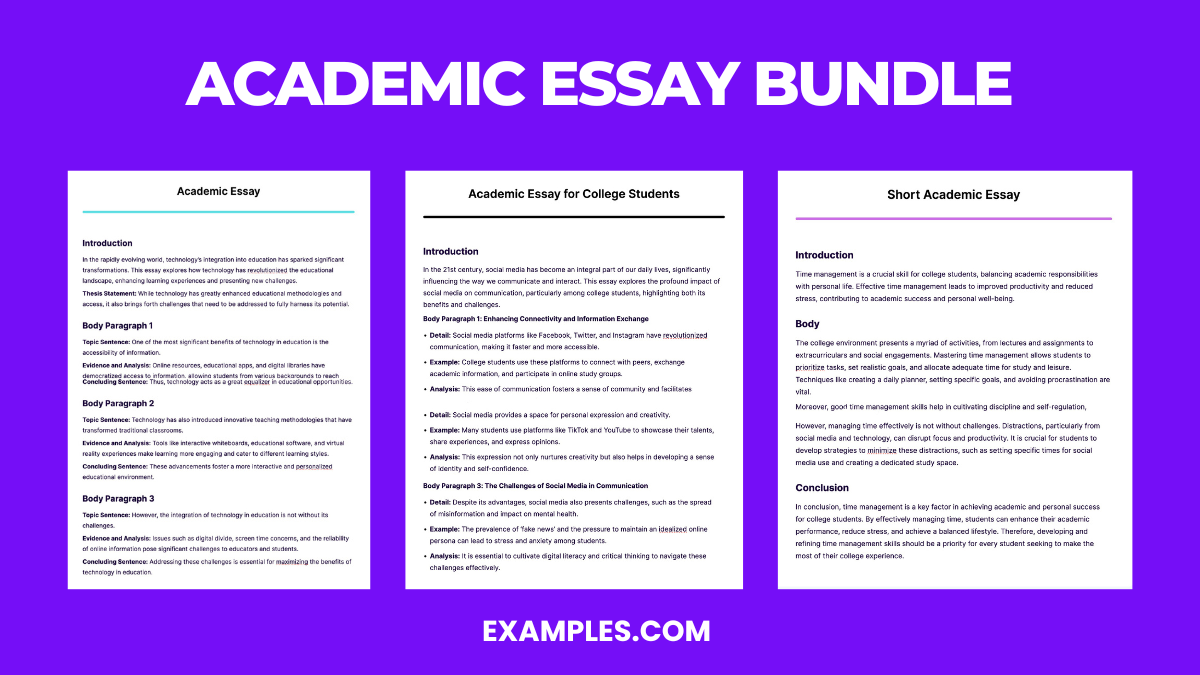
Download Academic Essay Bundle
A lot of students tend to think that an academic essay, just like any other college essay , is something that is too technical or defined. However, you can always write one depending on how you perceive a specific topic of discussion or how you interpret an instance or any other subjects. The samples that we have for you can be a great help if you would like to start writing your academic essay already.
Academic Essay Writing Format/ Outline
1. title page (if required).
Includes the essay’s title, the author’s name, and institutional affiliation.
2. Introduction
Hook : Opens with a statement to grab the reader’s interest. Background Information : Provides context for the topic being discussed. Thesis Statement : Presents the main argument or claim of the essay.
3. Body Paragraphs
Each paragraph should focus on a single idea that supports the thesis, structured as follows:
Topic Sentence : Introduces the main idea of the paragraph. Evidence and Analysis : Includes data, quotes, or examples to support the topic sentence, followed by an explanation of how this evidence supports the thesis. Transition : Connects to the next paragraph or idea.
4. Conclusion
Summary of Main Points : Restates the key arguments or findings presented in the body paragraphs. Restatement of Thesis : Reinforces the essay’s main argument in light of the evidence presented. Closing Thought : Offers a final insight, a call to action, or a suggestion for further research.
Example of Academic Essay Writing
The Impact of Social Media on Communication In the digital age, social media has revolutionized the way we communicate, transcending physical boundaries and transforming social interactions. This essay explores the profound impact of social media on communication, examining both its positive advancements and negative implications. While social media platforms like Facebook, Twitter, and Instagram have enhanced our ability to connect with others, they have also led to a decline in face-to-face interactions and a dilution of personal communication skills. Social media has made it easier than ever to stay connected with friends and family, regardless of geographical distance. A study by Smith and Duggan (2016) found that 75% of internet users utilize social media to maintain relationships with distant family and friends. This widespread use of social media for keeping in touch demonstrates its role as a vital communication tool, bridging the gap between people worldwide. However, the reliance on social media for communication has led to a decrease in the quality of interpersonal interactions. Research by Johnson (2018) indicates a 40% decline in face-to-face conversations among young adults, correlating with increased social media usage. The preference for digital communication over personal interaction suggests a shift in social dynamics, potentially harming relational depth and emotional connections. Moreover, social media has affected our communication skills, particularly among younger generations. A survey by Lee (2019) revealed that 60% of teachers believe social media use has adversely affected students’ writing and verbal communication skills. The informal language and abbreviations common in social media posts and messages are infiltrating academic and professional communications, underscoring the need for a balanced approach to digital interactions. Social media has undeniably transformed communication, offering unparalleled connectivity but also presenting significant challenges. While it fosters global connections, its overuse can undermine personal interactions and communication skills. Balancing social media use with face-to-face communication is crucial for maintaining meaningful relationships and effective communication in the 21st century.
What is an example of academic writing?
Title: The Impact of Climate Change on Biodiversity
Introduction: Climate change, driven primarily by human activities such as the burning of fossil fuels and deforestation, has emerged as a critical global concern. This essay aims to explore the multifaceted impacts of climate change on biodiversity. The effects of rising temperatures, altered weather patterns, and habitat destruction are increasingly evident, with far-reaching consequences for ecosystems and species worldwide.
Body Paragraph: One of the most noticeable consequences of climate change is the shifting geographical ranges of numerous species. Warmer temperatures prompt species to migrate to higher altitudes or latitudes, as they seek habitats that align with their thermal preferences. This phenomenon is evident in various ecosystems, including mountain regions, where alpine plants and animals have progressively moved uphill. These migrations, while adaptive, can disrupt established predator-prey relationships and competition for resources. Such shifts can also lead to reduced biodiversity in lower-altitude regions as some species fail to adapt or relocate successfully.
- Smith, J., & Johnson, A. (2019). Impacts of Climate Change on Alpine Plant Communities. Environmental Studies Journal , 42(3), 256-270.
- Wilson, P., & Davis, R. (2020). Climate-Induced Shifts in Animal Distributions: Evidence from a Decadal Study. Ecology and Evolution , 10(12), 5963-5972.
Conclusion:
In conclusion, climate change exerts profound effects on biodiversity, manifesting through shifts in species distributions, altered ecological relationships, and habitat loss. As global temperatures continue to rise, addressing these impacts becomes increasingly urgent. Conservation efforts, sustainable practices, and international cooperation are essential in mitigating the repercussions of climate change on the world’s diverse ecosystems and species.
Academic Essay Topics with Samples to Edit & Download
- Pollution due to urbanization
- The environmental causes of smoking
- The outcomes of global warming
- Abortion as a controversy
- Causes of obesity in teenagers
- Childhood memories
- Fathers should get equal paternity leave
- Harmful dogs should be euthanized
- How does divorce affects children?
- How does technology affect productivity?
- Importance of preserving threatened species
- Parenting styles and motives
- Political issues in the U.S.
- Romantic relationships
- Should schools abolish homework?
- Violent video games should be banned
- Ways of protecting the environment
Academic Essay Writing Examples & Templates
1. academic essay example.
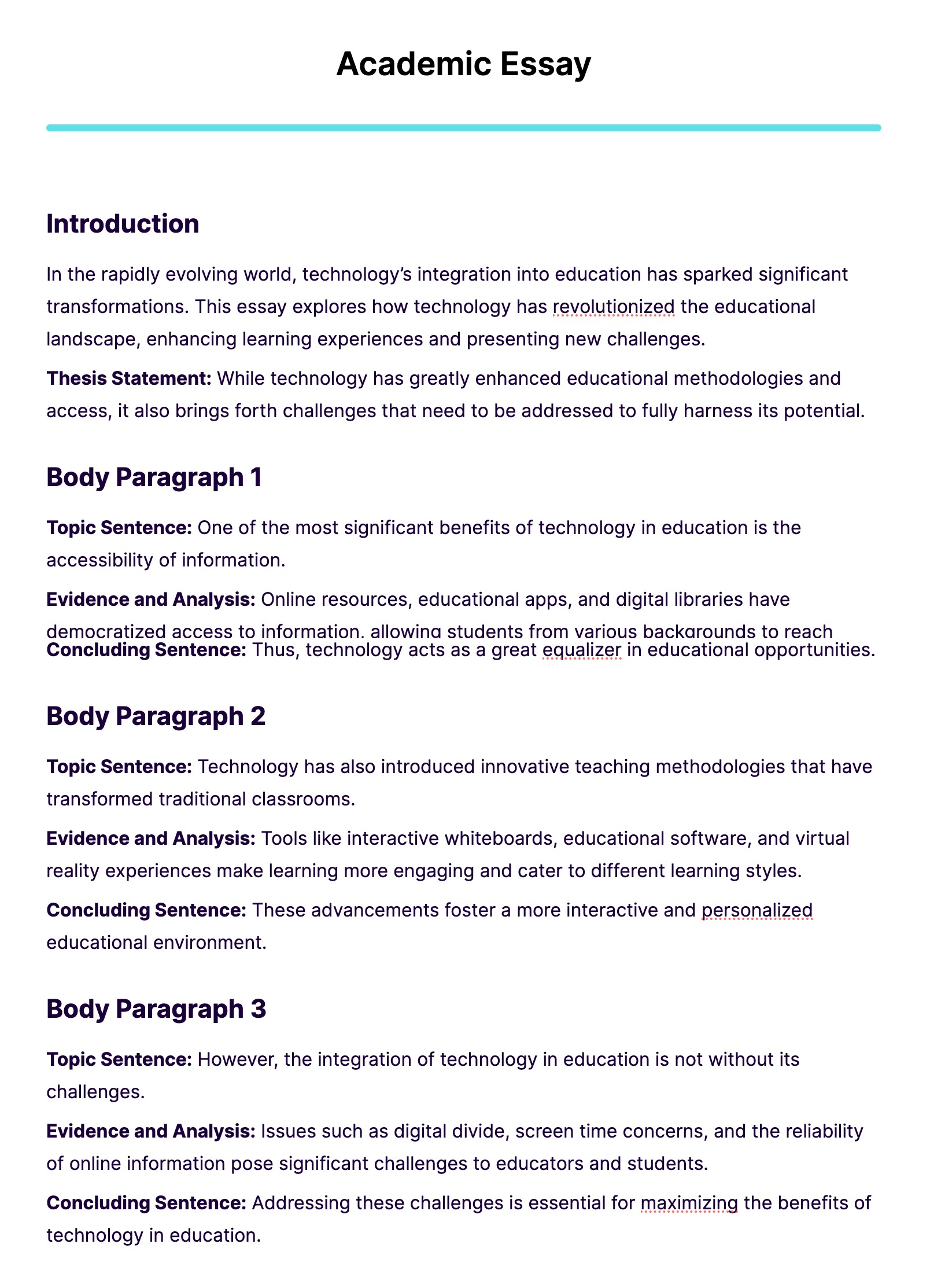
Free Download in PDF
2. Academic Essay for College Students
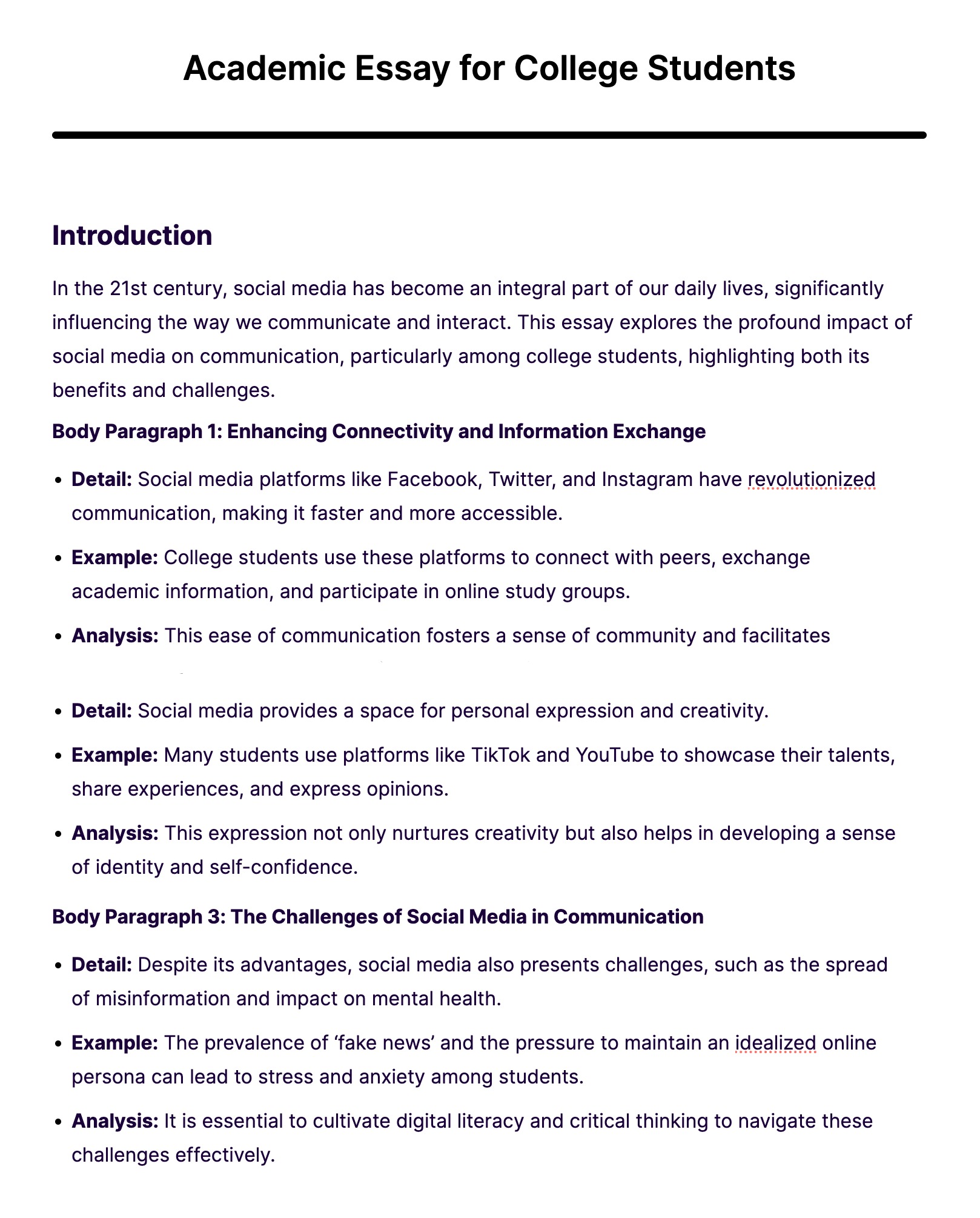
Edit & Download
3. Short Academic Essay
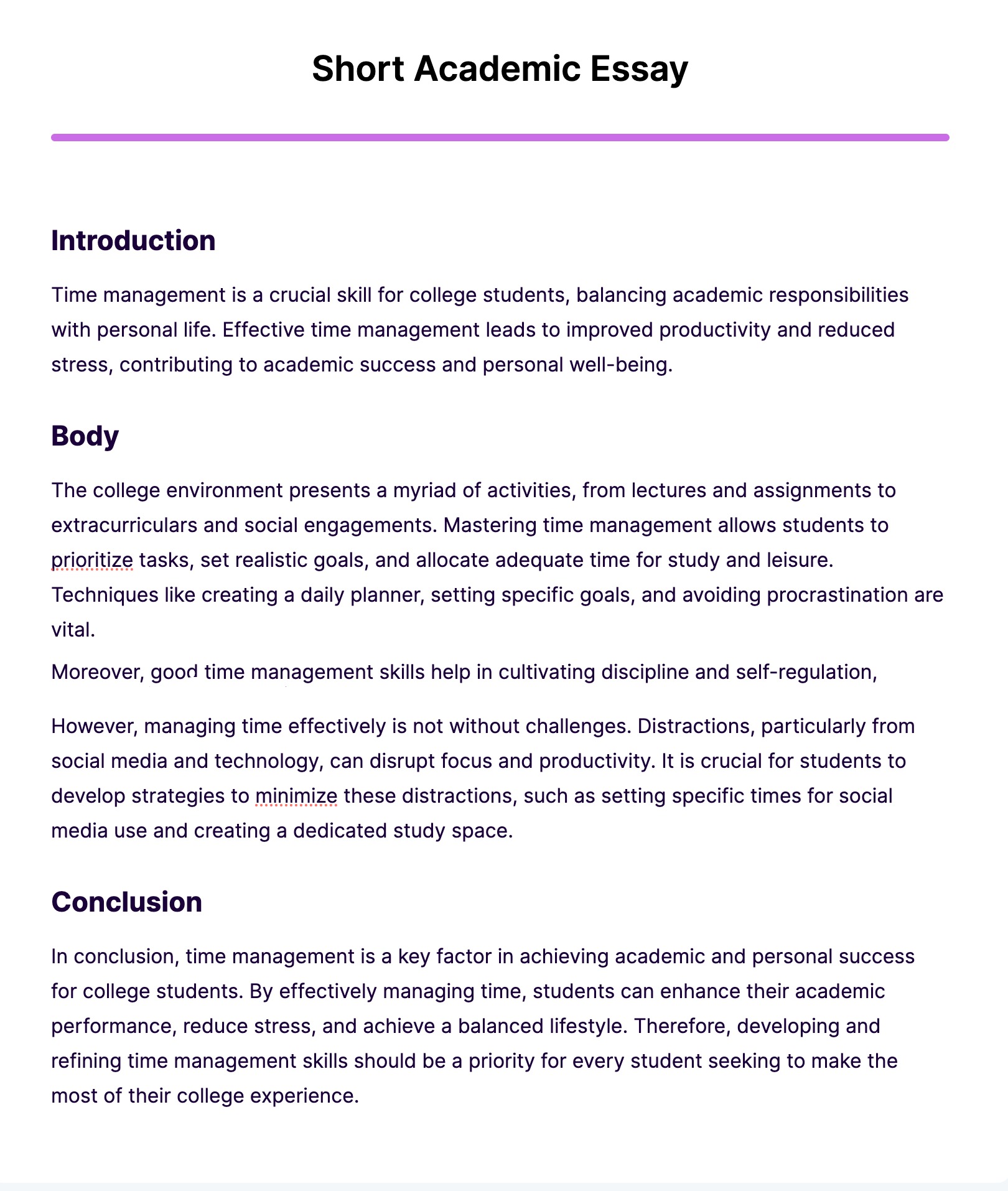
4. Academic Essay Template
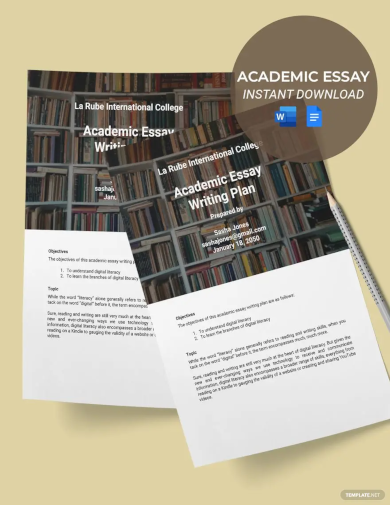
5. Academic Writing Essay Template
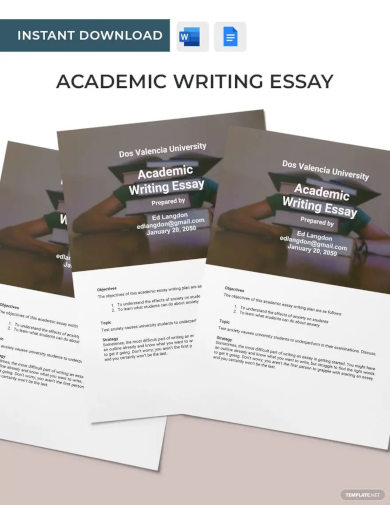
6. Academic Text Example Essay Template
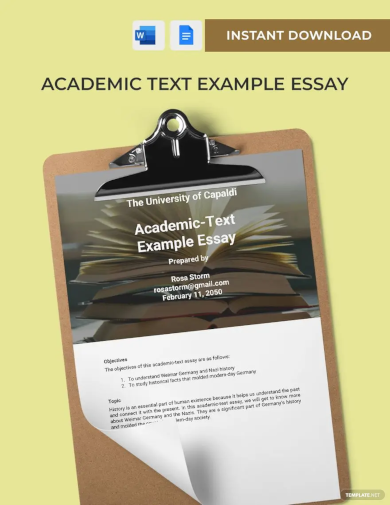
7. Academic Essay Writing Examples
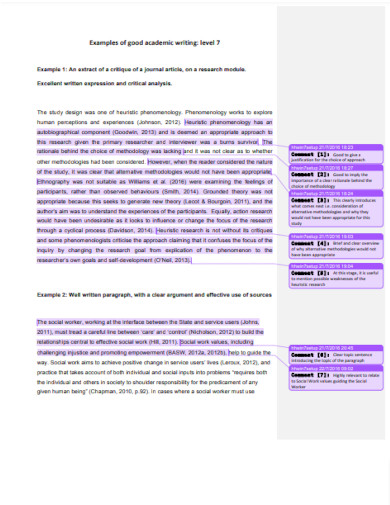
academic-skills.health.herts.ac.uk
8. Academic Essay for College Students Examples
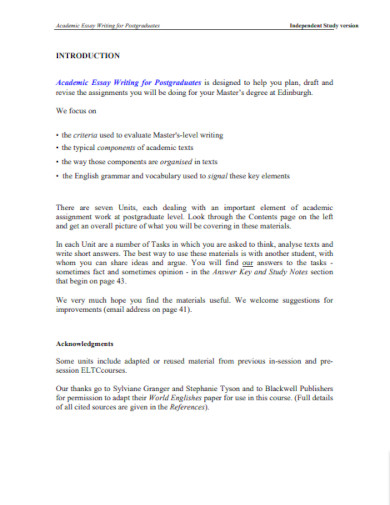
9. Narrative Academic Essay Examples
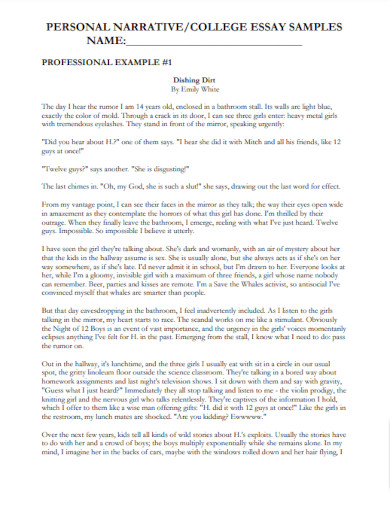
learning.hccs.edu
10. Sample Academic Essay Format Example
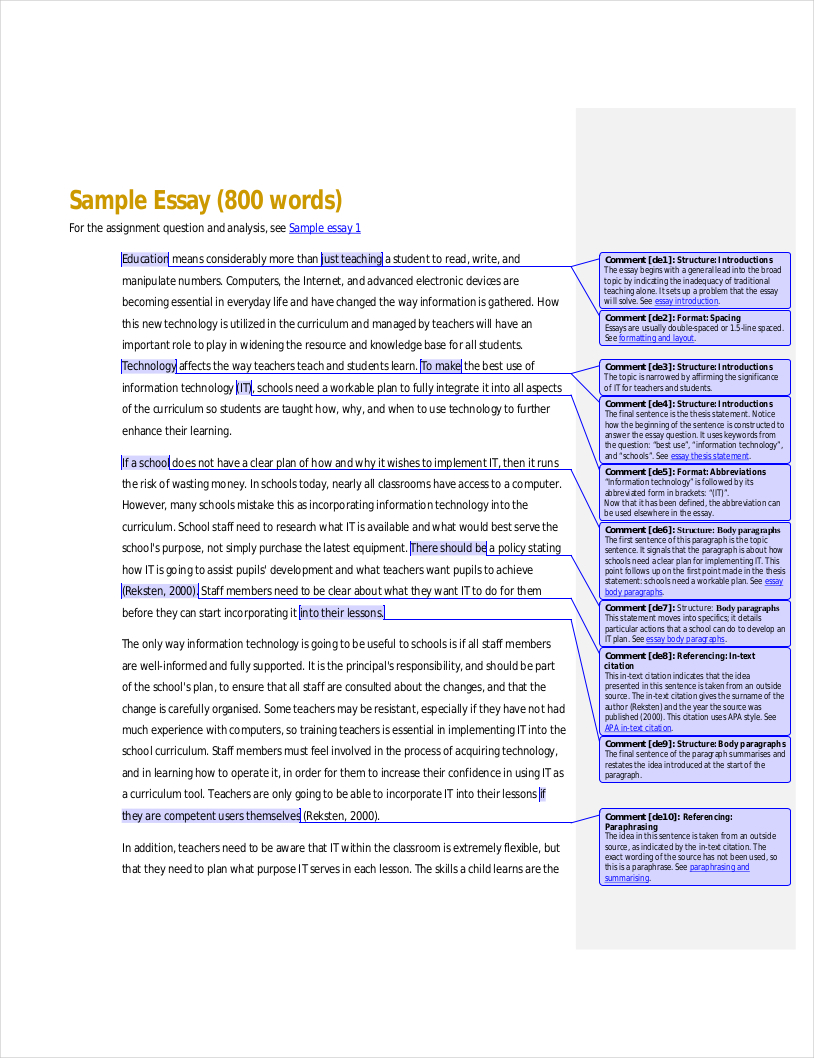
owll.massey.ac.nz
11. Academic Paper Essay Example
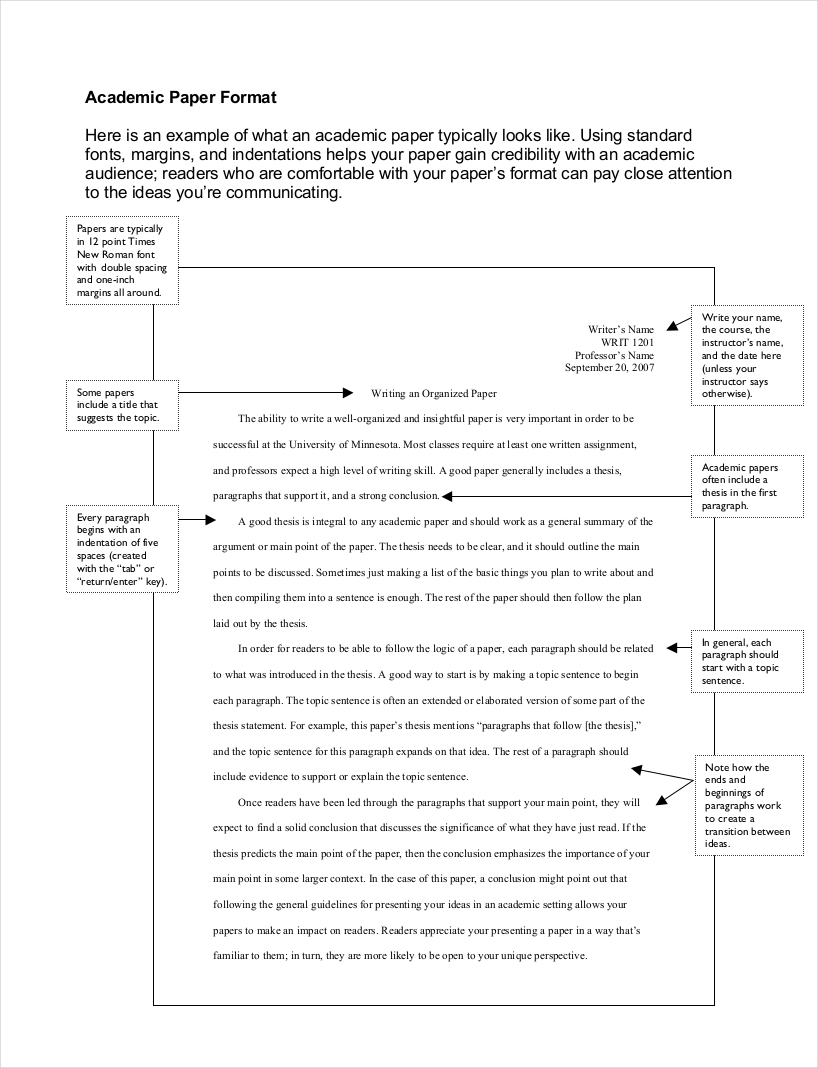
writing.umn.edu
12. Simple Academic Essay Example
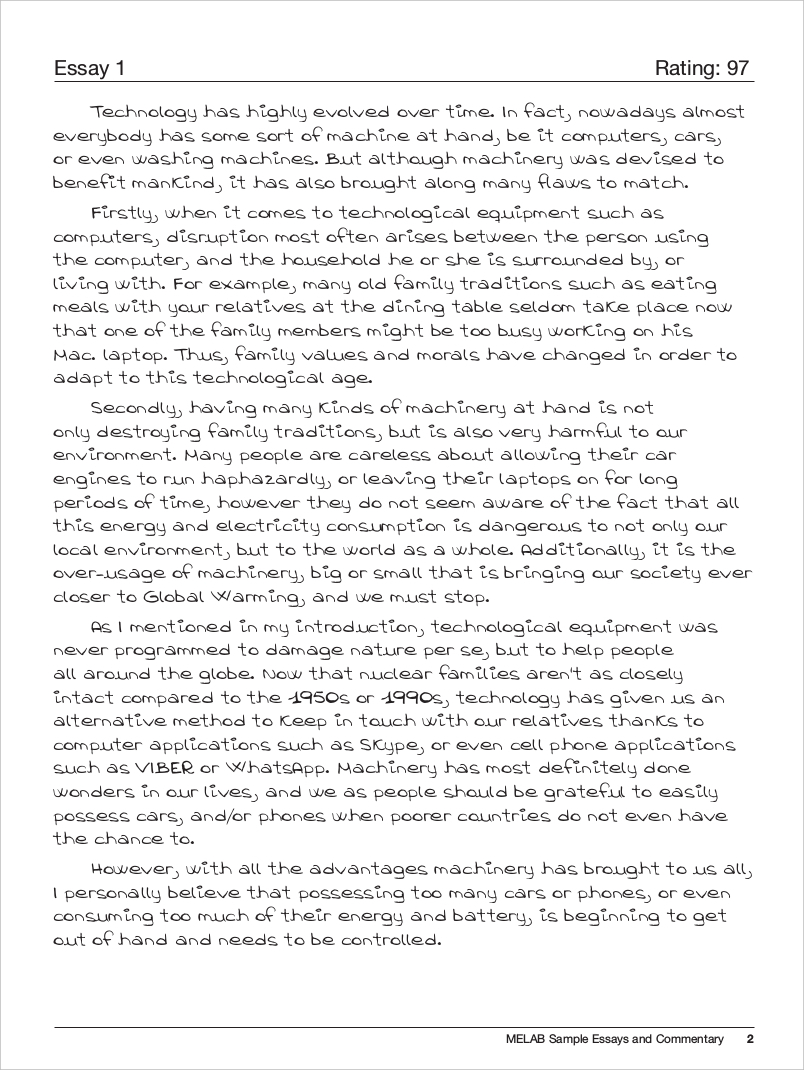
cambridgemichigan.org
13. Academic Essay Sample Structure Example
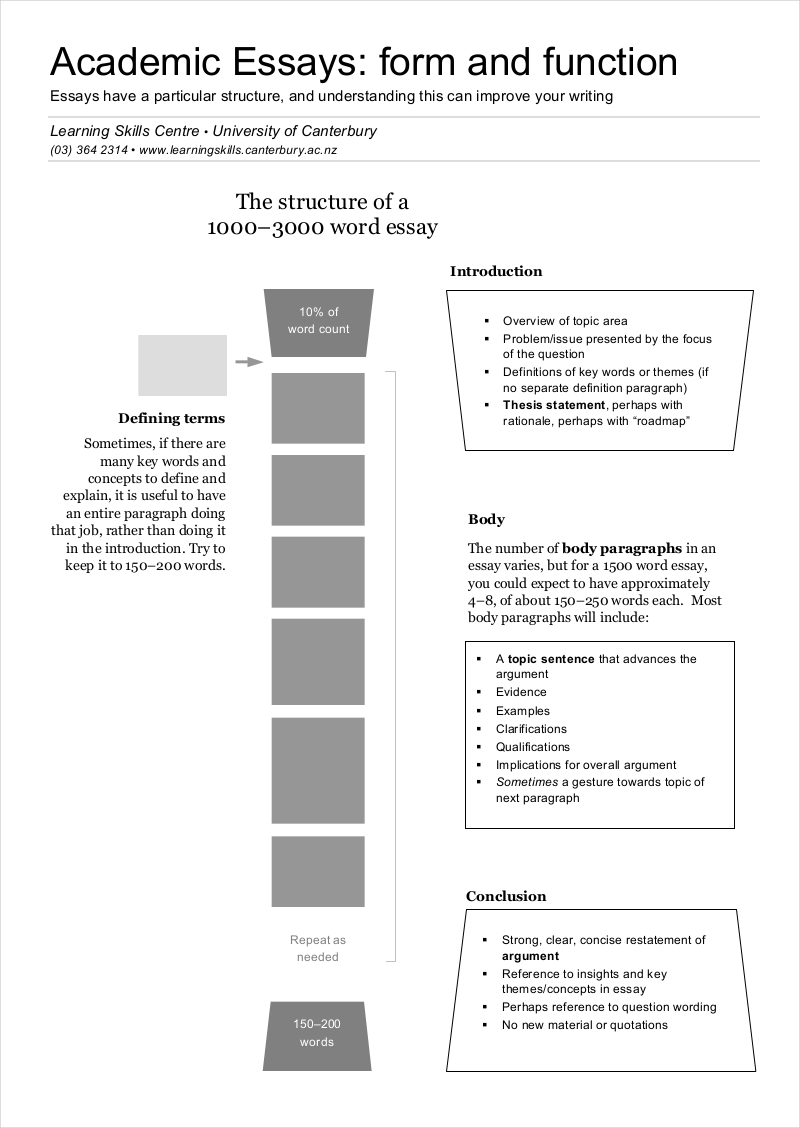
lps.canterbury.ac.nz
14. Short Academic Essay Example in PDF
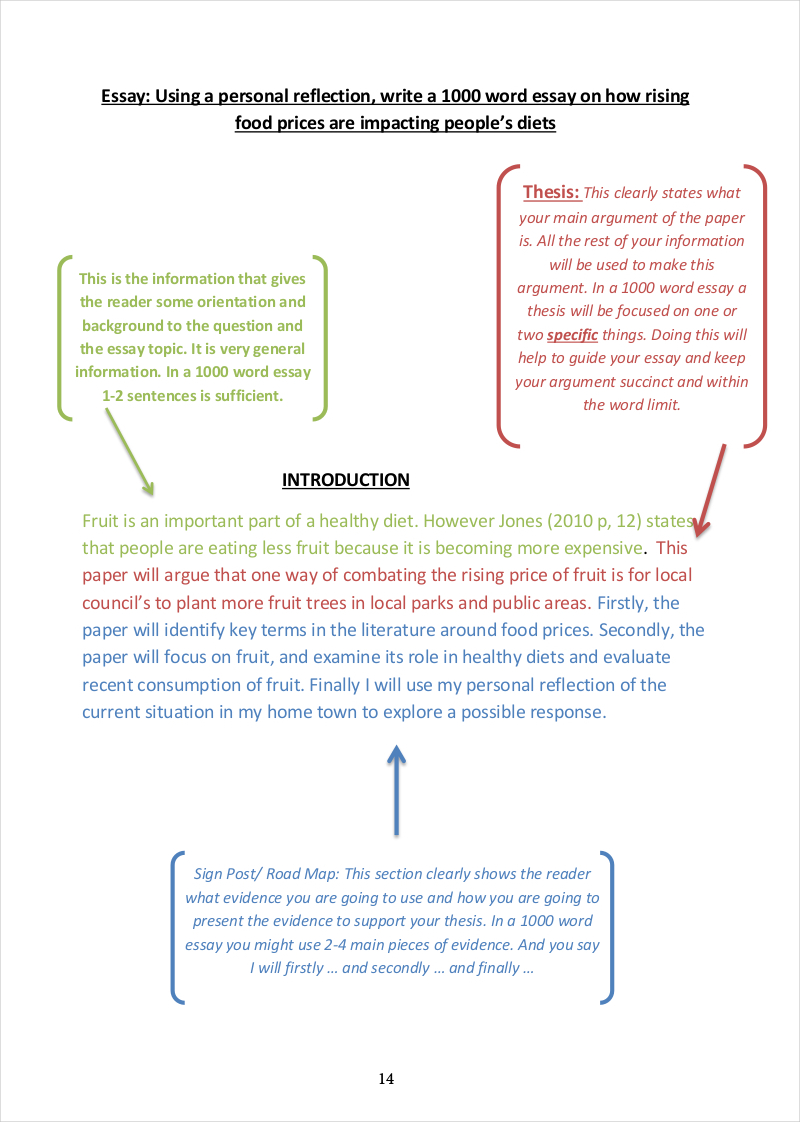
15. Free Printable Academic Essay Sample
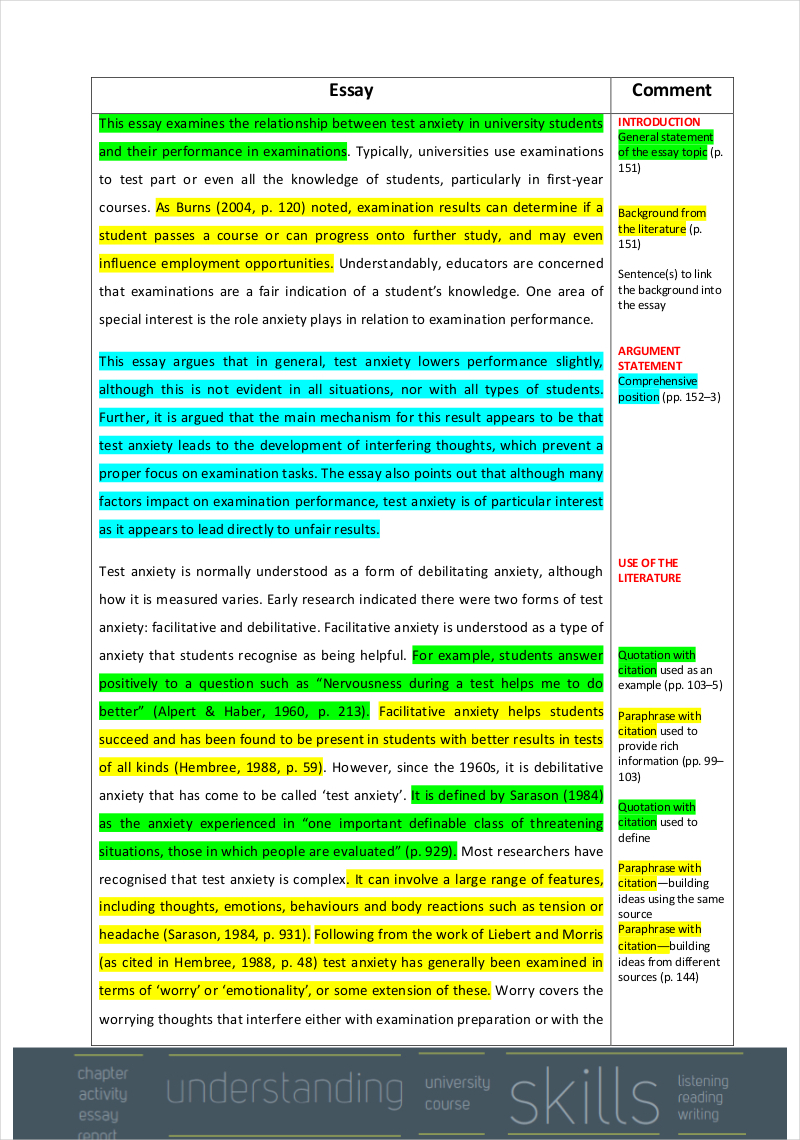
lib.oup.com.au
16. Sample Academic Essay Example
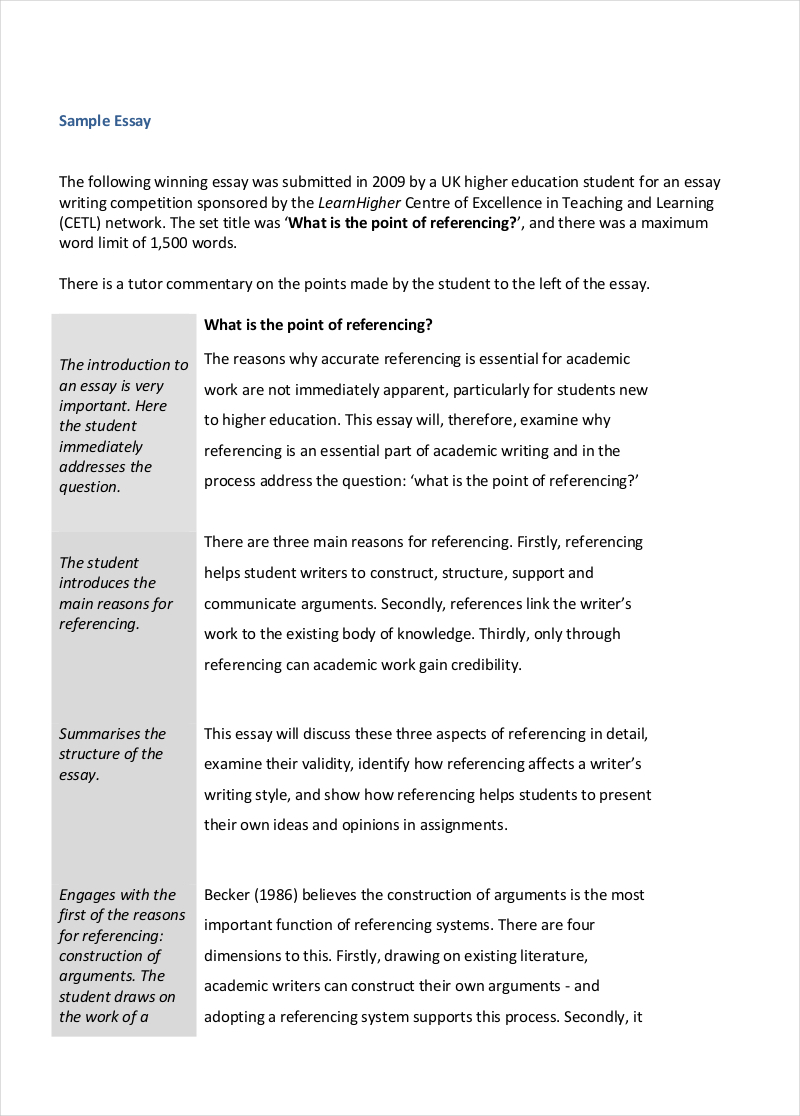
17. Academic Essay Writing Sample Example
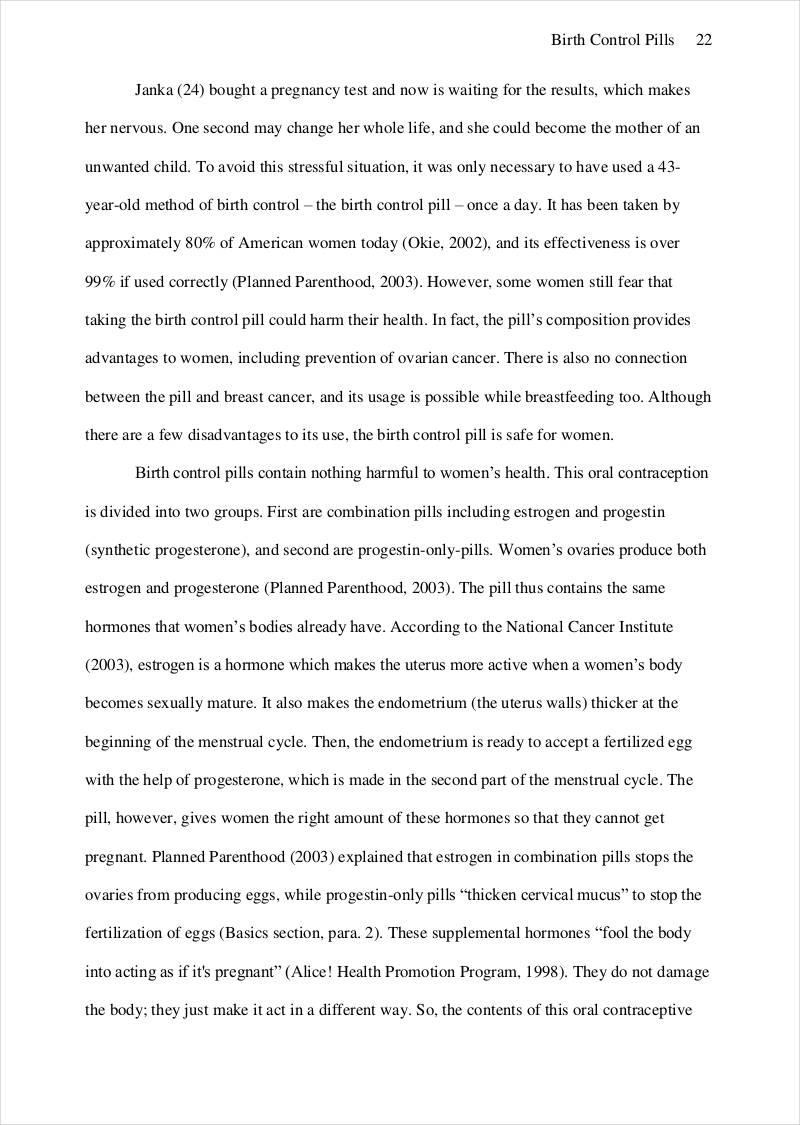
18. Free Academic Essay Sample Guide
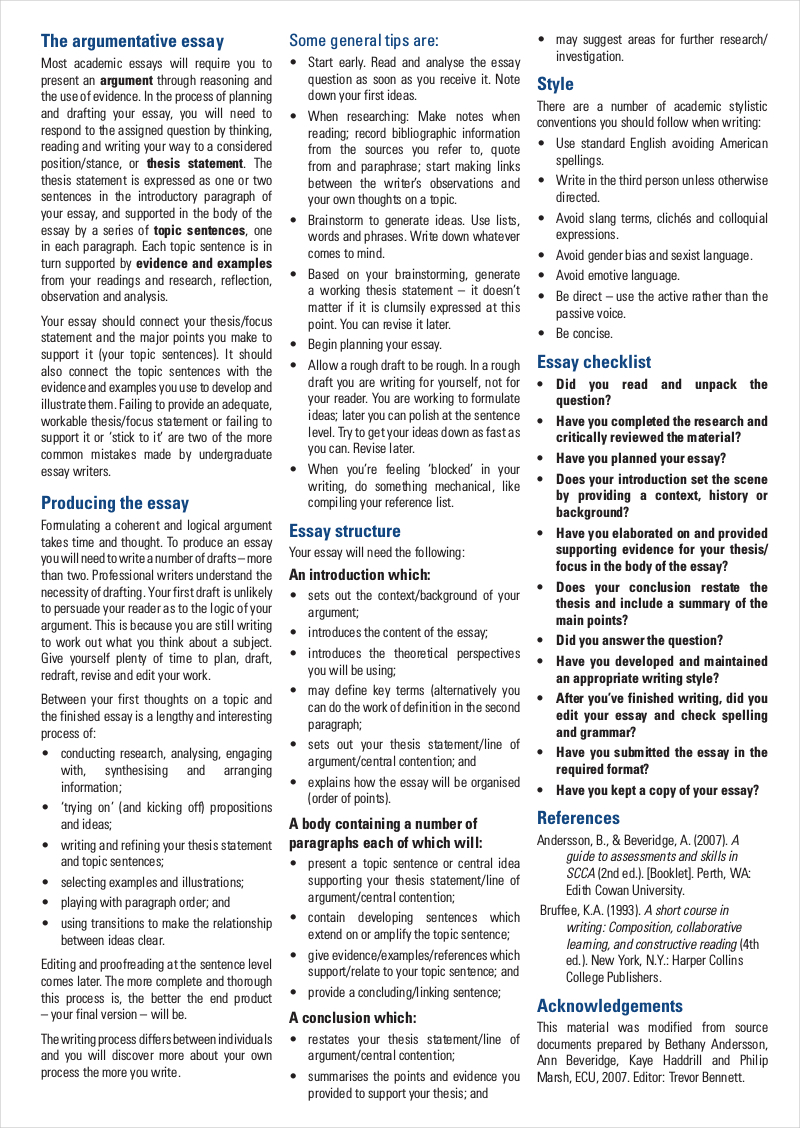
intranet.ecu.edu.au
19. Sample Academic Essay Outline
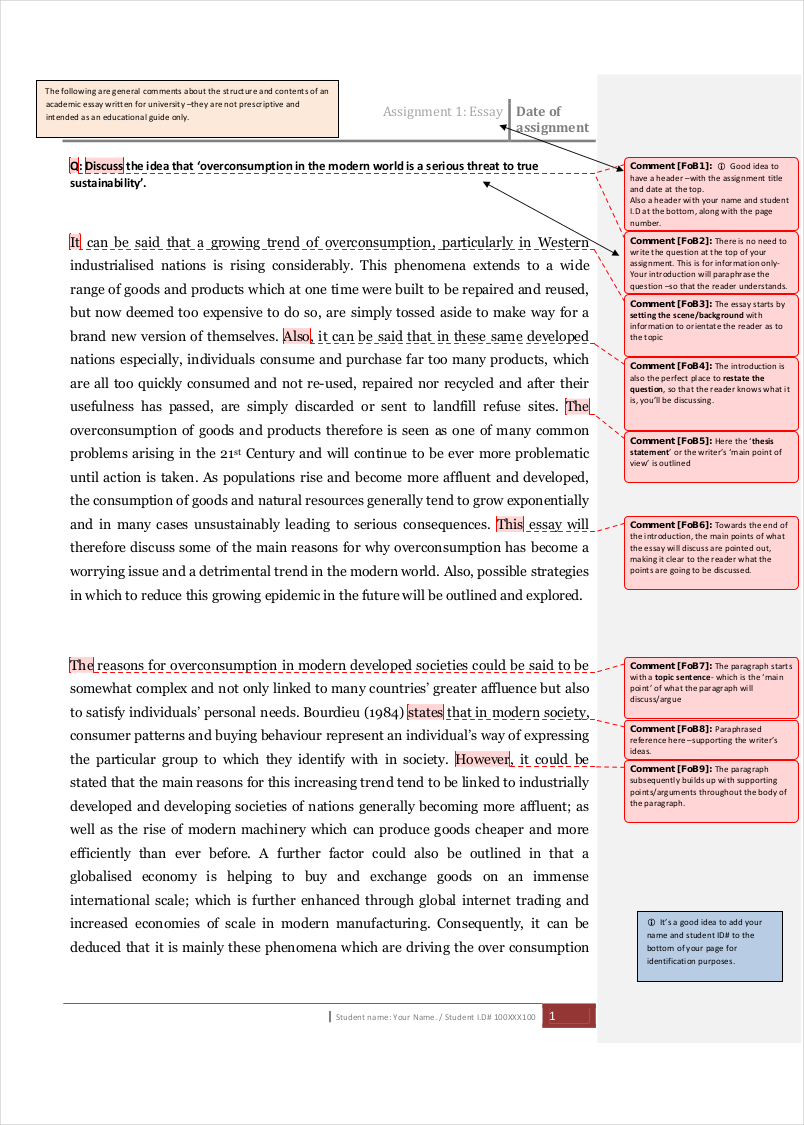
lib.uts.edu.au
Are You Ready and Prepared to Create an Academic Essay?
Different types of academic writing require an individual to have a clear thought process within the entirety of idea development. You have to be focused on what you would like to achieve your final written output so you can incorporate successful guides and processes within the activity. Some of the things that you can talk about in an academic essay include the following:
- Human behavior, characteristics, and emotions
- Community relations
- Natural occurrences
- Language and its effective usages
- Culture and the arts
- Academic researchers
- Relevant cultural phenomenon
- Photography and other artistic undertakings
- Human interactions
- Other subjects that are related to education and academics
Knowing the subject of your article is only one of the initial things that can help you prepare during the writing process. Here are some ways on how you can be ready to write your academic essay:
- You need to have an order of writing that can easily showcase the flow of your thoughts. You must ensure that you can easily connect with your readers or audience so they can respond to the content of your article. Your academic essay should evoke an emotion that is necessary to spark other ideas, opinions and other kinds of responses.
- You need to be aware that academic essays differ depending on the educational or academic discipline where they will be used. There are certain ways that are necessary to be followed in various fields for an academic essay to be deemed effective. With this, always be mindful of the directions or instructions were given to you by the entity who requires you to write an academic essay.
- You do not need to pattern your writing to the works of others. You can be ready even by just knowing your subject and researching about it. The style of writing that you have can give the most difference to how you write and how you present your work. Always keep in mind that your academic essay should be playful – it must not bore your audience.
- You must think of your academic essay as an enterprise by using scholastic writing approaches. The conversation that you can create with your readers must be relevant to what is happening nowadays or for the study that specific student groups need. Being able to give focus on the relativity of your written work can make it easier for readers to understand why your academic essay is important within the academic field.
- You should ensure that your thesis statement is precise, concise, and strong. When you are in the process of developing your academic essay’s thesis, you need to make sure that you are not just basing your write-up on unreliable information. Always refer to evidence, facts, and real data as it can help you strengthen your claims. More so, do not forget to reference your essays when necessary.
Things to Remember When Identifying the Purpose of Your Academic Essay
An academic essay always has to be relevant. It needs to be beneficial to a specific group or to the majority of the academic community. The motive of your essay is very important to be considered as it can identify whether you can be of help to the people who need a particular educational reference. Here are a few things that you need to remember when identifying the purpose of your own academic essay:
- Do not create an academic essay just for the sake of passing it. Your academic essay is more than an assignment or a project. There are some last minute essay writing activities that are done in various fields especially if students think that an academic essay is just a part of their requirements. However, what these students do not know is that an academic essay is a representation of themselves. It showcases the thoughts of the students, what they have learned may it be in class or through self-discovery, and how they are impacted by certain issues and subjects of discussion. This is where the value of a Free Essay and an Informative Essay becomes evident, as both types of essays encourage students to express their understanding and insights on a given topic freely and informatively.
- Be precise with the purpose of your writing. An academic letter is not just a document that can showcase your mastery when it comes to a particular academic subject. It can talk about a specific subject or it can also be a general paper that can provide a lot of information about your experiences and/or insights. This is where the importance of a Self-Introduction Essay comes into play, allowing you to present a personal narrative that reflects your academic journey and achievements. Similarly, an Expository Essay helps in laying out facts and an unbiased analysis of a topic, further enriching the academic discourse. If you will have a precise purpose when writing an academic essay, there is no doubt that your essay will not be pointless.
- Always think of the best case that can help you represent your thoughts. Your style of writing, as well as the entire document’s format and content, can help you realize your ideas. This includes the succinctness and clarity often found in a Short Essay , where the challenge is to convey your thoughts within a limited word count effectively. Similarly, a Scholarship Essay requires you to articulate your achievements and aspirations in a way that resonates with scholarship committees, demonstrating your potential and need for financial support. With this, your point of writing can easily be identified by readers. Being able to present your purpose the best way possible can add up to the success of your academic paper.
Developing an Academic Essay
For you to be able to persuade your readers with the content of your academic essay, there is a need for you to present a structure that can easily identify your claims, arguments, observations, and/or factual presentations. Integrating a Student Essay can demonstrate the personal perspective or learning journey of an individual, making your arguments more relatable. Similarly, incorporating a Travel Essay could enrich your essay by providing unique insights and observations from different cultures or environments. Being clear about how you present your idea is essential for people to see the context of your academic essay.
If you have an organized manner of putting together the concepts of your academic essay, then validating your thesis statement can be more evident. To avoid common essay mistakes and other negative factors that can affect your desired output, here is a basic guide on how you can develop your own academic essay:
- Start by creating a strong thesis statement. Identify your stand and make sure to strictly present evidence that can help you claim its authenticity and validity. Reveal evidence after your thesis statement presentation. Your thesis statement serves as your introduction speech . It lets your readers know the topic of your academic essay and what they can expect from the entire article.
- Establish the context of your essay after your thesis statement. The way that you approach your topic can let readers know whether it is the specific approach that they also need for their undertakings. There are different contexts that can be used within the same subject, so you have to make sure that you will be clear when it comes to identifying the part of the topic that you are going to talk about. This clarity can be achieved through a Descriptive Essay , where vivid descriptions and details about the topic can enlighten and engage the reader. Additionally, understanding the Parts of an Essay is crucial in structuring your thoughts and arguments effectively. Limiting your topic discussion can help you give more focus to what is important for your discussion, ensuring that each part contributes meaningfully to the whole.
- Create the next paragraphs based on the data that can support your thesis statement. The body of your academic essay can be based on your observations, reviews, statements and research outputs. You can present these items separately through the usage of various paragraphs. However, there are instances where it will be better if you can combine or compare to evidence to make your statements more effective.
- Conclude. Your conclusion is as important as your introduction. If you believe that you have created a strong introduction, you have to maintain that until the end of your academic essay. Sum up all the information that you have presented so that people can identify whether your conclusion has lived up to the content of what you have written. Your conclusion can also be used to assess whether your thesis statement has been carried within the entirety of your discussion.
Importance of a Well-Defined Thesis Statement in an Academic Essay
A thesis statement is a paragraph or a set of paragraphs that identifies your stand about your subject. There is a need for this statement to be created as it can affect the entirety of your academic paper. Here are some of the reasons why it is important to develop an effective thesis statement before and while writing your academic paper:
- Your thesis statement is a reflection of your actual idea. This helps you present the point that you would like to make and the message that you actually want to disseminate to your readers. Through a thesis statement, you can organize the evidence that are relevant to your claims based on their relevance to the topic and how you view it as a writer.
- Your thesis statement can guide you within the entirety of your writing processes. Just because you have already done an initial thesis statement does not mean that you are going to fully stick with it until the end of your writing. There are instances where thesis statements are developed or even changes during the creation of an academic essay depending on how the research about the topic has evolved.
- Your thesis statement can allow you to establish originality. Since your academic essay can be based on your research findings and observations, your thesis statement can be your platform to specify what you have come up with. Through a well-defined thesis statement, you can set your output apart from other essay examples that have been written by professionals and other entities in the field of academics.
- Your thesis statement is one of the items that the audience will look at when referencing for credibility and validity. Academic essays need to have a strong initial impact on readers. This statement can help them be focused on a particular standpoint which can enlighten them about your views and opinions, and how these are essential to be considered.
- Your thesis statement can help your readers immerse in your academic essay. The material that you will be coming up with can be reviewed by different people. Depending on the field of education where you are currently in, you need to make sure that your readers can see patterns of evidence presented so they can clearly see how you were able to generate and come up with insights. You have to ensure that the thesis statement that you have created contains the most promising thought so you can get the trust or even the acceptance of your readers about your academic essay’s subject.
Guidelines in Writing an Academic Essay
The course materials that you need to talk about within an academic essay can reflect your level of understanding about the subject. Simply put, an academic essay can be an evidence of the depth of your research procedures and all the other activities that you have executed so that you can support the content of your written output. Listed below are some of the guidelines that can be useful to your academic essay writing processes.
- Always analyze your essay prompt or the question that you need to answer or explain. You have to know whether you are tasked to argue, analyze, or discuss the topic. There will be times where you also need to compare the items present in your subject or explain the underlying factors that can affect your topic.
- Make sure that you will research about what you will write about . Your academic essay can only be fully-maximized if you can present facts. Primary research may be a helpful bit a more precise review of your research topic can help you gather more information that can be helpful in the development of your content. Always assess your sources of information so you can ensure that they are credible.
- Create a draft so that you will have a guide when writing your academic essay. If you will be organized when writing your academic essay, you can create an output that is well-curated and comprehensive. With this, your academic essay can provide more impact to your readers. This can also help you gather your thoughts first and identify how you can put them all together in the most cohesive and efficient way possible.
If you still do not feel confident in writing your own academic essay from scratch, then you can refer to templates and samples which you can download online. Doing this will allow you to be more familiar with the common content and basic formats that are usually seen in an academic essay. When using a template as a guide, always make sure that it is applicable to the study that you are practicing or the academic field or discipline where you will use your academic essay.
As a student, there will always be an instance where we will be required to write an academic essay. If you want to create an academic essay that is both outstanding and relevant, always put the items that we have discussed above in mind.
Setting the Stage for Essay Writing Success
- Understand the Assignment: Carefully read and comprehend the essay prompt or assignment to grasp its requirements and objectives.
- Topic Selection: Choose a relevant and interesting topic that aligns with the assignment.
- Research: Gather credible sources and information related to your topic. Take thorough notes and document your sources.
- Thesis Statement: Develop a strong, clear, and concise thesis statement that presents the main argument of your essay.
- Outline: Create an outline that organizes your essay into sections, including the introduction, body paragraphs, and conclusion. Each section should have a clear purpose.
- Writing Draft: Begin writing your essay, keeping the introduction engaging, and ensuring each body paragraph addresses a single point or idea supported by evidence.
- Citations: Properly cite sources as you write, following a recognized citation style (e.g., APA, MLA).
- Edit and Revise: Review and revise your draft, focusing on grammar, clarity, coherence, and organization.
- Proofread: Carefully proofread your essay for errors in spelling, punctuation, and sentence structure.
- Final Review: Double-check that your essay fulfills the assignment requirements, including formatting, citations, and references.
How do you write an academic essay?
- Understand the Assignment: Read the essay prompt or assignment thoroughly to grasp its requirements and objectives.
- Research: Gather relevant sources and information from books, articles, and credible online sources.
- Plan and Outline: Create an outline with an introduction, body paragraphs, and a conclusion. Each section should have a clear purpose.
- Thesis Statement: Develop a strong thesis statement that presents the main argument of your essay.
- Introduction: Start with a compelling hook, provide background information, and present your thesis statement.
- Body Paragraphs: Each paragraph should focus on a single point or idea, supported by evidence or examples. Use topic sentences to introduce the main idea of each paragraph.
- Citations: Cite sources properly using a recognized citation style (e.g., APA, MLA, Chicago).
- Analysis and Critical Thinking: Analyze and evaluate the evidence or arguments presented, and make connections between them.
- Transition Sentences: Use transition words and phrases to connect ideas between paragraphs.
- Conclusion: Summarize the main points, restate the thesis, and provide a thoughtful conclusion that leaves a lasting impression.
Academic Essay Characteristics
Academic essays are distinguished by several key characteristics that set them apart from other types of writing. These features ensure that essays meet the rigorous standards of academic discourse and contribute effectively to scholarly conversations. Here are the primary characteristics of academic essays:
- Clear Purpose : An academic essay is written with a clear purpose, often to argue a point, present an analysis, or discuss a research finding. The purpose guides the structure and content of the essay.
- Structured Format : It follows a structured format with an introduction, body paragraphs, and a conclusion. This organization helps present arguments and evidence in a coherent and logical manner.
- Thesis Statement : A distinctive feature is the thesis statement, a concise summary of the main argument or claim, usually found at the end of the introduction. It sets the direction for the entire essay.
- Critical Analysis : Academic essays involve critical analysis of ideas, texts, or situations. Writers assess evidence, debate viewpoints, and use logic to develop their arguments.
- Evidence-Based Arguments : Claims made in academic essays are supported by evidence from credible sources. This includes data, statistics, research findings, and quotations from experts.
- Formal Tone and Style : The writing adopts a formal tone and style, avoiding colloquial language, personal anecdotes (unless relevant), and slang. It maintains an objective and professional voice.
Types of Academic Writing
Academic writing encompasses a variety of types, each serving a specific purpose and adhering to a particular format. Here are some of the main types of academic writing:
- Descriptive Writing : This type focuses on describing a character, event, or situation in detail. It’s often used in reports or descriptive essays, where the goal is to provide a clear picture of the subject to the reader.
- Analytical Writing : Analytical writing breaks down complex information into smaller components for better understanding. It involves comparing and contrasting, classifying, and analyzing causes and effects. This type is common in research papers and literature reviews.
- Persuasive Writing : Persuasive writing aims to convince the reader of the writer’s viewpoint or argument. It is characterized by a strong thesis statement, clear evidence, and logical reasoning to persuade the reader. Opinion pieces, argumentative essays, and proposals often employ persuasive writing.
- Expository Writing : Expository writing is used to explain or inform the reader about a specific topic in a clear, concise, and logical manner. It focuses on presenting facts, statistics, and examples without the writer’s personal opinions. This type includes most essays, many types of reports, and certain types of research papers.
- Reflective Writing : This type involves the writer reflecting on their personal experiences, thoughts, or feelings regarding a particular subject or experience. Reflective writing is subjective and is often used in journals, blogs, and reflection essays in educational settings.
- Critical Writing : Critical writing evaluates and critiques the work of others, such as books, articles, or artworks. It involves assessing the strengths and weaknesses of arguments, evidence, and methodologies. Literature reviews, critique essays, and certain types of research papers often require critical writing.
- Narrative Writing : Although less common in strict academic settings, narrative writing is used in certain disciplines to tell stories or describe events chronologically. Personal statements and some types of qualitative research may employ narrative writing to convey experiences and observations.
- Report Writing : Reports convey information from a writer to a reader, focusing on facts and evidence. They are structured and include sections like an introduction, methodology, findings, and conclusions. Lab reports, business reports, and technical reports are examples of this type.
Academic Writing Principles
Academic writing is governed by a set of core principles designed to ensure clarity, precision, and rigor in scholarly communication. Understanding and adhering to these principles is essential for effective academic writing. Here are the key principles:
- Clarity : Writing should be clear and understandable, avoiding unnecessary jargon and complexity to ensure that the reader can easily follow the argument or narrative.
- Coherence : The text should be logically organized, with a clear structure that guides the reader through the argument or discussion. Each part of the writing should connect to the others in a meaningful way.
- Conciseness : Academic writing should be concise, conveying ideas in as few words as necessary. This does not mean oversimplifying, but rather avoiding redundancy and verbosity.
- Objectivity : Writers should strive for objectivity, presenting information and arguments based on evidence rather than personal opinions or biases. This includes acknowledging counterarguments and limitations.
- Precision : Precision involves using the exact words to convey your meaning and being specific about your claims, evidence, and references. This also means accurately citing sources and providing specific data when necessary.
- Evidence-Based Argumentation : Arguments should be supported with appropriate evidence, such as data, examples, and citations from authoritative sources. This principle underscores the importance of research and verification in academic writing.
- Formality : The tone of academic writing is formal, which means avoiding colloquial language, contractions, slang, and humor. Formality also involves using the passive voice where appropriate and avoiding personal pronouns when making general arguments.
- Citation and Referencing : Proper citation and referencing of sources are fundamental to academic writing. This practice not only gives credit to original authors but also allows readers to verify sources and understand the basis of the evidence presented.
- Originality and Plagiarism Avoidance : Academic writing must be original and free from plagiarism. This means that writers should produce their own work based on their research and ideas and appropriately cite any sources they use.
- Critical Thinking : Effective academic writing reflects critical thinking, challenging assumptions, evaluating evidence, and synthesizing ideas from various sources to offer new insights or perspectives on a topic.
How do you start an academic essay sample?
Begin an academic essay sample with a captivating hook, provide context on the topic, and conclude the introduction with a clear and concise thesis statement that outlines your main argument.
What is the opening line of an academic essay?
The opening line of an academic essay should engage the reader’s interest, introduce the topic, and provide a sense of the essay’s focus and importance.
What not to write in an academic essay?
In an academic essay, avoid personal opinions, emotional language, unsubstantiated claims, informal language, and plagiarism. Focus on evidence-based arguments and adhere to academic standards and conventions.
How do you write an academic essay quickly?
To write an academic essay quickly, start with a clear thesis, outline main points, research efficiently, focus on key evidence, and minimize editing while maintaining proper citations and structure.
Text prompt
- Instructive
- Professional
Write an academic essay on the impact of technology in education
Explain in an academic essay how climate change affects global agriculture
This website is intended for healthcare professionals

- { $refs.search.focus(); })" aria-controls="searchpanel" :aria-expanded="open" class="hidden lg:inline-flex justify-end text-gray-800 hover:text-primary py-2 px-4 lg:px-0 items-center text-base font-medium"> Search
Search menu
Academic essays part 1: the importance of academic writing.
John Fowler
Educational Consultant, explores how to survive your nursing career
View articles
John Fowler, Educational Consultant, explores academic writing
How confident are you in your ability to write academic essays? If you are a student nurse in your first year of training then your answer will depend largely on your previous success, or not, in GCSEs, A levels and the equivalent. If you entered nursing via an alternative route that had less emphasis on traditional academic preparation, then your confidence in writing an essay that draws on referenced literature will probably be much reduced. Even if you were quite strong at school or college work, you may find the transition to self-directed degree study quite difficult. If you are a qualified nurse with a pre-registration diploma or degree, returning to university study to complete a post-registration master's degree, you may still have reservations about your ability to re-engage with academic writing. If you are confident of your ability to communicate nursing theory and its application to clinical care, then this series of articles is probably not for you! However, my experience of teaching nurses, from first-year students to specialist nurses undertaking PhDs, is that very few are confident in their academic writing skills.
Register now to continue reading
Thank you for visiting British Journal of Nursing and reading some of our peer-reviewed resources for nurses. To read more, please register today. You’ll enjoy the following great benefits:
What's included
Limited access to clinical or professional articles
Unlimited access to the latest news, blogs and video content
Signing in with your registered email address
Introduction to Academic English

Academic English is a specialized form of the English language used in academic settings, including schools, colleges, universities and research institutions. It encompasses a range of skills necessary for writing, reading, speaking and understanding complex and formal content. Unlike conversational English, which is often informal and colloquial, Academic English is characterized by a formal tone, precise vocabulary, and structured formats.
Key features of Academic English
Formal tone and structure.
Academic English avoids slang, contractions and colloquial expressions. It favours a formal tone and follows a clear, logical structure. Sentences are often longer and more complex than in everyday conversation. For instance, instead of saying "kids," an academic text would use "children" or "adolescents."
Specific vocabulary
Academic writing uses discipline-specific terminology and a formal vocabulary. For example, in a biology paper, terms like "photosynthesis," "cellular respiration" and "mitochondria" are commonly used. This precise language helps convey complex ideas clearly and accurately.
Objective language
Academic English prioritizes objectivity and neutrality. Personal opinions and biases are minimized. Instead of saying, "I believe the experiment was a success," a researcher might write, "The experiment yielded successful results, as evidenced by the data."
Critical thinking and analysis
Academic English requires critical thinking and analytical skills. It involves evaluating sources, constructing logical arguments, and synthesizing information from various texts. For instance, in a literature review, a student might compare different authors' perspectives on a topic and analyze their methodologies and conclusions.
Examples of Academic English
Essay writing.
Academic essays follow a specific format, including an introduction, body paragraphs and conclusion. Each paragraph should have a clear main idea, supported by evidence and analysis. For example, a history essay might begin with an introduction that outlines the main argument, followed by body paragraphs that provide evidence from primary and secondary sources, and a conclusion that summarizes the findings and their implications.
Research papers
These are detailed and structured documents that present original research findings. They include sections such as an abstract, introduction, literature review, methodology, results, discussion and references. For instance, a psychology research paper might investigate the effects of sleep deprivation on cognitive performance, detailing the experimental design, data collected and interpretation of the results.
Presentations
Academic presentations involve delivering information clearly and effectively, often supported by visual aids like slides. They require clear organization and a formal speaking style. For example, a presentation on climate change might include sections on the causes, effects and potential solutions, with data visualizations to support key points.
Reading and comprehension
Academic reading involves understanding and analyzing complex texts. This includes identifying the main arguments, evaluating the evidence, and noting any biases or assumptions. For example, reading a scientific journal article requires attention to detail and the ability to understand specialized terminology and concepts.
Academic English is essential for success in higher education and professional fields. It allows individuals to communicate complex ideas effectively, engage in critical analysis, and contribute to academic discourse. Mastering Academic English involves practice and familiarity with its formal tone, specific vocabulary, and structured formats. Whether writing an essay, conducting research or presenting findings, proficiency in Academic English is a valuable skill that enhances clarity, precision, and credibility in academic and professional contexts.
More Academic English articles
- Citation Styles This article explains the three most common citation styles used in research papers with an example for each.
Recommended Academic English links
- Academic English - Wikipedia
- What is Academic English? - Open University
Always remember that you are absolutely unique. Just like everyone else. Margaret Mead

- Deakin Home
- Student news
- StudentConnect
- Help and contact us
Academic skills
Use these academic skills guides to help you develop your academic and study skills.
New to Deakin?

Study planners

Study skills
General study skills.
- Academic integrity
- Evaluating sources
- Critical thinking, reading and note taking
- Participating in discussion
- Collaborating online
- Communicating online
- Reflective learning
- Academic style
- English language development
- Using sources
- Referencing
- Drafting and proofreading
- Responding to feedback
- HDR Study support
- Improving English as an additional language
- Maths Support Resource Centre
Assessment skills
Preparation.
- Trimester and weekly planners
- Study workload planner
- Organising your studies
- Learning online
- Assessment planner
- Faculty specific maths support
- Scientific reports
- Reflective writing
- Oral presentations
- Annotated bibliography
- Literature review
- Preparing for exams and end-of-unit assessments
- Exam confidence
- Relaxation techniques
Book an appointment with a language and learning adviser; or First Nations students can book with the First Nations academic support links
- Book an appointment
- First Nations Academic Support bookings
- Email First Nations Academic Support
We use cookies to improve your experience. You consent to the use of our cookies if you proceed. Visit our Privacy policy for more information.

AI paraphrasing detection: Strengthening the integrity of academic writing

By completing this form, you agree to Turnitin's Privacy Policy . Turnitin uses the information you provide to contact you with relevant information. You may unsubscribe from these communications at any time.
In the rapidly evolving landscape of academic writing, maintaining integrity is paramount. With the proliferation of AI tools, ensuring originality in submitted content has become increasingly challenging.
In early 2023, Turnitin launched its AI writing indicator and report, leveraging over 25 years of experience in understanding and safeguarding academic writing. Our technology helps create transparency that aids instructors in discerning likely AI-generated content from human-written work. However, the increase of AI paraphrasing tools poses a fresh challenge to academic integrity, prompting institutions to seek proactive measures .
To address this emerging issue, Turnitin is pleased to announce the launch of its new AI paraphrasing detection feature, expanding on the capabilities of our AI writing indicator.
Join us as we uncover Turnitin’s role in advancing student learning, upholding academic standards in both education and research writing, and supporting the academic community as they strive to safeguard their output in the age of AI.
What is AI paraphrasing?
Paraphrasing is the practice of rephrasing or restating someone else's ideas or information using your own words and sentence structures. It is a common technique used in academic writing to present information in a more concise or understandable way while still attributing the original source. Paraphrasing requires a deep understanding of the content and the ability to express it in a new form without changing the original meaning.
On the other hand, AI paraphrasing refers to the process of using AI technology to rewrite text while retaining the original meaning. These AI-powered tools, also known as text spinners, analyze the input text and generate alternative versions that convey the same information using different words or sentence structures.
The ease of access to these tools has raised concerns about academic integrity. Students and researchers may use AI paraphrasing to modify AI-generated content, such as that produced by language models like ChatGPT, in an attempt to evade detection by AI detection software.
How is AI paraphrasing impacting academic integrity?
AI paraphrasing poses a significant risk to academic integrity in that it erodes the principles of academic integrity by promoting deception and dishonesty. It undermines the trust and credibility of educational institutions and devalues the importance of original thought and scholarly discourse.
Masking AI-generated text to evade detection
Writers, including students and researchers, may use AI paraphrasing to modify AI-generated content, making it difficult for AI writing detection software to identify instances of AI-generated text. This practice effectively disguises the source of their content, being a large language model, leading educators and publishers to believe that the work is original.
Shortcut to writing skills
Relying on an AI paraphrasing tool deprives students of the opportunity to develop their writing skills authentically. Instead of engaging in critical thinking and original expression, students may resort to automated solutions, hindering their intellectual growth and academic development. By bypassing the process of crafting original content, students miss out on valuable learning experiences that foster creativity, analytical thinking, and effective communication skills.
How can Turnitin’s new AI paraphrasing detection tool help to uphold academic integrity?
A study conducted by Odri and Yun Yoon ( 2023 ) reveals that while their text sample was written solely by generative AI, seven out of eleven AI writing detection tools (excluding Turnitin) concluded that the text was mainly written by humans. The widespread availability of online text spinners and AI paraphrasing tools has made it easy for writers to manipulate content, which in turn, may not be flagged by AI writing detection tools.
Turnitin's AI paraphrasing detection feature seeks to address this issue by identifying instances where AI paraphrasing may have been used to modify AI-generated text in submitted content, helping publishers and educators to maintain the integrity of research writing and foster authentic learning experiences for students.
Data insights to determine your next course of action
The AI writing report highlights the text segments that our model predicts were likely written by an AI tool. It also highlights AI-generated text that may have been further modified using an AI paraphrasing tool. Assessors can use the data and insights provided by our tool to start a discussion. In the education space, educators can use potential misconduct issues as teachable moments to help students improve their writing skills while developing their critical thinking abilities .
Both AI writing and AI paraphrasing segments are highlighted in different colors to enable educators and other users to interpret results easily. The highlight bar on the right-side of the report further shows the breakdown of content in percentage terms that was likely AI-generated and content that may have been AI-generated or AI-paraphrased.
Integrated into your workflow via the Similarity Report
Turnitin’s AI writing detection capabilities are fully integrated into the Similarity Report, providing our users with a seamless experience. When AI writing detection is enabled, which also includes AI paraphrasing detection, it automatically checks every submission for both AI writing and AI paraphrasing. It shows an overall percentage of the document that was likely AI-generated and an additional score for likely AI generated content that may also have been AI paraphrased. Your AI detection needs sit under one safe, secure, and easily accessible umbrella.

More than just detection
Just as speed cameras discourage drivers from exceeding the speed limit, Turnitin's AI paraphrasing detection acts as a deterrent for students and researchers tempted to misuse AI writing tools, serving as a powerful incentive for upholding academic integrity and engaging in ethical writing and paraphrasing practices.
By integrating AI paraphrasing detection into the submission process, Turnitin provides educators and publishers with a proactive tool to prevent misconduct before it occurs, thus reinforcing academic integrity and ethical writing practices. AI paraphrasing detection allows instructors to initiate constructive conversations with students about the importance of ethical writing practices and the proper use of paraphrasing techniques.
A tool for human interpretation
Turnitin does not make a determination of misconduct; rather, it provides data for the educators to make an informed decision based on their academic and institutional policies.
Roe and Perkins ( 2022 ) argue that, by relying solely on technical solutions to combat the misuse of AI paraphrasing tools, this may lead to an ongoing arms race. Instead, they advocate for prioritizing training as the most effective strategy for reducing students' use of these tools and enhancing faculty members' ability to detect such usage.
With this in mind, we must emphasize that the data surfaced by our tool should not be used as the sole basis for action or a definitive grading measure by instructors. The information should be used as a data point and can be the first step toward starting a discussion with students and researchers.
How will the release of AI paraphrasing detection impact Turnitin customers?
Customers who license Turnitin Originality with their existing Turnitin integrity solution, and have Turnitin’s AI writing detection capabilities enabled, will gain full access to AI paraphrasing detection as part of their license. iThenticate customers that license Turnitin’s AI writing detection capabilities will also have access to AI paraphrasing detection as part of their license. These capabilities are seamlessly integrated into Turnitin's existing AI writing detection workflow, ensuring no change in the way instructors utilize these tools.
As part of the AI writing detection process, AI paraphrasing detection results will be surfaced within the AI writing report, which is integrated with the Similarity Report and customers' learning management systems (LMS). This ensures that for those with access to the Turnitin AI writing indicator, AI paraphrasing detection will run automatically on every submission. This eliminates the need for additional software or workflows, improving efficiency for our time-strapped customers.
With this integration, there will be no change in workflow. If enabled, instructors will be able to check all submissions for AI writing and AI paraphrasing simultaneously.
Administrators have the flexibility to choose whether or not to enable access to AI writing and AI paraphrasing detection capabilities from their admin settings page for their instructors.
Overview: Strengthening academic writing with AI paraphrasing detection
The proliferation of AI paraphrasing tools to avoid AI detection presents yet another challenge to academic integrity so soon after the launch of generative AI in 2022. Students and researchers who use these tools to evade detection by modifying AI-generated text undermines the credibility of assessments and research.
To address this issue, it's essential for educators to emphasize the importance of originality and critical thinking in academic writing. This can be achieved through educational initiatives that promote proper paraphrasing techniques and discourage reliance on automated solutions. Additionally, institutions can foster a culture of academic honesty by implementing clear guidelines and consequences for plagiarism .
Ultimately, by prioritizing authentic learning experiences and providing support for students to develop their writing skills, we can help mitigate the impact of AI paraphrasing on academic integrity and uphold the standards of scholarly discourse.

- Departments & Offices
- Student Success
- Academic Wellbeing
Specific Skills
The first important point is to recognize the differences between high school and college. Usually, one of these differences is the degree of self-sufficiency and self-motivation expected of you. Your professors expect you to attend class, complete assigned readings (including the problems at the end of the chapter), hand in assignments on time, show up to class on time, and participate. You can only participate if you have pencils, paper, a calculator, and previous notes you have taken. Professors are only human, and they tend to match their level of concern with your level of involvement and effort in their course.
Here are some suggestions for specific areas:
| *adapted from an essay by Larry Leemis, Professor of Mathematics |
| Amazing as it may seem, many Americans appear to consider public speaking a fate worse than death. Fear is a natural human reaction to situations involving public speaking - EVERYONE has it. Fortunately, there are a number of ways to conquer this fear and deliver an oral presentation confidently and successfully.
Choose your topic carefully; if one is not assigned, choose a topic focused enough to stay within the time limit. Create an outline and highlight your main points. After each main point, construct a transition and note instances where examples, demonstrations, or visual aids will be useful.
Your thesis and information should be appropriate for your class/audience. You should present information that is new, but do not under or overestimate their knowledge. Use concrete language and simple, direct phrasing. Use specific examples or analogies that are explained using vivid language. Begin with a hook; then narrow your field of interest until you get to your thesis statement or purpose. Identify it and explain how you will develop it in your presentation. Proceed through the body of your talk point by point, being sure to organize facts as they are relevant to your points. Do not repeat facts. Be sure to cite any outside sources that you use. Summarize your specific points; then broaden your field of interest and conclude with more general statements. Refer back to your thesis. Avoid using phrases like "to conclude" or "in summary" because they sound abrupt and mechanical. Plan out your very last sentence!
Speak extemporaneously. Don't read or memorize your presentation. Have a brief outline of notes which will keep you on track. The most important rule of delivery is PRACTICE, PRACTICE, PRACTICE! When you practice, you should time yourself, use your visual aids, and ask a friend to watch and give you feedback.
A degree of nervousness can help to promote adrenaline flow that is often necessary for delivery of a dynamic and captivating presentation. Here are some guidelines to avoid a mental meltdown: *adapted from an essay by by Sharon Zuber, Director Emeritus of Writing Resources Center |
| Overheard during a campus tour: "The smartest thing you can do is make friends with the librarians. They are nice folks, they know how to find everything, they are very helpful, and using their expertise can save you a lot of time." Don't be afraid to ask questions about how to find what you need before it's crunch time. No one can be expected to navigate the complexity of the library on his or her own. And you don't have to! The staff of the Earl Gregg Swem Library and its branches is dedicated to making you feel comfortable with the library and all it has to offer.
There are even comfortable couches to catch a few winks before that statistics class!
And don't forget the books: Swem Library has almost a million and a half of them. Spend time browsing. Some of the best discoveries come when you don't know what you're looking for. If the heart of a library is its books, then the spirit of a modern library is its electronic collections. Whether searching for current events or topics from the eighteenth century, you can access resources any time of the day or night, from any area, including residence halls, offices, the Sunken Garden, and even study-abroad locations. Finding first-hand accounts of the Lewis and Clark expedition, contemporary reviews of , and advertisements for early telephones are a few computer clicks away. Swem Library is regularly ranked among the best libraries in the country. Spend some time there, and you'll see why. Visit . |
| *adapted from an essay by Randolph Coleman, Professor of Chemistry |
| Learning to write well is a life-long process; however, you can improve your writing if you are open to instruction. The challenge for writers at all levels is to make order out of chaos by moving ideas from their heads to paper and then shaping them for an audience. The following tips can help:
Begin thinking about your topic as soon as it is assigned and schedule writing time long before the paper is due. Make using words a habit of the mind; good writers are good readers. Reading reinforces good spelling, grammar, and structure; you begin to internalize good writing.
Honestly evaluate your writing strengths and weaknesses, then build on your strengths and find strategies to overcome the weak areas.
Begin with your professor (if you aren't starting your paper the night before it is due!). Schedule a consultation at the . |
Follow W&M on Social Media:
Williamsburg, Virginia
- Accessibility
- Consumer Information
- Non-Discrimination Notice
- Privacy & Security
Coding camp helps middle schoolers in Montgomery Co. recover from pandemic setbacks
by Kellye Lynn
MONTGOMERY COUNTY, Md. (7News) — Navika Duvey is a rising seventh grader who is expanding her understanding of coding at summer camp.
"Problem-solving, those skills you learn in math is also in coding," she told 7News.
It's an important connection as Montgomery County Public Schools students and those around the country make slow progress in recovering from pandemic-related academic losses.
READ| Delta struggles with baggage, delays after global IT outage leaves travelers stranded
The national decline in math scores has created what education experts call a data literacy crisis.
"A lot of our students are coming in at different levels, and basically the levels that they’re coming in at they might not have the skills to show their level of performance," explained educator and camp on-site coordinator Yvette Edwards.
For three weeks this summer, more than 800 Montgomery County Public Schools students are strengthening essential critical thinking and problem-solving skills through the Montgomery Can Code camp.
"To have an introduction to Apple Swift coding and learning app design," said Kimberly Bloch-Rincan, Director of ignITe Hub which runs Montgomery Can Code.
The free camp offered at three Montgomery College campuses is also inspiring these middle school students to pursue tech careers.
READ| Target stops taking checks; business expert thinks fighting fraud is the reason
11-year-old Veer Amin hopes to someday work as a robotics engineer.
"I love coding and I think coding’s really important to what you can do ahead in life," he said.
"A lot of computer and AI things are going to be very important in the future so I just want to get ahead of the game," student Wilson Dilone told 7News.
- SUGGESTED TOPICS
- The Magazine
- Newsletters
- Managing Yourself
- Managing Teams
- Work-life Balance
- The Big Idea
- Data & Visuals
- Reading Lists
- Case Selections
- HBR Learning
- Topic Feeds
- Account Settings
- Email Preferences
The Limits of GenAI Educators
- Jared Cooney Horvath

Three fundamental problems with using LLMs as teachers, tutors, and trainers.
While generative AI tools have been heralded as the future of education, more than 40 years of academic research suggests that it could also harm learning in realms from online tutoring to employee training for three reasons. First, the best student-teacher relationships are empathetic ones but it is biologically impossible for humans and AI to develop mutual empathy. Second, AI might help us bypass the boring task of knowledge accumulation but it is only through that process that we develop higher order thinking skills. Finally, digital tools are notoriously distracting and multitasking diminishes learning. As we think about the benefits of new technology, we must also consider the risks.
Since the widely acclaimed release of ChatGPT 4, generative AI has been touted by many as the savior of education. Case in point: British education expert Sir Anthony Seldon has predicted that by 2027, AI will replace human teachers on a global scale.
- Jared Cooney Horvath (PhD, MEd) is a neuroscientist, educator, and author of the best-selling book Stop Talking, Start Influencing: 12 Insights from Brain Science to Make Your Message Stick . He has conducted research and lectured at Harvard University, Harvard Medical School, the University of Melbourne, and more than 750 schools internationally and currently serves as director of LME Global.
Partner Center
Highlights of CFA’s 2023-2024 Academic Year, a Photo Essay

Photo by Will Horne
From captivating and vibrant exhibitions, concerts, and performances both on campus and at renowned venues to impactful conversations and events with our students, alums, and artists around the country, CFA’s 2023-2024 year is one for the books!
As we embark on a new academic year at Boston University College of Fine Arts (and an exciting new chapter at BU with Dr. Melissa L. Gilliam beginning her tenure as the University’s 11th president), we’re taking a moment to reflect on the highlights of CFA’s 2023-2024 year!
Jump ahead to a semester!
summer 2023
spring 2024
summer 2024
SUMMER 2023
Summer destinations cfa, broadway, and abroad.

Stefano Meo as Rigoletto and members of the chorus in Opera på Skäret’s Rigoletto. Photo by Andreas Hylthén

Rigoletto director Leslie Swackhamer (front right) invited Susan Mickey (front left) to design the opera’s costumes. Behind them are the students Mickey brought with her: Duncan Michael (CFA’25) (from left), Gregg Wiggans (CFA’25), Yao Kuang Lee (CFA’25), and Dante Gonzalez (CFA’24). Photo by Andreas Hylthén
Traveling to Sweden for a professional opportunity in costume designing and directing was an experience shared among a handful of BU School of Theatre students last summer. Directing student Gregg Wiggans (CFA’25), and costume design students, Yao Kuang Lee (CFA’25), Duncan Michael (CFA’25), and Dante Gonzalez (CFA’24) spent last July in the countryside of rural Sweden, working with Opera på Skäret on the company’s production of Giuseppe Verdi’s Rigoletto .

Ballet Bag (2021), a 2021 soft sculpture by Rose Nestler, one of 13 contemporary artists whose work was featured in STUFFED. Photo by Julian Massari (ENG’26)

Photo by Greg Mills. Pictured, from left to right are BU alums Jillian Oliver, David Lurie-Perret, John Zdrojeski, Greg Bird, and Alex Wyse
Over the summer, the exhibition STUFFED was on view at BU Art Galleries’ Faye G., Jo, and James Stone Gallery. It featured works by 13 female artists who use pliable materials in new ways. And in New York City, a Terrier-heavy Broadway show was playing at the Belasco Theatre. From the cast to design to production, eight BU alums were involved in the Tony-award-winning show Good Night, Oscar starring Sean Hayes.
Fall in Love With New Works, Classic Works , and our Community of Alums & Students

i love you and i always will, or charlie’s play. Photo by Sarah Coleman (CFA’24)
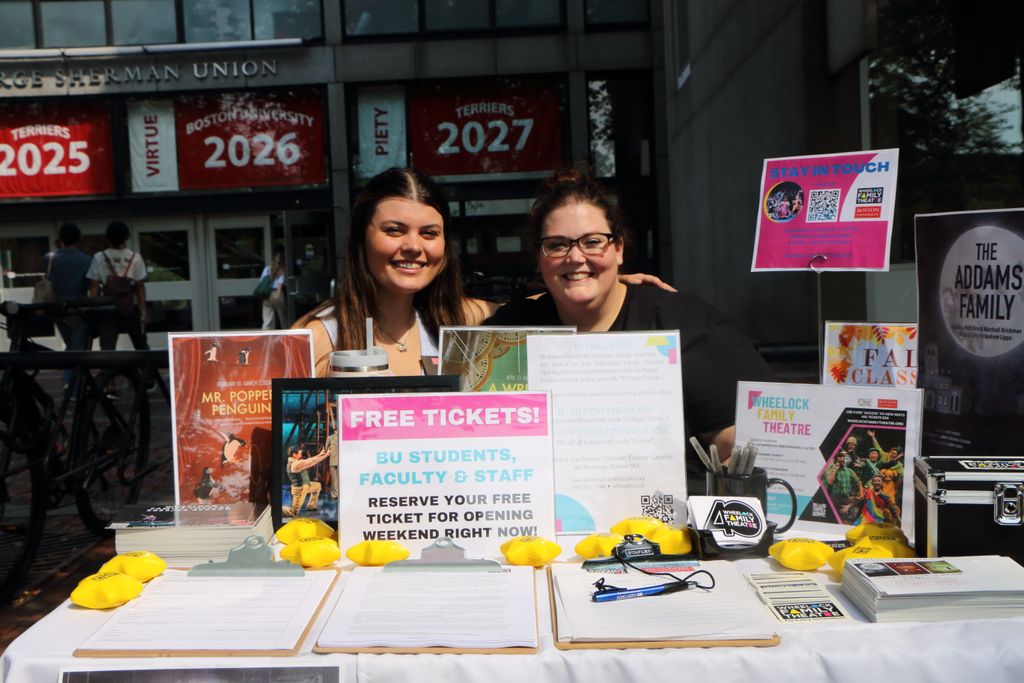
2023 BU Fall Arts Fair. Photo by Emily Wang (COM’26)
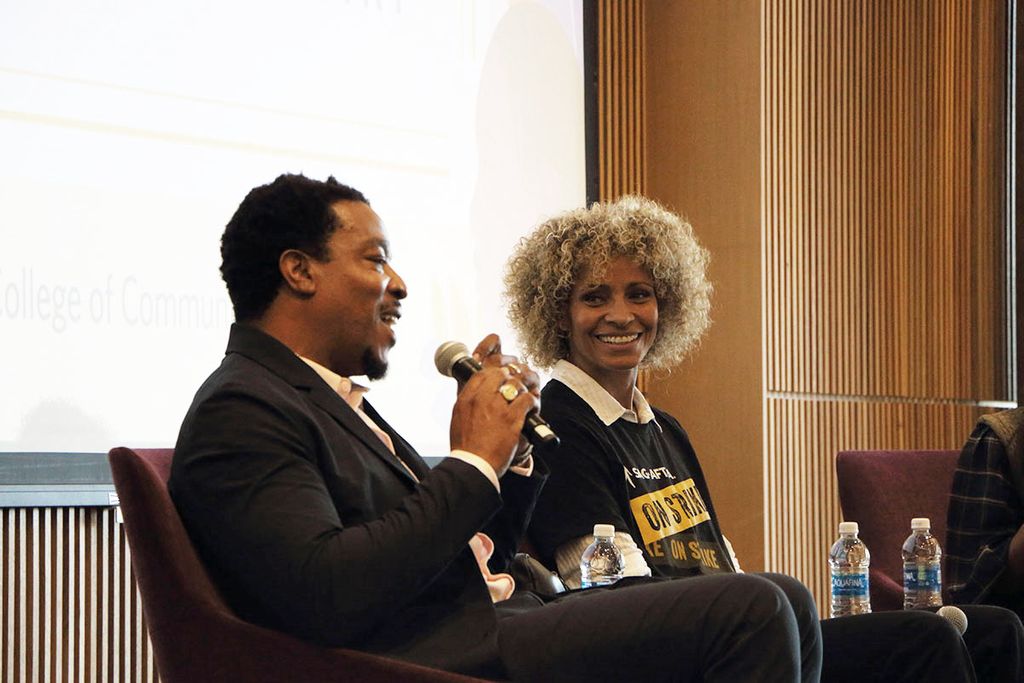
Actors Russell Hornsby (CFA’96) and Michelle Hurd (CFA’88) speaking at BU College of Communication’s symposium, Black Media: Reflecting on the Past and Reimagining the Future. Photo by Emily Wang (COM’26)
BU School of Theatre’s 2023-2024 season kicked off with the movement-based show, i love you and i always will or charlie’s play , which ran at BU’s Joan & Edgar Booth Theatre on September 9 and 10, 2023. BFA Theatre Arts performance alum Tommy Vines (CFA’24) was the show’s producer, director, playwright, and lead actor!
That same week, BU hosted its annual BU Fall Arts Fair, where students are invited to explore all the arts that BU and Boston offer through conversations with members from BU Arts Initiative, BU arts programs, academic units, and selected Boston area arts organizations.
Later in the month, during BU’s Alumni Weekend, actors and Terrier proud alums Russell Hornsby (CFA’96) and Michelle Hurd (CFA’88) returned to BU for the College of Communication’s symposium Black Media: Reflecting on the Past and Reimagining the Future .

2023 CFA Distinguished Alumni Awards. Photo by Doug Levy

On Thursday, September 21, the CFA community – students, alumni, friends, faculty, and staff – came together to celebrate and honor three inspiring BU alums: multifaceted artist Joseph Pereira (CFA’96), artist and educator Adrienne Elise Tarver (CFA’07), and playwright and director Chay Yew (COM’92).
watch the alumni awards highlights
BU’s annual Fringe Festival also kicked off around this time! The decades-long collaboration between BU School of Theatre and BU School of Music: Opera Institute expands to uplift new and unique works in music and visual arts in addition to producing new and rarely performed works of opera and theatre. Spurred by the dynamic and diverse programs within CFA, the 27th annual Fringe featured additional programming from BU School of Visual Arts and School of Music.

Alice Tierney, a co-production of BU Opera Institute and School of Theatre. Photo by Jacob Chang-Rascle

Marcus; or the Secret of Sweet, presented by BU School of Theatre. Photo by Rodrigo Larios

Hydrogen Jukebox, a co-production of BU Opera Institute and School of Theatre. Photo by Jacob Chang-Rascle

The cast of Priscilla, a next stage workshop, by Edward Sturm (CFA’24)

The Gutter, presented by BU School of Visual Arts and its MFA Visual Narrative Class of 2024. Photo by Wenbin Huang (CFA’25)
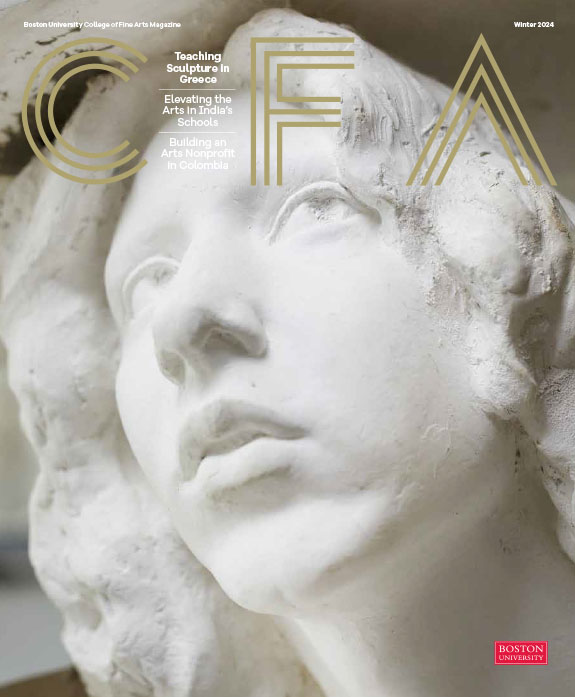
CFA magazine winter 2024 issue comes out!
The 2024 winter issue of CFA magazine features BU alums making instrumental impacts across fields from art to education to healthcare, in all corners of the world! They’re community organizers, arts leaders, education advocates, playwrights, painters, singers, podcasters, filmmakers, and revolutionaries.
read this issue
From October 3rd through December 9, the expansive traveling exhibition, An Adventure in the Arts , arrived at BU Art Galleries’ Faye G., Jo, and James Stone Gallery. The exhibition provided a crash course in 20th-century art history, featuring works by the most influential artists of that century, including Childe Hassam , Andy Warhol , Willem and Elaine de Kooning , Jasper Johns , and Jackson Pollock .

An Adventure in the Arts. Photo by Emily Wang (COM’26)

And across Commonwealth Avenue at 808 Gallery, the 75th annual Boston Printmakers 2023 North American Print Biennial returned to BU. The highly anticipated juried exhibition of artists living and working in North America showcased artwork ranging from traditional print processes and digital media to work in more expansive, interdisciplinary approaches.

The Boston Printmakers 2023 North American Print Biennial. Photo by Wenbin Huang

Spooky season took over Wheelock Family Theatre (WFT) with the musical production of America’s favorite kooky, spooky clan, The Addams Family . The show, which ran from October 13 through November 19, opened WFT’s 2023-2024 season.

The Addams Family: Gomez Addams (Luis Negron) (from (left), Morticia Addams (Aimee Doherty), Pugsley Addams (Jack Baumrind), Lurch (Sam David Cohen), Grandma (Jane Staab), Wednesday Addams (Emilia Tagliani), and Lucas Beinecke (Timothy Bevens). Photo by Jake Belcher
Throughout the semester, solo and group exhibitions were on view at Gallery 5, which offers undergraduate students within the BU School of Visual Arts an exhibition space to conceptualize, propose, plan, and install professional-quality exhibitions. Pictured below is the Senior Graphic Design Show, Sight of Sound , a collaborative exhibition featuring Risograph prints and animations inspired by the world of sound and music.

Gallery 5 Senior Graphic Design Show, “Sight of Sound.” Photo by Wenbin Huang

The biannual ART@Sloane exhibition showcased work from School of Visual Arts students. During the 2023-2024 year, the work resided in the Metcalf Trustee Center’s Portrait Gallery, located on the 9 th floor at One Silber Way.

Fall 2023 ART@Sloane exhibition

It’s a full house at CFA’s Concert Hall! A hive of activity for gatherings, recitals, masterclasses, and concerts such as the Symphonic Chorus & All-Campus Orchestra Concert conducted by Dr. Daniel Parsley , assistant professor in choral conducting and director of choral activities at BU.

Symphonic Chorus & All-Campus Orchestra Concert

To close out the fall 2023 semester at CFA, BU School of Theatre presented Orlando , based on the Virginia Woolf novel, at the Joan & Edgar Booth Theatre from December 2-9.
Sarah Ruhl’s play follows the story of a young nobleman in a love affair with Queen Elizabeth I. As he endeavors to make his way as a poet and lover, Orlando’s escapades keep him at the heart of a maximalist, over-the-top tale where gender and gender preferences shift regularly, usually with hilarious results. The BU School of Theatre production was helmed by director Vanessa Ogbuehi , a Philadelphia-based theatre director, performer, and producer of new and devised work.

BU School of Theatre’s production of Orlando. Photo by Katie Nelson

SPRING 2024
A thriving arts scene at cfa (and beyond) .
CFA kicked off the new year with two unique and thought-provoking exhibitions. Painting& , which was on view from January 18 – March 8 at Faye G., Jo, and James Stone Gallery, featured four artists – Cicely Carew , Chanel Thervil , Kate Holcomb Hale , and Soyoung L. Kim – interrogating the definition of painting. Organized by guest curator Mallory A. Ruymann in collaboration with the BU Art Galleries team, the exhibition highlighted the ways in which painting has transformed into an expansive expression incorporating a variety of mediums and techniques.

Painting& exhibition. Photo by Emily Wang (COM’26)

And at 808 Gallery, BU Arts Initiative in partnership with BU Art Galleries, presented the special exhibition, Natural Wanderment: Stewardship. Sovereignty. Sacredness . , part of the expansive Project 562 : Changing the Way We See Native America.

Natural Wanderment exhibition. Photo by Tom Tranfaglia
Created by acclaimed visual artist and social documentarian Matika Wilbur , who is from the Tulalip & Swinomish Tribes, Project 562 is a bold creative expedition to collaborate with each of the 562-plus sovereign Native American nations in the United States in their own territories for superb photographic portraits and compelling narratives of contemporary Native American identity.

At the end of January, BU School of Music returned to New York City’s renowned Carnegie Hall for a special recital featuring a select group of talented graduate music students. The 2024 BU Spotlight concert at the Weill Recital Hall at Carnegie Hall featured competition winners Andrew Bearden Brown (CFA’24), Sheng Chan (CFA’25), An-Chi Lin (CFA’25), Yuyeon Lee (CFA’27), Valentina Pulido Pardo (CFA’24), Richard Rivale (CFA’26), and Zhen Wang (CFA’27).

2024 BU Spotlight Concert at Carnegie Hall. Photo by Craig Williston

The weekend of February 29 through March 3 was a busy one for BU School of Theatre with two main productions playing! At Booth Theatre, Cendrillon , a co-production of BU Opera Institute and School of Theatre, told the well-known fairy tale about a young girl wronged and her ultimate redemption through her discovery of true love. Jules Massenet’s ethereal music carries the audience into a dreamlike world of enchantment.

Cendrillon. Photo by Jacob Chang-Rascle

The immersive theatrical experience, One Penny Down , written by BU School of Theatre director and associate professor of playwriting, Kirsten Greenidge , was performed at Studios on 3. When Summer is gifted a copy of Anna Karenina for her first Mother’s Day, the little details of her own life begin to add up in ways she hadn’t quite thought of before. When the family makes a seemingly ordinary trip to their mall’s old-school department store, Summer’s world is changed forever.

One Penny Down. Photo by Katie Nelson

Major congratulations to vocal performance undergraduate students Mirah Johnston (CFA’24) and Stella FitzGerald (CFA’24, BUTI’18) who were honored with the 2023 Dimmock Vocal Award ! The Ellalou Dimmock Memorial Award is presented to students who demonstrate excellence in vocal performance throughout their undergraduate studies. The CFA community celebrated the winners at a special CFA Concert Hall recital and reception in February. The vocalists performed with Douglas Sumi , Lecturer in Music, Vocal Repertoire and Coaching collaborating on piano.

Douglas Sumi and Stella FitzGerald perform at the CFA Concert Hall. Photo by Emily Wang (COM’26)

Douglas Sumi and Mirah Johnston perform at the CFA Concert Hall. Photo by Emily Wang (COM’26)
This year, vocal performance students took the stage… not just at CFA, but globally at The Popayán International Music Festival in Popayan, Colombia! Grace Christensen (CFA’24) and Mirah Johnston (CFA’24) performed alongside Assistant Professor of Music, Voice David Guzman . The festival began in 1964 and in its long history has provided more than 4,000 artists, including soloists, chamber ensembles, orchestras, and choirs from 36 countries to perform in the capital of Cauca.

The Popayán International Music Festival. Photo by Michael Rotiroti

Popayán, Colombia. Photo by Michael Rotiroti

Back at CFA, BU School of Visual Arts was thrilled to have Multiple Formats: Contemporary Art Book Symposium and Art Book Fair return to BU! Organized by Christopher Sleboda , Associate Professor of Art, Graphic Design, and the BU Graphic Design MFA and BFA programs , Multiple Formats: Contemporary Art Book Symposium and Book Fair weaves together conversations about artist books and higher education, pedagogical practices involving artist books, artist advocacy, and artist book distribution, collection, and access. The event spanned three action-packed days, beginning with a keynote lecture by Ashley James , Associate Curator of Contemporary Art at the Guggenheim Museum. It was followed by a full day of workshops, talks, and programs, and it ended on a Saturday with more than 125 exhibitors showcasing their work and creative practices to the BU community and Greater Boston Area friends and neighbors.

Multiple Formats Art Book Fair. Photo by Emily Wang (COM’26)

Our friends at Wheelock Family Theatre put on two family fun productions over the spring. Adorable penguins took up residence on WFT’s stage with the beloved children’s classic, Mr. Popper’s Penguins . The play is about a struggling house painter in Minnesota who dreams of adventures to far-off lands. His life changes when he is gifted a live penguin, Captain Cook, by an Arctic explorer he’s befriended.
Later in the season, the theatrical adaptation of Madeleine L’Engle’s classic young adult (YA) fantasy novel, A Wrinkle in Time , was performed at WFT. The story, which pits 13-year-old Meg Murray against evil forces that have kidnapped her father to a distant planet, transformed YA fiction and was one of the first books for young readers featuring a female heroine in a science fantasy setting, and its themes of magic, divinity, faith, and the battle between good and evil.

Michael Jennings Mahoney and Kristian Espiritu star as Mr. and Mrs. Popper in Wheelock Family Theatre’s production of Mr. Popper’s Penguins, based on the novel by Richard and Florence Atwater. Photo by Jake Belcher

Eviva Rose (left) as Charles Wallace Murry, Beza Mekonnen as Meg Murry, and Miles Allen as Meg’s friend Calvin in a scene from Wheelock Family Theatre’s production of A Wrinkle In Time. Photo by Jake Belcher
Big news was announced this year with CFA appointing new directors for the Schools of Theatre, Music, and Visual Arts! A playwright, a painter, and the founding cellist of a world-renowned string quartet became the new leaders of the three schools within CFA on July 1.
Award-winning playwright Kirsten Greenidge , associate professor of playwriting and theatre arts, became the director of the School of Theatre. Marc Schepens (CFA’12), senior lecturer in art, painting, began a two-year term as interim director of the School of Visual Arts. And Michael Reynolds , professor of music, cello, and the Muir String Quartet cellist since 1979, now leads the School of Music.
read the announcement
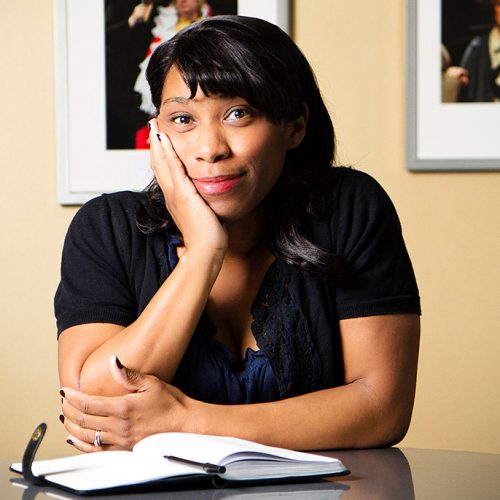
Kirsten Greenidge

Marc Schepens

Michael Reynolds
Now we’re heading towards the middle-end of the spring semester at CFA which is an exciting time – celebrating soon-to-be-grads before Commencent season begins through thesis exhibitions, senior recitals, showcases, and more.
Up first, BU School of Visual Arts presented the 2024 MFA Thesis exhibitions from April 2-20, highlighting the work of 61 graduating MFA students – the largest cohort to date – in Graphic Design, Painting, Print Media & Photography, Sculpture, and Visual Narrative programs.

MFA Graphic Design Thesis Exhibition at 808 Gallery. Photo by Wenbin Huang

MFA Visual Narrative Thesis Exhibition at Commonwealth Gallery. Photo by Wenbin Huang

MFA Painting Thesis Exhibition at Stone Gallery. Photo by Wenbin Huang

MFA Print Media & Photography Thesis Exhibition at 808 Gallery. Photo by Wenbin Huang
This was the first thesis exhibition for the Print Media & Photography and Visual Narrative programs since their launch in 2022. Also new this year was the sculpture thesis being a satellite show off-campus, on view at an empty space that was once a drugstore and pharmacy in the neighborhood of Allston.

MFA Sculpture Thesis Exhibition at former drugstore/pharmacy in Allston. Photo by Wenbin Huang
Alongside the MFA Thesis Exhibitions, the MA Art Education students install artwork created by their K-12 students from Boston-area schools, transforming Gallery 5 into a colorful and joyful showcase.

2024 MA Art Education Thesis Exhibition. Photo by Wenbin Huang

The spring 2024 opera, La clemenza di Tito , a co-production of BU Opera Institute and School of Theatre, was performed at BU’s Tsai Performance Center from April 18-21. Mozart’s penultimate opera, La clemenza di Tito (The Clemency of Titus) is driven by paranoia and manipulation which culminates in a conflicted ruler’s struggle to discover the greater power of mercy over revenge.

La clemenza di Tito. Photo by Jacob Chang-Rascle

Another celebratory, community event CFA enjoys each year is the annual Kahn Career Entry Awards , which celebrates outstanding graduating CFA-ers and helps launch their artistic careers.
The 2024 Kahn Awards recipients were James Gold (CFA’24) , Spencer Hart-Thompson (CFA’24) , Kimly Mengyin Wang (CFA’24) , Madeline Riddick-Seals (CFA’24) , Emily Rice (CFA’24) , and Tommy Vines (CFA’24). Madeline was the grand prize winner and plans to use the award to delve deep into Bennett Side, a historically Black working-class neighborhood in Enterprise, through oral history and design.

From left: Emily Rice (CFA’24), Tommy Vines (CFA’24), Madeline Riddick-Seals (CFA’24), Spencer Hart-Thompson (CFA’24), Kimly Mengyin Wang (CFA’24), and James Gold (CFA’24). Photo by Emily Wang (COM’26)
Sold-out show! BU School of Theatre’s production of Stephen Sondheim’s Pulitzer-winning musical, Sunday in the Park with George , ran from April 25-28 at BU’s Joan & Edgar Booth Theatre. Inspired by the painting A Sunday Afternoon on the Island of La Grande Jatte by Georges Seurat, Sunday in the Park with George , Stephen Sondheim and James Lapine’s stunning masterpiece, merges past and present into beautiful, poignant truths about life, love, and the creation of art.
Show director Clay Hopper (CFA’05), Senior Lecturer, Directing, adds, “In an atomized world, where our connections to each other can be so mediated that we lose sight of why we’re connecting in the first place, this play is a bright sunbeam, a ray hope of hope that our capacity to perceive beauty in all things — and to make that beauty — is our strongest connection of all.”

Sunday in the Park with George. Photo by Katie Nelson

Boston University Symphony Orchestra and Symphonic Chorus returned to Boston’s historic Symphony Hall on Saturday, April 27! An annual tradition where BU students get to perform on the same stage as the Boston Symphony Orchestra, the 2024 BU concert showcased performances by the BU Symphony Orchestra conducted by James Burton, former Director of Orchestral Activities and Master Lecturer, Music, and the BU Symphonic Chorus led by Daniel Parsley, Director of Choral Activities and Assistant Professor in Choral Conducting.

2024 BU Symphony Hall Concert. Photo by Jake Belcher

Now entering May, CFA and the BU community came together to celebrate the graduating BU School of Theatre Class of 2024 at the annual Theatre Showcase ! Serving as a celebration and the group’s formal introduction to the professional theatre community, students showcased their work at a Boston Showcase and a week later in New York City.
meet the theatre class of 2024

Boston Design, Production, and Management Showcase at Booth Theatre. Photo by Katie Nelson

Performance students from the graduating theatre class. Photo by Katie Nelson

The 2024 BFA thesis exhibitions were hosted by BU School of Visual Arts from May 2-11. The shows featured the works of 33 students graduating from BFA programs in painting, sculpture, printmaking, and graphic design.
The BFA Graphic Design Thesis Exhibition, which was on view at 808 Gallery, explored four overarching themes: design for social impact, community-focused design, the portrayal and exploration of social phenomena, and the intersection of technology and graphic design.

2024 BFA Graphic Design Thesis Exhibition. Photo by Wenbin Huang
Curated by Beth Kantrowitz , art consultant and curator, the BFA Painting, Sculpture, and Printmaking Thesis Exhibition titled, In Their Own Words , conveyed students’ feelings through their art. “The depth and creativity evident in the words and artwork of the Painting, Sculpture, and Printmaking class of 2024 struck me profoundly and set the tone for this exhibition,” says Kantrowitz.

2024 BFA Painting, Sculpture, and Printmaking Thesis Exhibition. Photo by Wenbin Huang
Commencement season in full effect! On Saturday, May 18, the CFA Class of 2024 walked across the stage and reflected on their greatest achievements during their time at BU. The 2024 CFA Convocation Speaker was Opera Director David Kneuss (CFA’70), who recently completed his tenure at the Metropolitan Opera where he served as Executive Stage Director for 25 years.
The Convocation Student Speaker, BFA Theatre Arts student Edward Sturm (CFA’24), spoke to the graduating class and said, “As we leave Boston University, I hope that you don’t forget to marvel at what we’ve accomplished. I hope you take a real sense of gratitude, along with the deep connections, the fond memories, and the rich artistry I know you have. The world is waiting for you.”

David Kneuss (CFA’70) addressing the CFA Class of 2024. Photo by Hannah Osofsky
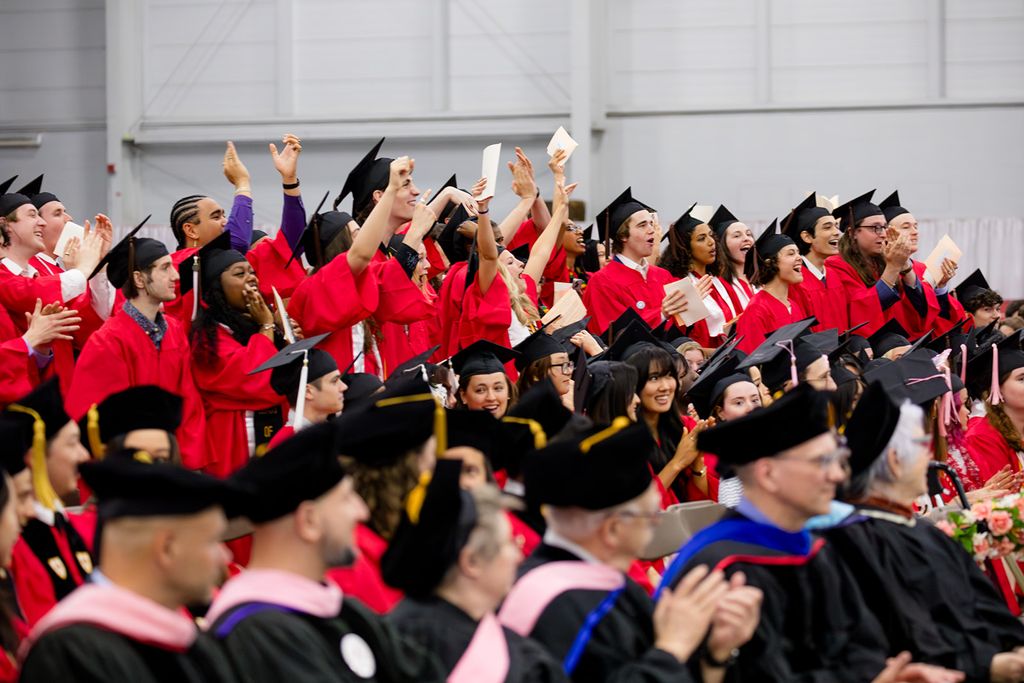
2024 CFA Convocation. Photo by Hannah Osofsky

Theatre arts major Edward Sturm (CFA’24) addressing the CFA Class of 2024. Photo by Hannah Osofsky
SUMMER 2024
At home at bu.
Summer at CFA can seem a bit more quiet compared to the rest of the academic year, but that doesn’t mean things aren’t happening! BU Art Galleries proudly presents two exhibitions.
Currently on view: A Summer Place at BU’s Faye G., Jo, and James Stone Gallery brings summer and cozy feelings of home through the paintings of Breehan James , assistant professor of art, painting, and Nancy Wissemann-Widrig , whose award-winning artistic career spans decades. “A Summer Place is an archive of everyday things and a window to nature’s close embrace,” says show curator Emily Lanctot , who selected an array of works created by the artists at their rustic summer homes.

Nancy Wissemann-Widrig (left) and Breehan James at the exhibition, A Summer Place. Photo by Jake Belcher

Patrons at BU’s Faye G., Jo, and James Stone Gallery to see the exhibition, A Summer Place. Photo by Jake Belcher

A Summer Place. Photo by Tom Tranfaglia
And for those walking along Commonwealth Avenue, works by artist Matt Murphy can be seen at the 808 Gallery windows. In Quarrel , Murphy plays with an interchange between sculpture and painting, striving to disrupt the illusion of painting by inserting the wall in between elements, allowing viewers to see the artwork as a physical object before immersing themselves in the painted illusion.

Quarrel at 808 Gallery windows. Photo by Tom Tranfaglia

Summertime is also when a lot of CFA-ers do work beyond the classroom . From internships and arts administrative roles to theatre summer stock and workshopping new material, read up on what CFA students are working on outside of CFA.
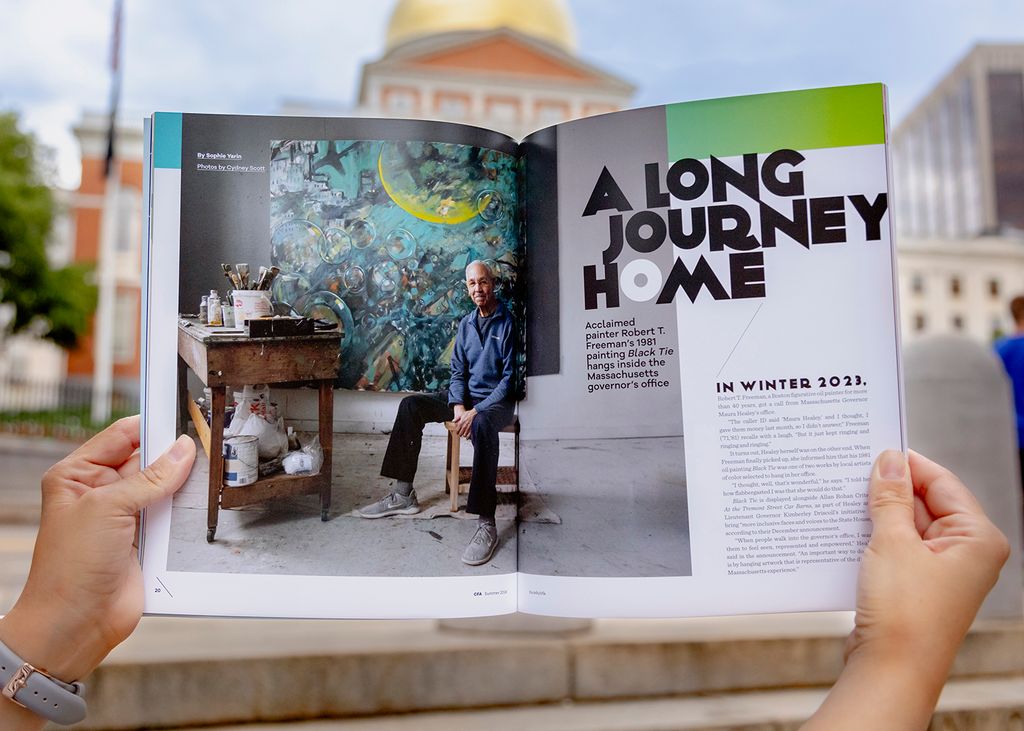
Summer at CFA means a new magazine issue!
The summer issue of CFA magazine features a very Boston cover story. Meet Massachusetts artist Robert T. Freeman (CFA’71,’81), whose painting “Black Tie” hangs inside the Massachusetts governor’s office. This latest issue highlights BU alums making impacts across all fields. They’re innovating in virtual reality, narrating audiobooks, organizing youth orchestras, costume designing for Cirque du Soleil, and even curating games for The New York Times (we’re talking Wordle and Connections).
read the latest issue
We hope you enjoyed revisiting some of our favorite CFA moments from this past year just like we did! Stay in the know of upcoming CFA events, our theatre production season, art exhibitions, concerts, and social gatherings by following us on social ( Facebook , Instagram , X ) and explore CFA News and our Calendar of Events !
- Share this story
Share this:
- Share on Facebook (Opens in new window)
- Click to email this to a friend (Opens in new window)
- Click to share on Twitter (Opens in new window)
- Share full article
Advertisement
Supported by
wordplay, the crossword column
Complete Reversals
Shaun Phillips makes his New York Times Crossword debut.

By Sam Corbin
Jump to: Today’s Theme | Tricky Clues
WEDNESDAY PUZZLE — Some solvers may refer to the arcade game hiding in the theme of today’s crossword, constructed by Shaun Phillips, with words from another recent puzzle’s theme : “What a racket!” If you are one of those people, I share your skepticism. The game is almost certainly rigged against us.
But for the purpose of solving Mr. Phillips’s crossword — his first for The New York Times — I recommend leaving your suspicions at the door. I can assure you that this grid is every bit as delightful as it presents itself to be, and that solving it is within your grasp.
Today’s Theme
You’ve heard of the long arm of the law. How about the long arm of the crossword? That’s what you’ll find in this puzzle, if you look closely: the arm of a CLAW MACHINE GAME (35A), reaching from the top of the grid to grasp a little cluster of black squares below it. A synonym for [“Wait!”] is HOLD ON A MINUTE (5D), a hopeful directive to the claw as it grasps a prize, maybe for long enough to reach the deposit slot. Oh, and as for a [Professional who might expect to do well with a 35-Across?], that would be a CRANE OPERATOR (10D).
I can proudly state that I have won prizes from at least two CLAW MACHINE GAMEs. Granted, I have lost countless more to their pits, but I choose to focus on the claw - sitive. And is the [Setting for a 35-Across] really called an AMUSEMENT ARCADE (54A)? That seems redundant. But maybe there are plenty of serious arcades where business is conducted. “Step into my claw - ffice,” and so on.
Tricky Clues
8A. [Some experts on viruses] of a computer nature are TECHIES — not to be confused with experts on a certain sci-fi series, known as Trekkies.
We are having trouble retrieving the article content.
Please enable JavaScript in your browser settings.
Thank you for your patience while we verify access. If you are in Reader mode please exit and log into your Times account, or subscribe for all of The Times.
Thank you for your patience while we verify access.
Already a subscriber? Log in .
Want all of The Times? Subscribe .

IMAGES
VIDEO
COMMENTS
Avoid transition words that don't add anything to the sentence and unnecessary wordiness that detracts from your argument. Furthermore, use the active voice instead of the passive whenever possible (e.g., "this study found" instead of "it was found by this study"). This will make your essay's tone clear and direct. 3.
Course description. Writing reports and assignments can be a daunting prospect. Learn how to interpret questions and how to plan, structure and write your assignment or report. This free course, Essay and report writing skills, is designed to help you develop the skills you need to write effectively for academic purposes.
A PDF providing further guidance on writing science essays for tutorials is available to download.. Short videos to support your essay writing skills. There are many other resources at Oxford that can help support your essay writing skills and if you are short on time, the Oxford Study Skills Centre has produced a number of short (2-minute) videos covering different aspects of essay writing ...
Academic Writing "Writing" is usually understood as the expression of thought. This book ... There are models for different ways to organize an essay and tips to make sentences snap with style. Emphasis is placed on developing ... one of the foundational skills in life. Our world is full of things that need to
Academic Writing Examples. Research Paper - In-depth study presenting original research and analysis. Essay - A structured argument on a specific topic is essential in an analytical essay. This type of essay requires presenting a clear thesis and supporting it with well-organized evidence and analysis. Dissertation - Extensive research ...
Academic writing is a formal style of writing used in universities and scholarly publications. You'll encounter it in journal articles and books on academic topics, and you'll be expected to write your essays, research papers, and dissertation in academic style. Academic writing follows the same writing process as other types of texts, but ...
2. Define your argument. As you plan and prepare to write the essay, you must consider what your argument is going to be. This means taking an informed position or point of view on the topic presented in the question, then defining and presenting a specific argument. Consider these two argument statements:
Here are 12 academic skills and how they can help you in your future career: 1. Time management. Time management is the ability to organize and schedule your time efficiently. In school, you might've used these skills to study more effectively or devote sufficient time to working on several assignments.
An essay is a type of assignment in which you present your point of view on a single topic through the analysis and discussion of academic sources. Usually, an essay has the format of an introduction, body paragraphs and a conclusion. Critical analysis is essential to essay writing. One way you can demonstrate this is by summarising and ...
Academic writing skills are the traits taught while writing essays for college or university that can be useful in the workplace. Academic writing involves communicating ideas clearly and concisely and conveying arguments in a logical and convincing manner. The skills used in this kind of writing are transferable to a range of workplace tasks ...
Tips for Crafting an A+ Essay. 1. Understand the Assignment: Before you start writing, make sure you fully understand the assignment guidelines and requirements. If you have any doubts, clarify them with your instructor. 2. Conduct Thorough Research: Gather relevant sources and information to support your arguments.
Excellent grammar and spelling skills. Proofreaders need to dot every "i" and cross every "t." Good proofreaders should correct spelling, punctuation, capitalization, and grammar. ... For another thing, if your academic record doesn't match the essay's quality, the admissions officer will start thinking your whole application is riddled with lies.
Chapter 1. Although the definition of what an essay is can be broad and include both formal and informal styles of writing, in academia an essay is most commonly considered to be a relatively short piece of non-fiction writing explaining the writer's perspective on a topic or argument. In academic writing, this perspective will almost always ...
Academic Essay Skills. What do you feel skilled at in academic writing? What skills do you want to improve? Use this checklist to find one or two skills you want to work on this semester. Use A&L's other handouts and work with a tutor to clarify concepts and help you make progress.
Academic Skills Examples. 1. Communication Skills: You will be required to communicate in writing as well as orally (and possibly many other ways) in nearly every course you take. Your skill in succinctly communicating what you have learned will be a central way your knowledge will be assessed throughout your studies. 2.
Our Academic Skills team can help you to develop the academic and professional skills you need throughout your time at university and beyond. ... Essay writing 101 The essay is perhaps the most common form of academic writing at the university. Learn about essay structure, paragraphing and features of essays with sample texts for analysis to ...
Clear Purpose: An academic essay is written with a clear purpose, often to argue a point, present an analysis, or discuss a research finding. The purpose guides the structure and content of the essay. Structured Format: It follows a structured format with an introduction, body paragraphs, and a conclusion.
For most nurses who struggle with academic skills, it is usually not their innate academic ability that is the problem, but the lack of specific skills required to research the question and then communicate valid findings in a reliable way. For student nurses, this is about understanding where the body of nursing knowledge lies, be that the literature, protocols or clinical practice, how to ...
It encompasses a range of skills necessary for writing, reading, speaking and understanding complex and formal content. Unlike conversational English, which is often informal and colloquial, Academic English is characterized by a formal tone, precise vocabulary, and structured formats. ... Academic essays follow a specific format, including an ...
Exams. Preparing for exams and end-of-unit assessments. Exam confidence. Relaxation techniques. Book an appointment with a language and learning adviser; or First Nations students can book with the First Nations academic support links. Use these academic skills guides to help you develop your academic and study skills.
Shortcut to writing skills. Relying on an AI paraphrasing tool deprives students of the opportunity to develop their writing skills authentically. Instead of engaging in critical thinking and original expression, students may resort to automated solutions, hindering their intellectual growth and academic development.
*adapted from an essay by Larry Leemis, Professor of Mathematics. Oral Presentations. Amazing as it may seem, many Americans appear to consider public speaking a fate worse than death. Fear is a natural human reaction to situations involving public speaking - EVERYONE has it.
The academic skill of a student is impacted by many different components: the acquired skills and experiences of the teacher, the development of new teaching techniques and reference materials, as well as the adaptive tools being used by the administration. These factors, in most cases, advance student achievement and encourage them to become ...
M00517710. ECH 1200 Study Skills Summative Essay. The aim of this essay is to give the reader an overview of the types of academic study skills that I develop for the course of Foundation degree in early childhood studies. In it I will discuss my personal approach to study and the strategies I need to use on the program.
New students in the Department of Agronomy and Horticulture are required to complete PLAS 95 Plant and Landscape Systems Seminar. Course is designed to help students discover career opportunities, improve academic success skills, identify co-curricular activities and select appropriate internships.
MONTGOMERY COUNTY, Md. (7News) — Navika Duvey is a rising seventh grader who is expanding her understanding of coding at summer camp. "Problem-solving, those skills you learn in math is also in ...
Summary. While generative AI tools have been heralded as the future of education, more than 40 years of academic research suggests that it could also harm learning in realms from online tutoring ...
Visual Arts Highlights of CFA's 2023-2024 Academic Year, a Photo Essay From captivating and vibrant exhibitions, concerts, and performances both on campus and at renowned venues to impactful conversations and events with our students, alums, and artists around the country, CFA's 2023-2024 year is one for the books!
3D. Unlike other sports, international soccer seems to require an unreasonable amount of acronym memorization. The [Soccer org. that runs the Champion League], for example, is UEFA (short for the ...